Craftsman 315269280 User Manual HAMMER DRILL Manuals And Guides L0212182
CRAFTSMAN Drill Hammer Manual L0212182 CRAFTSMAN Drill Hammer Owner's Manual, CRAFTSMAN Drill Hammer installation guides
User Manual: Craftsman 315269280 315269280 CRAFTSMAN HAMMER DRILL - Manuals and Guides View the owners manual for your CRAFTSMAN HAMMER DRILL #315269280. Home:Tool Parts:Craftsman Parts:Craftsman HAMMER DRILL Manual
Open the PDF directly: View PDF ![]() .
.
Page Count: 44

Operator'sManual
IPR 0 FESSl O NAL i
1/2 in., PROFESSIONAL
CORDLESS HAMMER DRILL
Variable Speed /Reversible
Model Nos.
315.269280
18 Volt
315.269290
24 Volt
Save this manual for
future reference
CAUTION: Read and
follow all Safety Rules and
Operating Instructions before
first use of this product.
Customer Help Line: 1-800-932-3188
•Safety
•Features
•Assembly
•Operation
•Maintenance
•Parts List
Sears, Roebuck and Co., 3333 Beverly Rd., Hoffman Estates, IL 60179 USA
Visit the Craftsman web page: www.sears.com/craftsman
972000-968
2-02
0( °s

• Table Of Contents .......................................................................................................................................................... 2
• Warranty ......................................................................................................................................................................... 2
• Introduction ..................................................................................................................................................................... 3
• General Safety Rules, Specific Safety Rules, And Symbols ..................................................................................... 3-6
• Product Specifications .................................................................................................................................................... 7
• Features ..................................................................................................................................................................... 7-9
• Assembly ................................................................................................................................................................ 10-11
• Operation ................................................................................................................................................................ 12-17
• Maintenance ................................................................................................................................................................. 18
• Accessories .................................................................................................................................................................. 18
• Exploded View And Repair Parts List .................................................................................................................... 20-21
• Parts Ordering /Service ............................................................................................................................................... 22
FULL ONE YEAR WARRANTY ON CRAFTSMAN PROFESSIONAL CORDLESS HAMMER DRILL
If this rRRFTSHRN Professional Cordless Hammer Drill fails due to a defect in material or workmanship within one year
from the date of purchase, Sears will repair it, free of charge.
WARRANTY SERVICE IS AVAILABLE BY SIMPLY RETURNING THE TOOL TO THE NEAREST SEARS STORE OR
SEARS SERVICE CENTER IN THE UNITED STATES.
This warranty gives you specific legal rights, and you may also have other rights which vary from state to state.
Sears, Roebuck and Co., Dept. 817 WA, Hoffman Estates, IL 60179
_b, Look for this symbol to point out important safety precautions. It means attention!!! Your safety is
involved.
_WARNING:
The operation of any power tool _an result in foreign objects being thrown into your eyes, which can
result in severe eye damage. Before beginning power tool operation, always wear safety goggles or
safety glasses with side shields and a full face shield when needed. We recommend Wide Vision
Safety Mask for use over eyeglasses or standard safety glasses with side shields, available at Sears
Retail Stores. Always wear eye protection which is marked to comply with ANSI Z87.1.
SAFETY AND INTERNATIONAL SYMBOLS
This operator's manual describes safety and international symbols and pictographs that may appear on this product.
Read the operator's manual for complete safety, assembly, operating and maintenance, and repair information.
MEANING
Do not expose to rain or use in damp locations.
2

Your hammer drill has many features for making your
drilling operations more pleasant and enjoyable. Safety,
performance and dependability have been given top
priority in the design of this hammer drill making it easy to
maintain and operate.
_k CAUTION: Carefully read through this entire
operator's manual before using your new hammer
drill. Pay close attention to the General Safety Rules,
Specific Safety Rules and Symbols, Warnings and
Cautions. If you use your hammer drill properly and
only for it'sintended use, you will enjoy years of safe,
reliable service.
_I=WARNING: Read and understand all instructions.
Failure to follow all instructions listed below, may
result in electric shock, fire and/or serious personal
injury.
SAVE THESE INSTRUCTIONS
Work Area
• Keep your work area clean and well lit. Cluttered
benches and dark areas invite accidents.
•Do not operate power tools in explosive atmo-
spheres, such as in the presence of flammable
liquids, gases, or dust. Power tools create sparks
which may ignite the dust or fumes.
•Keep bystanders, children, and visitors away while
operating a power tool. Distractions can cause you
to lose control.
Electrical Safety
Do not abuse the cord. Never use the cord to carry
the charger. Keep cord away from heat, oil, sharp
edges, or moving parts. Replace damaged cords
immediately. Damaged cords may create afire.
A battery operated tool with integral batteries or a
separate battery pack must be recharged only with
the specified charger for the battery. Acharger that
may be suitable for one type of battery may create a
risk of fire when used with another battery. Use battery
only with charger listed.
MODEL BA'rFERY PACK CHARGING
315.269280 ITEM NO. 9 11034 ITEM NO. 9 11040
(981404-001 ) (981399-001 )
315.269290 ITEM NO. 9 11035 ITEM NO. 9 11040
(981405-001 ) (981399-001)
Use battery operated tool only with specifically
designated battery pack. Use of any other batteries
may create a risk of fire. Use only with battery pack
listed.
Personal Safety
•Stay alert, watch what you are doing and use
common sense when operating a power tool. Do
not use tool while tired or under the influence of
drugs, alcohol, or medication. A moment of inatten-
tion while operating power tools may result in serious
personal injury.
•Dress properly. Do not wear loose clothing or
jewelry. Contain long hair. Keep your hair, clothing,
and gloves away from moving parts. Loose clothes,
jewelry, or long hair can be caught in moving parts.
•Avoid accidental starting. Be sure switch is in the
locked or off position before Inserting battery
pack. Carrying tools with your finger on the switch or
inserting the battery pack into a tool with the switch on,
invites accidents.
Remove adjusting keys or wrenches before turn-
ing the tool on. Awrench or akey that is left attached
to a rotating part of the tool may result in personal
injury.
•Do not overreach. Keep proper footing and bal-
ance at all times. Proper footing and balance enables
better control of the tool in unexpected situations. Do
not use on a ladder or unstable support.
•Use safety equipment. Always wear eye protection.
Dust mask, nonskid safety shoes, hard hat, or hearing
protection must be used for appropriate conditions.

Tool Use and Care
•Use clamps or other practical way to secure and
support the workplece to a stable platform. Holding
the work by hand or against your body is unstable and
may lead to loss of control.
•Do not force tool. Use the correct tool for your
application. The correct tool will do the job better and
safer at the rate for which it is designed.
•Do not use tool if switch does not turn it on or off.
A tool that cannot be controlled with the switch is
dangerous and must be repaired.
•Disconnect battery pack from tool or place the switch in
the locked or off position before making any adjust-
reents, changing accessories, or stodng the tool. Such
preventive safety measures reduce risk ofstarting the tool
accidentally.
•Store idle tools out of reach of children and other
untrained persons. Tools are dangerous in the hands
of untrained users.
•When battery pack is not in use, keep it away from
other metal objects like: paper clips, coins, keys,
nails, screws, or other small metal objects that can
make a connection from one terminal to another.
Shorting the battery terminals together may cause
sparks, burns, or afire.
Maintain tools with care. Keep cutting tools sharp
and clean. Properly maintained tools, with sharp
cutting edges are less likely to bind and are easier to
control.
•Check for misalignment or binding of moving parts,
breakage of part's, and any other condition that may
affect the tool's operation. If damaged, have the tool
serviced before using. Many accidents are caused by
poorly maintained tools.
•Use only acceseorles that are recommended by
the manufacturer for your model. Accessories that
may be suitable for one tool, may create a risk of injury
when used on another tool.
Service
•Tool service must be performed only by qualified
repair personnel. Service or maintenance performed
by unqualified personnel could result in a risk of injury.
•When servicing a tool, use only identical replace-
ment parts. Follow instructions in the •aintenance
section of this manual. Use of unauthorized parts or
failure to follow •aintenance Instructions may create a
risk of shock or injury.
Hold tool by insulated gripping surfaces when performing an operation where the cutting tool may contact
hidden wiring. Contact with a "live" wire will make exposed metal parts of the tool "live" and shock the operator.
Additional Rules For Safe Operation
•Know your power tool. Read operator's manual
carefully. Learn its applications and limitations, as
well as the specific potential hazards related to
this tool. Following this rule will reduce the risk of
electric shock, fire, or serious injury.
•Make sure your extension cord is in good condition.
When using an extension cord, ha sure to use one
heavy enough to carry the current your product will
draw. A wire gage size (A.W.G.) of at least 16 is
recommended for an extension cord 100 feet or less
in length. A cord exceeding 100 feet is not recom-
mended. If in doubt, use the next heavier gage. The
smaller the gage number, the heavier the cord. An
undersized cord will cause a drop in line voltage result-
ing in loss of power and overheating.
Important Rules for Battery Tools
•Battery tools do not have to be plugged into an
electrical outlet; therefore, they are always In
operating condition. Be aware of possible hazards
when not using your battery tool or when chang-
ing accessories. Following this rule will reduce the
risk of electric shock, fire, or serious personal injury.
•Do not place battery tools or their batteries near
fire or heat. This will reduce the risk of explosion and
possible injury.
_, WARNING: Batteries vent hydrogen gas and can
explode in the presence of a source of ignition, such
as a pilot light. To reduce the risk of serious personal
injury, never use any cordless product in the pres-
ence of open flame. An exploded battery can propel
debris and chemicals. If exposed, flush with water
immediately.
Do not charge battery tool in a damp or wet
location. Following this rule will reduce the risk of
electric shock.
For best results, your battery tool should be
charged in a location where the temperature is
more than 50°F but less than 1O0°F. Do not store
outside or in vehicles.
Under extreme usage or temperature conditions,
battery leakage may occur. If liquid comes in
contact with your skin, wash immediately with
soap and water, then neutralize with lemon juice
or vinegar, if liquid gets into your eyes, flush them
with clean water for at least 10 minutes, then seek
immediate medical attention. Following this rule will
reduce the risk of serious personal injury.

,_ WARNING: Never use a battery that has been
dropped or received a sharp blow. A damaged battery
is subject to explosion. Properly dispose of a dropped
battery immediately. Failure to heed this warning can
result in serious personal injury.
•Save these instructions. This manual contains
important safety and operating Instructions for
charger. Following this rule will reduce the risk of
electric shock, fire, or serious personal injury.
•Before using battery charger, read all Instructions
and cautionary markings in this manual, on
battery charger, and product using battery
charger. Following this rule will reduce the risk of
electric shock, fire, or serious personal injury.
_L CAUTION: To reduce risk of injury, charge only
nickel-cadmium and nickel metal hydride type
rechargeable batteries. Other types of batteries
may burst causing personal injury and damage.
Following this rule will reduce the risk of electric
shock, fire, or serious personal injury.
•Do not expose charger to rain or snow. Following
this rule will reduce the risk of electric shock, fire, or
serious personal injury.
•Use of an attachment not recommended or sold
by the battery charger manufacturer may result in
a risk of fire, electric shock, or injury to persons.
Following this rule will reduce the risk of electric
shock, fire, or serious personal injury.
•To reduce risk of damage to charger body and
cord, pull by charger plug rather than cord when
disconnecting charger. Following this rule will
reduce the risk of electric shock, fire, or serious
personal injury.
•Make sure cord is located so that it will not be
stepped on, tripped over, or otherwise subjected
to damage or stress. Following this rule will reduce
the risk of serious personal injury.
•An extension cord should not be used unless
absolutely necessary. Use of improper extension
cord could result in a risk of fire and electric shock. If
extension cord must be used, make sure:
a. That pins on plug of extension cord are the
same number, size and shape as those of
plug on charger.
b. That extension cord is properly wired and in
good electrical condition; and
c. That wire size is large enough for AC ampere
rating of charger as specified below:
Cord Length (Feet) 25' 50' 100'
Cord Size (AWG) 16 16 16
Note: AWG =American Wire Gage
•Do not operate charger with a damaged cord or
plug. If damaged, have replaced immediately by a
qualified serviceman. Followingthis rule will reduce the
riskof electric shock, firs, or serious personal injury,
•Do not operate charger if it has received a sharp
blow, been dropped, or otherwise damaged in any
way; take it to a qualified serviceman. Following
this rule will reduce the risk of electric shock, fire, or
serious personal injury.
•Do not disassemble charger; take it to a qualified
serviceman when service or repair is required.
Incorrect reassembly may result in a risk of
electric shock or fire. Following this rule will reduce
the risk of electric shock, fire, or serious personal
injury.
•To reduce the risk of electric shock, unplug
charger from outlet before attempting any mainte-
nance or cleaning. Turning off controls will not
reduce this risk. Following this rule will reduce the
risk of electric shock, fire, or serious personal injury.
•Do not use charger outdoors. Following this rule will
reduce the risk of electric shock, fire, or serious
personal injury.
•Disconnect charger from power supply when not
in use. Following this rule will reduce the risk of
electric shock, fire, or serious personal injury.
_DANGER:RISK OF ELECTRIC SHOCK. DO NOT
TOUCH UNINSULATED PORTION OF OUTPUT
CONNECTOR OR UNINSULATED BATTERY
TERMINAL.
•Save these instructions. Refer to them frequently
and use them to instruct others who may use this
tool. If you loan someone this tool, loan them
these instructions also. Following this rule will
reduce the risk of electric shock, fire, or serious
personal injury.
_h WARNING: Some dust created by power sanding,
sawing, grinding, drilling, and other construction
activities contains chemicals known to cause
cancer, birth defects or other reproductive harm.
Some examples of these chemicals are:
• lead from lead-based paints,
• crystalline silica from bricks and cement
and other masonry products, and
• arsenic and chromium from chemically-
treated lumber.
Your risk from these exposures varies, depending
on how often you do this type of work. To reduce
your exposure to these chemicals: work in a well
ventilated area, and work with approved safety
equipment, such as those dust masks that are
specially designed to filter out microscopic particles.
SAVE THESE INSTRUCTIONS

r
Important: Some of the following symbols may be used on your tool. Please study them and learn their meaning. Proper
interpretation of these symbols will allow you to operate the tool better and safer.
SYMBOL NAME DESIGNATION/EXPLANATION
V Volts Voltage
A Amperes Current
_--Iz Hertz Frequency (cycles per second)
rain Minutes Time
"_ Alternating Current Type or acharacteristic of current
---=- Direct Current Type or a characteristic of current
noNo Load Speed Rotational speed, at no load
.../rain Revolutions or Reciprocation Per Minute Revolutions, strokes,
surface speed, orbits etc. per minute
Safety Alert Symbol Indicates danger, warning or caution.
It means attention!!! Your safety is
involved.
The purpose of safety symbols is to attract your attention to possible dangers. The safety symbols, and
the explanations with them, deserve your careful attention and understanding. The safety warnings do
not by themselves eliminate any danger. The instructions or warnings they give are not substitutes for
proper accident prevention measures.
SYMBOL MEANING
ASAFETY ALERT SYMBOL:
Indicates danger, warning, or caution. May be used in conjunctionwith other symbols or pictographs.
DANGER: Failure to obey a safety warning will result in serious injury to yourself or to others.
Always follow the safety precautions to reduce the risk of fire, electric shock and personal injury.
WARNING: Failure to obey a safety warning can result in serious injury to yourself or to others.
Always follow the safety precautions to reduce the risk of fire, electric shock and personal injury.
ACAUTION: Failure to obey a safety warning may result in property damage or personal injury to
yourself or to others. Always follow the safety precautions to reduce the risk of fire, electric shock
and personal injury.
NOTE: Advises you of information or instructions vital to the operation or maintenance of the equipment.

HAMMER DRILL
Chuck
Motor
Gear Train
Switch
No Load Speed
Hammer Speed
Clutch
Maximum Torque
CHARGER
Rating
Charging Voltage
Charge Rate
BATrERY PACK
315.269280
1/2 in. Keyless
DC Motor 18 Volt
Two Speed
Variable Speed
0-400 RPM (Low)
0-1400 RPM (High)
0-6,400 BPM (Low)
0-22,400 BPM (High)
24 Positions
450 in./Ibs
Item No. _911040
(981399-001)
120 V, 60 Hz, AC only
9.6 -24 Volt
1 Hour
Item No. 9_11034
(981404-001)
315.269290
1/2 in. Keyless
DC Motor 24 Volt
Two Speed
Variable Speed
0-400 RPM (Low)
0-1400 RPM (High)
0-6,400 BPM (Low)
0-22,400 BPM (High)
24 Positions
640 in./Ibs
Item No, -911040
(981399-001 )
120 V, 60 Hz, AC only
9.6 -24 Volt
1 Hour
Item No. -911035
(981405-001)
KNOW YOUR HAMMER DRILL
See Figure 1.
Before attempting to use your hammer drill, familiarize
yourself with all operating features and safety
requirements.
KEYLESS CHUCK
Your hammer drill has a keyless chuck that allows you to
hand tighten or release drillbit inthe chuckjaws.
SWITCH
To turn your hammer dri{I ON, depress the switch trigger.
Release switch trigger to turn your hammer drill OFF.
SWITCH LOCK
The switch trigger can be locked in the OFF position. This
feature helps reduce the possibility of accidental starting
when not in use.
VARIABLE SPEED
This tool has avariable speed switch that delivers higher
speed with increased trigger pressure. Speed is
controlled by the amount of switch trigger depression.
TWO SPEED GEAR TRAIN
Your hammer drill has atwo speed gear train designed
for drilling or driving at HI or LO speeds. A slide switch is
located on top of your drill to select either HI or LO speed.
7
FORWARD/REVERSE SELECTOR
(DIRECTION OF ROTATION SELECTOR)
Your hammer drill has a forward/reverse selector located
above the switch trigger.
WRIST STRAP
A wrist strap is provided to reduce the chances of dropping
your hammer drill. Place one hand through the wrist strap
when carrying tool.
BIT STORAGE
When not in use, bits provided with your hammer drill can
be placed in the storage area located on the bottom of the
motor housing.
LEVEL
To keep drill bit level during drilling operations, a level is
located on the back of the motor housing.
AUXILIARY HANDLE
An auxiliary handle is packed with your hammer drill for
ease of operation and to help prevent loss of control.
DEPTH GAGE ROD
A depth gage rod has been packed with your hammer drill
to assist you in controlling the depth of drilled holes.
,_ WARNING: If any parts are missing, do not operate
your hammer drilluntil the missingparts are replaced.
Failure to do so could result in possible serious
personal injury.

AUXILIARY
HANDLE WINGSCREW
TWOSPEED
GEARTRAIN (HI-LO) LEVEL
GAGEROD
BIT
STORAGE
AREA
KEYLESS
CHUCK MODE
SELECTOR
TORQUE
ADJUSTMENT
RING
TRIGGER
DIRECTIONOF
ROTATIONSELECTOR
(FORWARD/REVERSE)
BA'R'ERY
PACK
"SCREWDRIVERBITS
_NRISTSTRAP
Fig. 1

LED FUNCTION OF CHARGER
YELLOWLIGHT"ON"AND RED
LIGHTFLASHINGINDICATES
DEFECTIVEBATTERYPACK
CHARGER
\
FASTCHARGINGMODE
GREENLIGHT"ON"INDICATESFULLY
CHARGEDANDSLOWCHARGING
TO MAINTAINBA'FrERYPACK
CHARGER
BATrERY PACKSHOWN
INCHARGER
Fig. 2
CHARGER
See Figure 3.
Your charger has a "key hole" hanging feature for
convenient, space saving storage. Screws should be
installed so that center distances are 4-1/8 inches apart.
4-1/8 in.
BACKSIDEOF CHARGER
Fig. 3
9
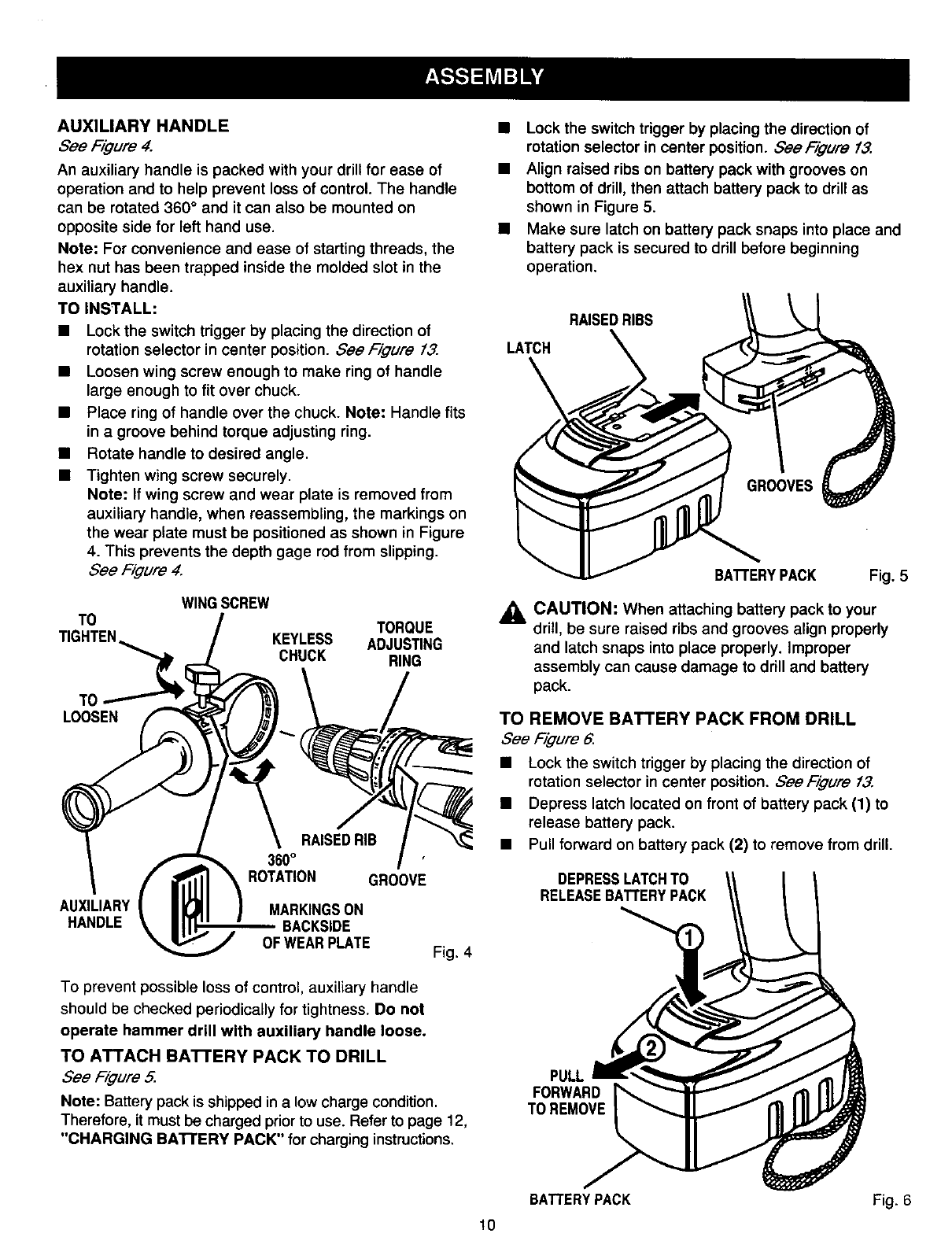
AUXILIARYHANDLE
See Figure 4.
An auxiliary handle is packed with your drill for ease of
operation and to help prevent loss of control. The handle
can be rotated 360 ° and itcan also be mounted on
opposite side for left hand use.
Note: For convenience and ease of starting threads, the
hex nut has been trapped inside the molded slot in the
auxiliary handle.
TO INSTALL:
•Lock the switch trigger by placing the direction of
rotation selector in center position. See Figure 13.
•Loosen wing screw enough to make ring of handle
large enough to fit over chuck.
•Place ring of handle over the chuck. Note: Handle fits
in a groove behind torque adjusting ring.
•Rotate handle to desired angle.
•Tighten wing screw securely.
Note: If wing screw and wear plate is removed from
auxiliary handle, when reassembling, the markings on
the wear plate must be positioned as shown in Figure
4. This prevents the depth gage rod from slipping.
See Figure 4.
WINGSCREW
TO TORQUE
TIGHTEN KEYLESS ADJUSTING
CHUCK RING
TO
LOOSEN
RAISEDRIB
360°
ROTATION GROOVE
AUXILIARY MARKINGSON
HANDLE BACKSIDE
OFWEARPLATE Fig. 4
To prevent possible loss of control, auxiliary handle
should be checked periodically for tightness. Do not
operate hammer drill with auxiliary handle loose.
TO ATTACH BATTERY PACK TO DRILL
See Figure5.
Note:Batterypack isshippedina lowchargecondition.
Therefore,itmust be chargedpriortouse.Refertopage 12,
"CHARGING BATFERY PACK" for charging instructions,
•Lock the switch trigger by placing the direction of
rotation selector in center position. SeeFigure 13.
•Align raised ribs on battery pack with grooves on
bottom of drill, then attach battery pack to drill as
shown in Figure 5.
•Make sure latch on battery pack snaps into place and
battery pack is secured to drill before beginning
operation.
RAISEDRIBS
LATCH
BATrERY PACK Fig. 5
_. CAUTION: When attaching battery pack to your
drill, be sure raised ribs and grooves align properly
and latch snaps into place properly. Improper
assembly can cause damage to drill and battery
pack.
TO REMOVE BATTERY PACK FROM DRILL
See Figure 6.
•Lock the switch trigger by placing the direction of
rotation selector in center position, See Figure 13.
•Depress latch located on front of battery pack (1) to
release battery pack.
•Pull forward on battery pack (2) to remove from drill.
DEPRESSLATCHTO
RELEASEBATrERYPACK
PULL
FORWARD
TO REMOVE
BATTERYPACK Fig. 6
10
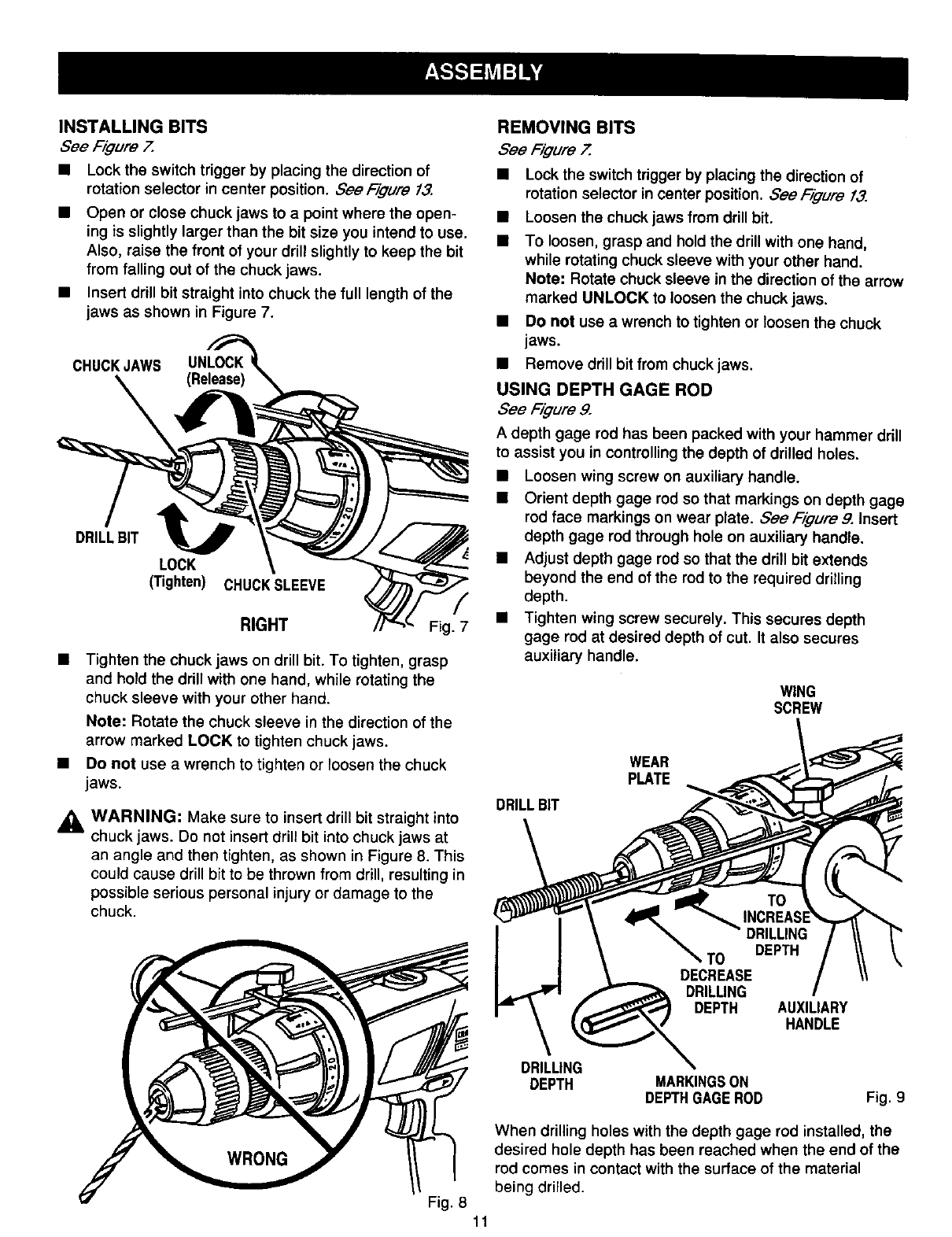
INSTALLING BITS
See Figure 7.
•Lock the switch trigger by placing the direction of
rotation selector in center position. See Figure 13.
•Open or close chuck jaws to a point where the open-
ing is slightly larger than the bit size you intend to use.
Also, raise the front of your drill slightly to keep the bit
from falling out of the chuck jaws.
•Insert drill bit straight into chuck the full length of the
jaws as shown in Figure 7.
CHUCKJAWS UNLOCK
DRILLBIT
LOCK
(Tighten) CHUCKSLEEVE
RIGHT Fig. 7
• Tighten the chuck jaws on drill bit. To tighten, grasp
and hold the drill with one hand, while rotating the
chuck sleeve with your other hand.
Note: Rotate the chuck sleeve in the direction of the
arrow marked LOCK to tighten chuck jaws.
•Do not use a wrench to tighten or loosen the chuck
jaws.
_1, WARNING: Make sure to insert drill bit straight into
chuck jaws. Do not insert drill bit into chuck jaws at
an angle and then tighten, as shown in Figure 8. This
could cause drill bit to be thrown from drill, resulting in
possible serious personal injury or damage to the
chuck.
REMOVING BITS
See Figure7.
•Lock the switch trigger by placing the direction of
rotation selector in center position. See Figure f3.
• Loosen the chuck jaws from drill bit.
• To loosen, grasp and hold the drill with one hand,
while rotating chuck sleeve with your other hand.
Note: Rotate chuck sleeve in the direction of the arrow
marked UNLOCK to loosen the chuck jaws.
•Do not use awrench to tighten or loosen the chuck
jaws.
• Remove drill bit from chuck jaws.
USING DEPTH GAGE ROD
See Figure 9.
Adepth gage rod has been packed with your hammer drill
to assist you in controlling the depth of drilled holes.
•Loosen wing screw on auxiliary handle.
• Orient depth gage rod so that markings on depth gage
rod face markings on wear plate. See Figure 9. Insert
depth gage rod through hole on auxiliary handle.
• Adjust depth gage rod so that the drill bit extends
beyond the end of the red to the required drilling
depth.
•Tighten wing screw securely. This secures depth
gage rod at desired depth of cut. It also secures
auxiliary handle.
WING
SCREW
WEAR
PLATE
DRILLBIT
DRILLING
DEPTH
tILLING
TO DEPTH
DEPTH AUXILIARY
HANDLE
MARKINGSON
DEPTHGAGEROD Fig. 9
Fig. 8
When drilling holes with the depth gage rod installed, the
desired hole depth has been reached when the end of the
rod comes in contact with the surface of the material
being drilled.
11
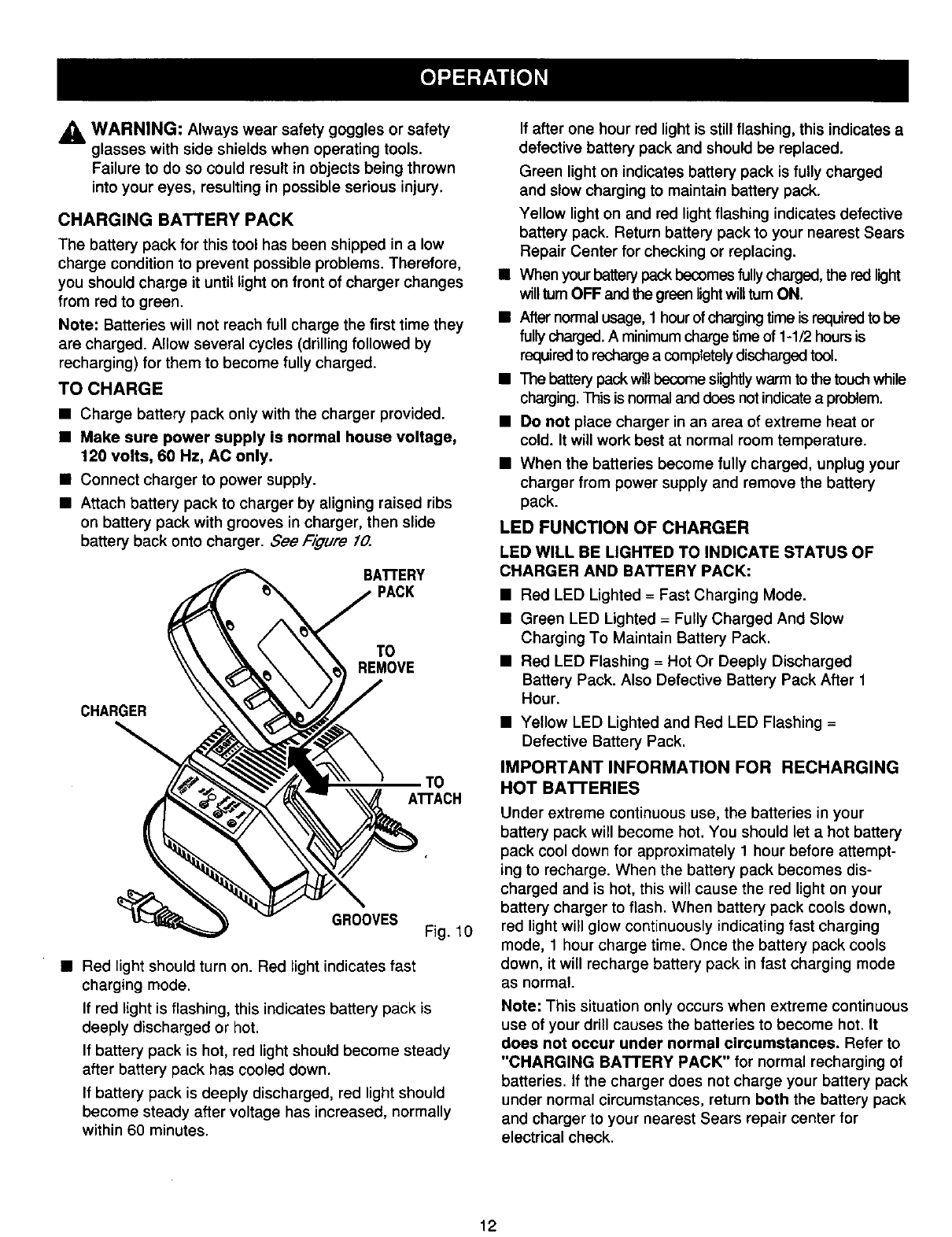
_i, WARNING: Always wear safety goggles or safety
glasses with side shields when operating tools.
Failure to do so could result in objects being thrown
into your eyes, resulting in possible serious injury.
CHARGING BATTERY PACK
The battery pack for this tool has been shipped in a low
charge condition to prevent possible problems. Therefore,
you should charge it until light on front of charger changes
from red to green.
Note: Batteries will not reach full charge the first time they
are charged. Allow several cycles (drilling followed by
recharging) for them to become fully charged.
TO CHARGE
• Charge battery pack only with the charger provided.
•Make sure power supply is normal house voltage,
120 volts, 60 Hz, AC only.
• Connect charger to power supply.
• Attach battery pack to charger by aligning raised ribs
on battery pack with grooves in charger, then slide
battery back onto charger. See Figure 10.
BAI"rERY
PACK
TO
REMOVE
CHARGER
TO
ATTACH
GROOVES Fig. 10
• Red light should turn on. Red light indicates fast
charging mode.
If red light is flashing, this indicates battery pack is
deeply discharged or hot.
If battery pack is hot, red light should become steady
after battery pack has cooled down.
If battery pack is deeply discharged, red light should
become steady after voltage has increased, normally
within 60 minutes.
If after one hour red light is still flashing, this indicates a
defective battery pack and should be replaced.
Green light on indicates battery pack is fully charged
and slow charging to maintain battery pack.
Yellow light on and red light flashing indicates defective
battery pack. Return battery pack to your nearest Sears
Repair Center for checking or replacing.
• When your battery pack becomes fully charged, the red light
will tum OFF and the green light will tum ON.
• After normal usage, 1 hour of charging time is required to be
fully charged. A minimum charge time of 1-1/2 hours is
required to recharge a completely discha_ed tool.
• The battery pack will become slightly warm to the touch while
charging. This is normal and does not indicate a problem.
•Do not place charger in an area of extreme heat or
cold. It will work best at normal room temperature.
• When the batteries become fully charged, unplug your
charger from power supply and remove the battery
pack.
LED FUNCTION OF CHARGER
LED WILL BE LIGHTED TO INDICATE STATUS OF
CHARGER AND BATTERY PACK:
• Red LED Lighted = Fast Charging Mode.
•Green LED Lighted = Fully Charged And Slow
Charging To Maintain Battery Pack.
• Red LED Flashing = Hot Or Deeply Discharged
Battery Pack. Also Defective Battery Pack After 1
Hour.
• Yellow LED Lighted and Red LED Flashing =
Defective Battery Pack.
IMPORTANT INFORMATION FOR RECHARGING
HOT BATTERIES
Under extreme continuous use, the batteries in your
battery pack will become hot. You should let a hot battery
pack cool down for approximately 1 hour before attempt-
ing to recharge. When the battery pack becomes dis-
charged and is hot, this will cause the red light on your
battery charger to flash. When battery pack cools down,
red light wUI glow continuously indicating fast charging
mode, 1 hour charge time. Once the battery pack cools
down, it will recharge battery pack in fast charging mode
as normal.
Note: This situation only occurs when extreme continuous
use of your drill causes the batteries to become hot. It
does not occur under normal circumstances. Refer to
"CHARGING BATTERY PACK" for normal recharging of
batteries. If the charger does not charge your battery pack
under normal circumstances, return both the battery pack
and charger to your nearest Sears repair center for
electrical check.
12
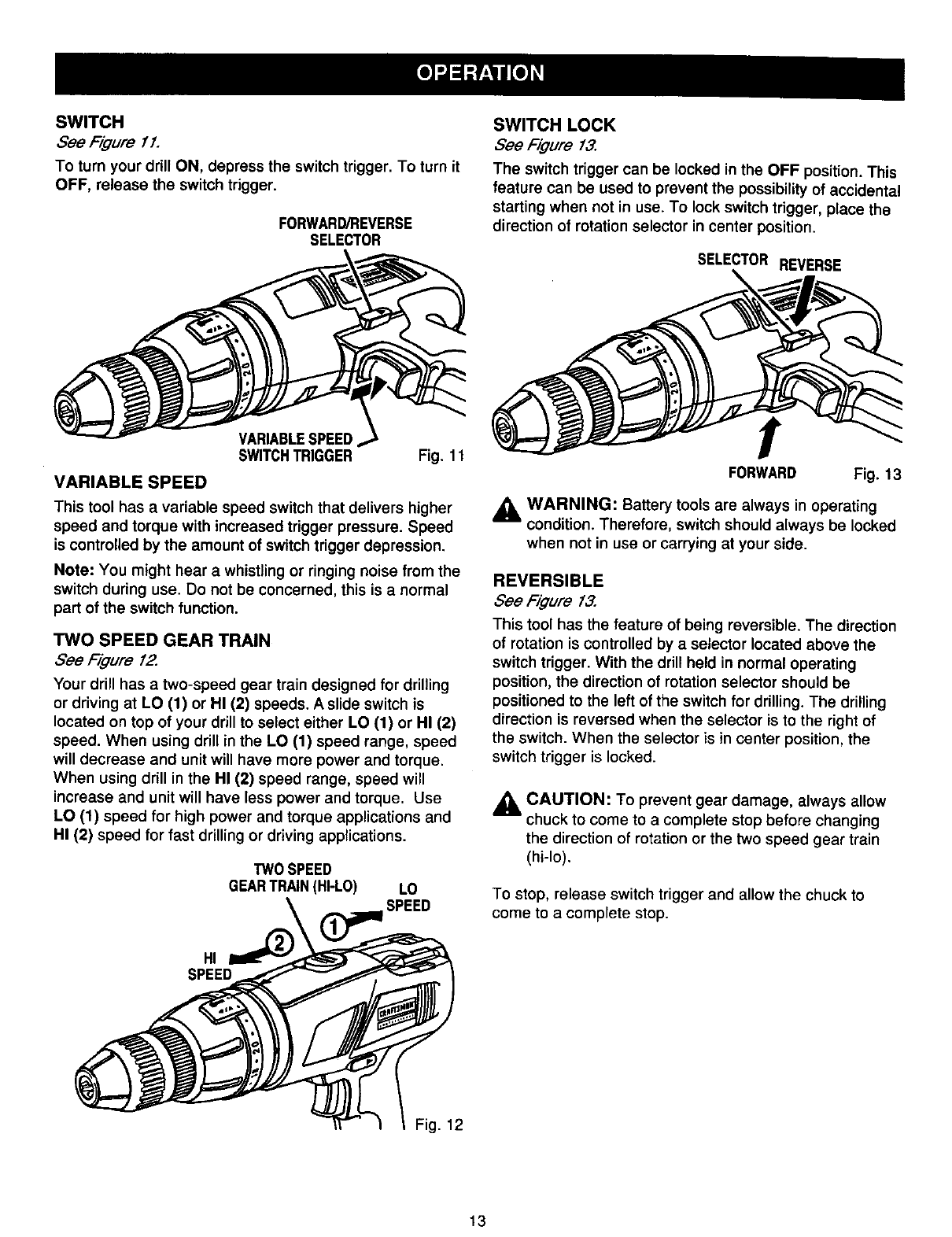
SWITCH
See F/'qure l I.
To turn your drill ON, depress the switch trigger. To turn it
OFF, release the switch trigger.
FORWARD/REVERSE
SELECTOR
VARIABLESPEED
SWITCHTRIGGER Fig. 11
VARIABLE SPEED
This tool has a variable speed switch that delivers higher
speed end torque with increased trigger pressure. Speed
is controlled by the amount of switch trigger depression.
Note: You might hear a whistling or ringing noise from the
switch during use. Do not be concerned, this is a normal
part of the switch function.
TWO SPEED GEAR TRAIN
See Figure 12.
Your drill has a two-speed gear train designed for drilling
or driving at LO (1) or HI (2) speeds. A slide switch is
located on top of your drill to select either LO (1) or HI (2)
speed. When using drill in the LO (1) speed range, speed
will decrease and unit will have more power and torque.
When using drill in the HI (2) speed range, speed will
increase and unit will have less power and torque. Use
LO (1) speed for high power and torque applications and
HI (2) speed for fast drilling or driving applications.
TWOSPEED
GEARTRAIN(HI-LO) LO
SWITCH LOCK
See Figure 13.
The switch trigger can be locked in the OFF position. This
feature can be used to prevent the possibility of accidental
starting when not in use. To lock switch trigger, place the
direction of rotation selector in center position.
SELECTOR REVERSE
!
FORWARD Fig. 13
AWARNING: Battery tools are always in operating
condition. Therefore, switch should always be locked
when not in use or carrying at your side.
REVERSIBLE
See Figure 13.
This tool has the feature of being reversible. The direction
of rotation is controlled by a selector located above the
switch trigger. With the drill held in normal operating
position, the direction of rotation selector should be
positioned to the left of the switch for drilling. The drilling
direction is reversed when the selector is to the right of
the switch. When the selector is in center position, the
switch trigger is locked.
,_ CAUTION: To prevent gear damage, always allow
chuck to come to a complete stop before changing
the direction of rotation or the two speed gear train
(hi-lo).
To stop, release switch trigger and allow the chuck to
come to a complete stop.
HI
SPEED
Fig. 12
13
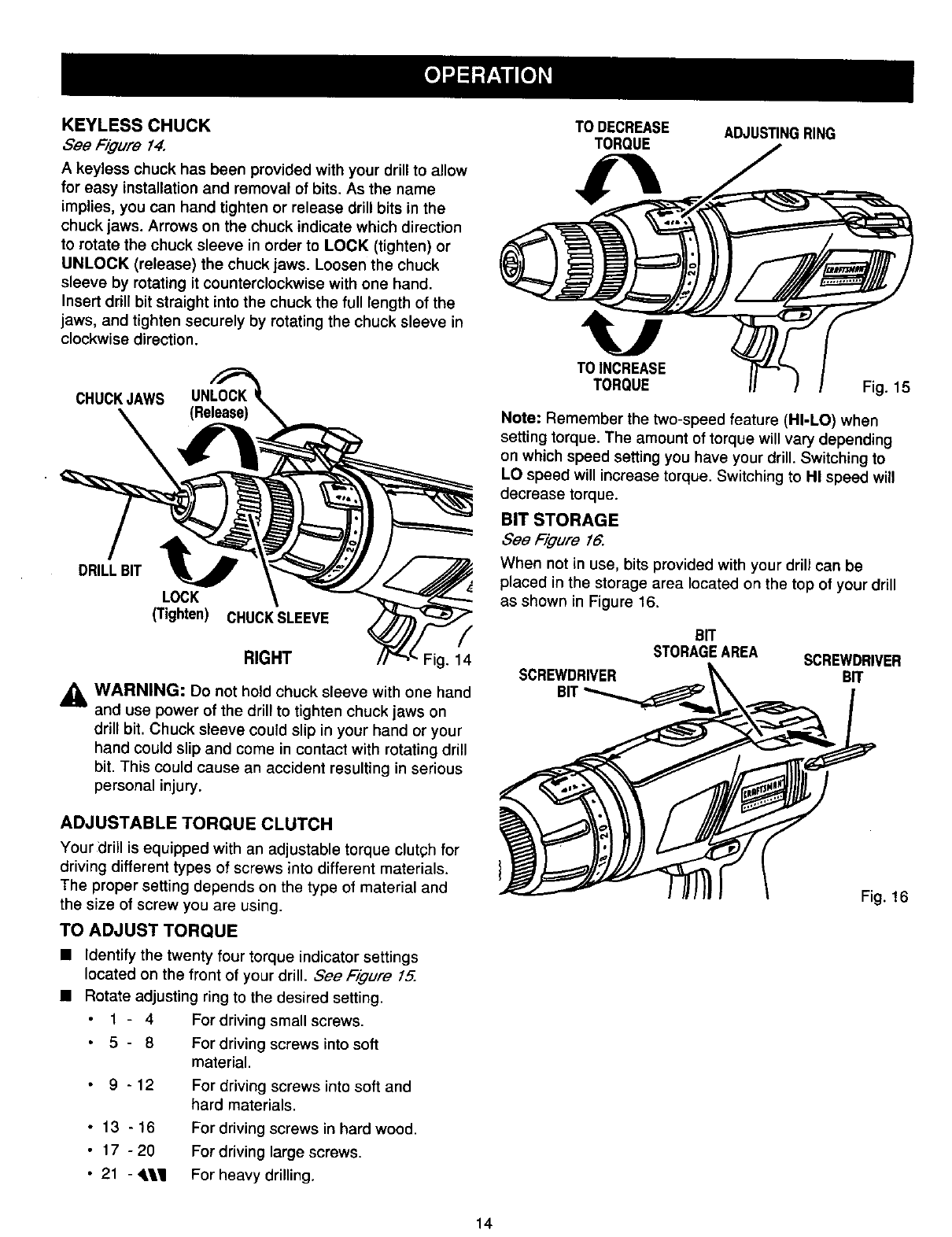
KEYLESS CHUCK
See F'igure 14.
A keyless chuck has been provided with your drill to allow
for easy installation and removal of bits. As the name
implies, you can hand tighten or release drill bits in the
chuck jaws. Arrows on the chuck indicate which direction
to rotate the chuck sleeve in order to LOCK (tighten) or
UNLOCK (release) the chuck jaws. Loosen the chuck
sleeve by rotating it counterclockwise with one hand.
Insert drill bit straight into the chuck the full length of the
jaws, and tighten securely by rotating the chuck sleeve in
clockwise direction.
CHUCKJAWS UNLOCK
DRILLBIT
LOCK
(Tighten) CHUCKSLEEVE
RIGHT Fig. 14
,_ WARNING: Do not hold chuck sleeve with one hand
and use power of the drill to tighten chuck jaws on
drill bit. Chuck sleeve could slip in your hand or your
hand could slip and come in contact with rotating drill
bit. This could cause an accident resulting in serious
personal injury.
ADJUSTABLE TORQUE CLUTCH
Your drill is equipped with an adjustable torque clut;h for
driving different types of screws into different materials.
The proper setting depends on the type of material and
the size of screw you are using.
TO ADJUST TORQUE
• Identify the twenty four torque indicator settings
located on the front of your drill. See Figure 15.
• Rotate adjusting ring to the desired setting.
1 - 4 For driving small screws.
5 - 8 For driving screws into soft
material.
9 -12 For driving screws into soft and
hard materials.
•13 -16 For driving screws in hard wood.
•17 - 20 For driving large screws.
• 21 -,11 For heavy drilling.
TO DECREASE
TORQUE ADJUSTINGRING
TOINCREASE
TORQUE Fig. 15
Note: Remember the two-speed feature (HI-LO) when
setting torque. The amount of torque will vary depending
on which speed setting you have your drill. Switching to
LO speed will increase torque. Switching to HI speed will
decrease torque.
BIT STORAGE
See Figure 16.
When not in use, bits provided with your drill can be
placed in the storage area located on the top of your drill
as shown in Figure 16.
BIT
STORAGEAREA SCREWDRIVER
SCREWDRIVER BIT
Fig. 16
14
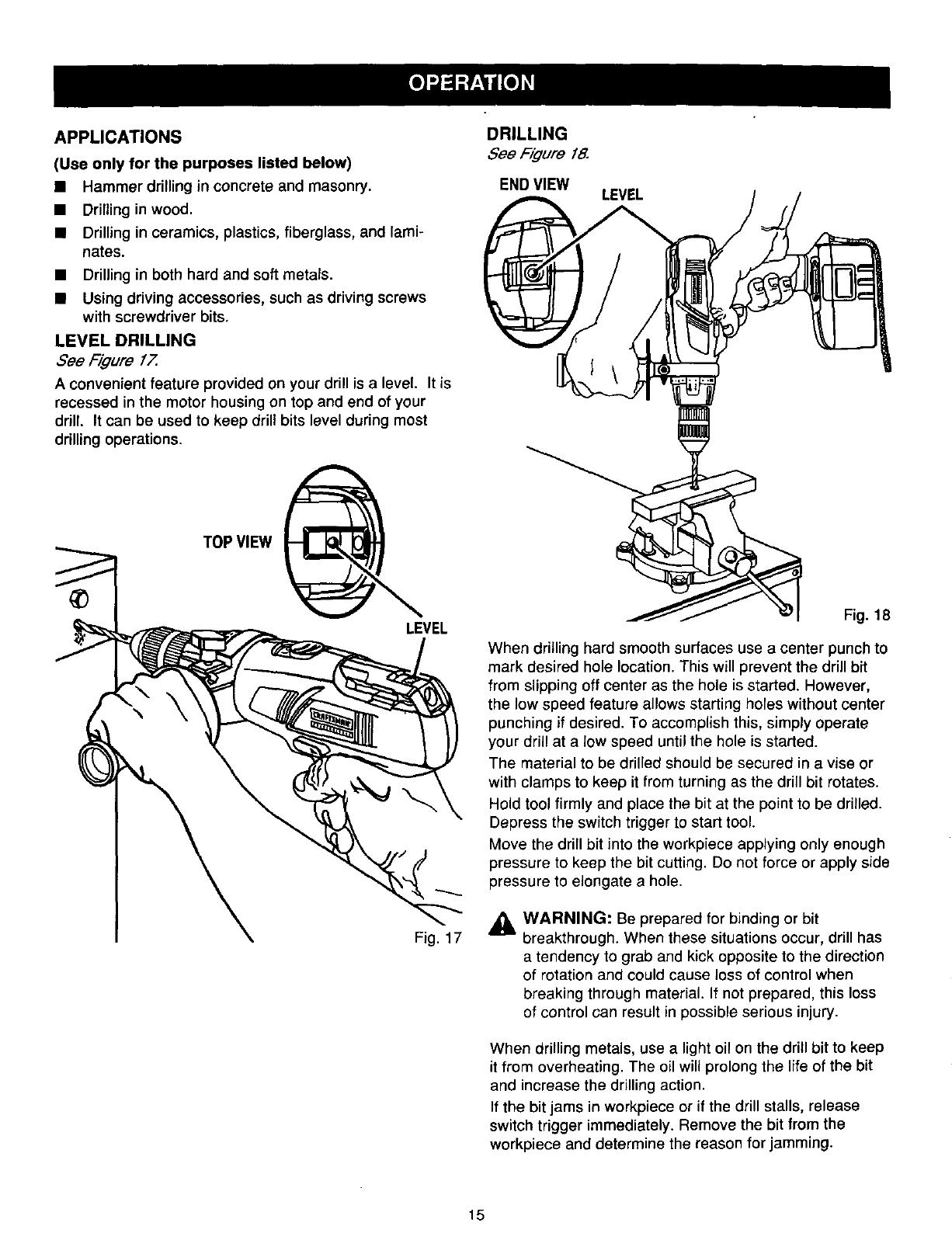
APPLICATIONS
(Use only for the purposes listed below)
•Hammer drilling in concrete and masonry.
•Drilling in wood.
•Drilling in ceramics, plastics, fiberglass, and lami-
nates.
•Drilling in both hard and soft metals.
•Using driving accessories, such as driving screws
with screwdriver bits.
LEVEL DRILLING
See Figure 17.
A convenientfeatureprovidedon yourdrillisalevel.Itis
recessedinthe motor housingon topand end ofyour
drill.Itcan be used tokeep drillbitslevelduringmost
drillingoperations.
TOP VIEW
DRILLING
See Figure 18.
END VIEW LEVEL
LEVEL Fig. 18
When drilling hard smooth surfaces use a center punch to
mark desired hole location. This will prevent the drill bit
from slipping off center as the hole is started. However,
the low speed feature allows starting holes without center
punching if desired. To accomplish this, simply operate
your drill at a low speed until the hole is started.
The material to be drilled should be secured in a vise or
with clamps to keep it from turning as the drill bit rotates.
Hold tool firmly and place the bit at the point to be drilled.
Depress the switch trigger to start tool.
Move the drill bit into the workpiece applying only enough
pressure to keep the bit cutting. Do not force or apply side
pressure to elongate a hole.
Fig. 17 _ll WARNING: Be prepared for binding or bit
breakthrough. When these situations occur, drill has
a tendency to grab and kick opposite to the direction
of rotation and could cause loss of control when
breaking through material. If not prepared, this loss
of control can result in possible serious injury.
When drilling metals, use a light oil on the drill bit to keep
it from overheating. The oil will prolong the life of the bit
and increase the drilling action.
If the bit jams in workpiece or if the drill stalls, release
switch trigger immediately. Remove the bit from the
workpiece and determine the reason for jamming.
15
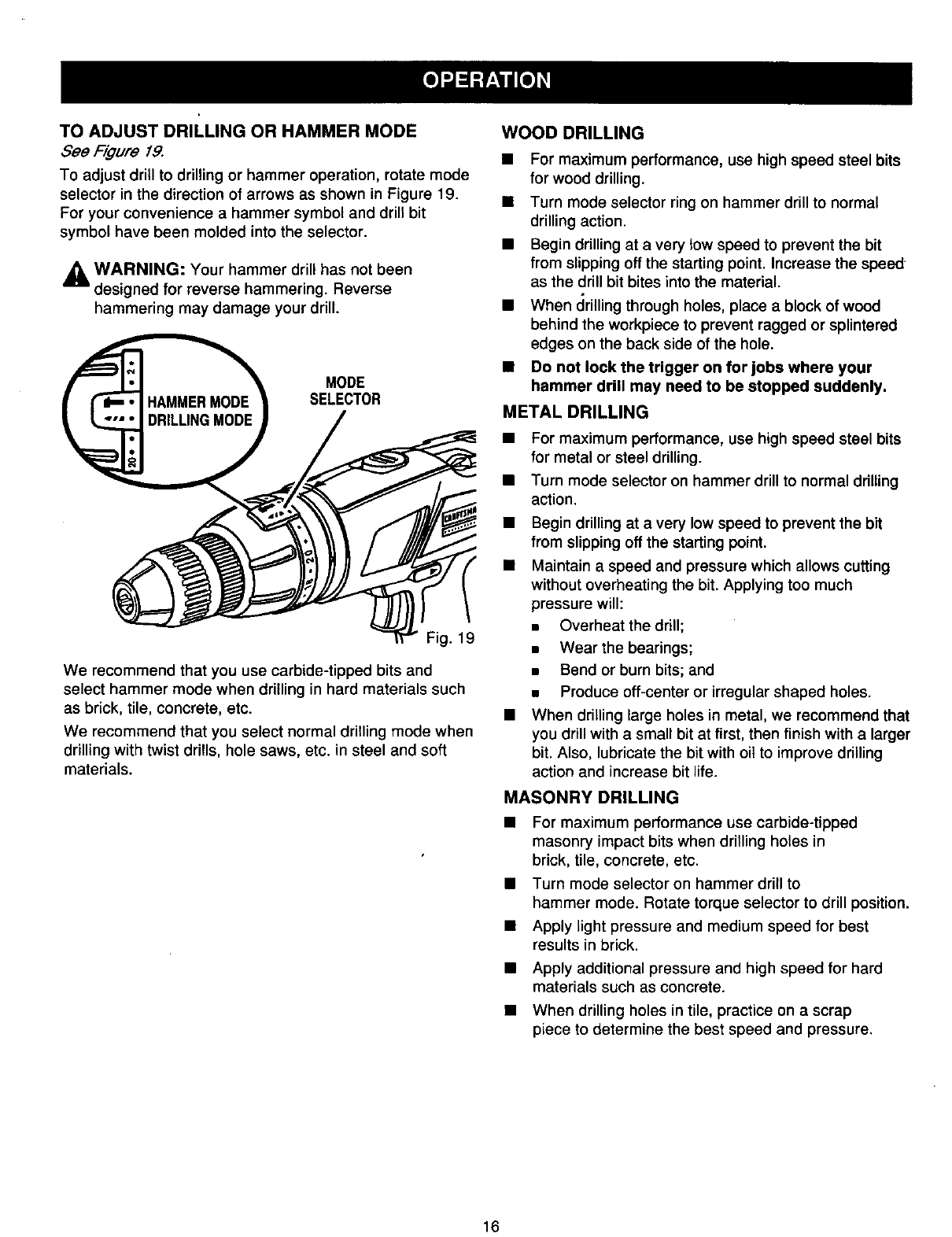
TO ADJUST DRILLING OR HAMMER MODE
Gee Figure 19.
To adjust drUIto drilling or hammer operation, rotate mode
selector in the direction of arrows as shown in Figure 19.
For your convenience a hammer symbol and drill bit
symbol have been molded into the selector.
WARNING: Your hammer drill has not been
designed for reverse hammering. Reverse
hammering may damage your drill.
MODE
SELECTOR
Fig. 19
We recommend that you use carbide-tipped bits and
select hammer mode when drilling in hard materials such
as brick, tile, concrete, etc.
We recommend that you select normal drilling mode when
drilling with twist drills, hole saws, etc. in steel and soft
materials.
WOOD DRILLING
• For maximum performance, use high speed steel bits
for wood drilling.
• Turn mode selector ring on hammer drill to normal
drilling action.
• Begin drilling at a very tow speed to prevent the bit
from slipping off the starting point. Increase the speed
as the drill bit bites into the material.
• When (Jrilling through holes, place a block of wood
behind the workpiece to prevent ragged or splintered
edges on the back side of the hole.
Do not lock the trigger on for jobs where your
hammer drill may need to be stopped suddenly.
METAL DRILLING
For maximum performance, use high speed steel bits
for metal or steel drilling.
Turn mode selector on hammer drill to normal drilling
action.
Begin drilling at a very low speed to prevent the bit
from slipping off the starting point.
Maintain a speed and pressure which allows cutting
without overheating the bit. Applying too much
pressure will:
• Overheat the drill;
• Wear the bearings;
• Bend or burn bits; and
• Produce off-center or irregular shaped holes.
When drilling large holes in metal, we recommend that
you drill with a small bit at first, then finish with a larger
bit. Also, lubricate the bit with oil to improve drilling
action and increase bit life.
MASONRY DRILLING
•For maximum performance use carbide-tipped
masonry impact bits when drilling holes in
brick, tile, concrete, etc.
• Turn mode selector on hammer drill to
hammer mode. Rotate torque selector to drill position.
• Apply light pressure and medium speed for best
results in brick.
• Apply additional pressure and high speed for hard
materials such as concrete.
• When drilling holes in tile, practice on a scrap
piece to determine the best speed and pressure.
16

CHUCK REMOVAL
See Figures20,21, and22.
The chuck must be removed in order to use some
accessories. To remove:
•Lock the switch trigger by placing the direction of
rotation selector in center position. GeeF/gufe 13.
• Insert a 5/16 inch or larger hex key into the chuck of
your drill and tighten the chuck jaws securely.
• Tap the hex key sharply with a mallet in a clockwise
direction. See Fioure 20. This will loosen the screw in
the chuck for easy removal.
MALLET
CHUCKJAWS
KEYLESS
HEX KEY CHUCK Fig. 20
Open chuck jaws and remove hex key. Remove the
chuck screw by turning it in a clockwise direction.
Gee Figure21,
Note: The screw has left hand threads.
SCREWDRIVER
Fig. 21
Insert hex key in chuck and tighten chuck jaws
securely. Tap sharply with a mallet in a counterclock-
wise direction. This will loosen chuck on the spindle. It
can now be unscrewed by hand. Gee Figure 22.
MALLET
Fig. 22
TO RETIGHTEN A LOOSE CHUCK
Periodically check chuck screw for tightness. A loose
chuck screw may cause the chuck jaws to bind and
prevent them from closing.
To tighten, follow these steps:
• Lock the switch trigger by placing the direction of
rotation selector in center position. SeeF@ure 13.
• Open the chuck jaws.
• Insert hex key into chuck and tighten chuck jaws
securely. Tap hex key sharply with a mallet in a
clockwise direction. This will tighten chuck on the
spindle.
• Open the chuck jaws and remove hex key.
• Tighten the chuck screw.
Note: The chuck screw has left hand threads.
17
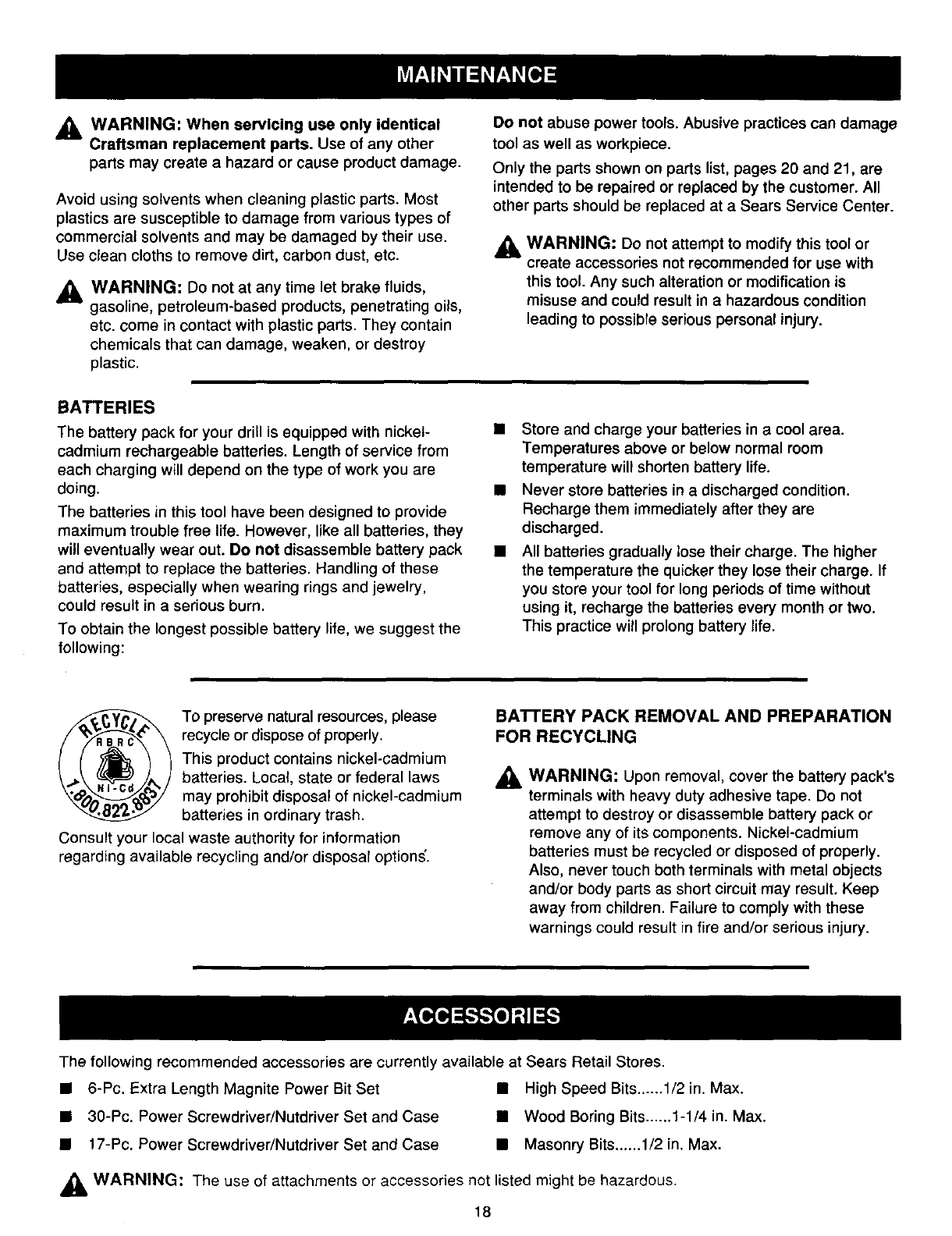
_I, WARNING: When servicing use only identical
Craftsman replacement parts. Use of any other
parts may create a hazard or cause product damage.
Avoid using solvents when cleaning plastic parts. Most
plastics are susceptible to damage from various types of
commercial solvents and may be damaged by their use.
Use clean cloths to remove dirt, carbon dust, etc.
_, WARNING: Do not at any time let brake fluids,
gasoline, petroleum-based products, penetrating oils,
etc. come in contact with plastic parts. They contain
chemicals that can damage, weaken, or destroy
plastic.
Do not abuse power tools. Abusive practices can damage
tool as well as workpieoe.
Only the parts shown on parts list, pages 20 and 21, are
intended to be repaired or replaced by the customer. All
other parts should be replaced at a Sears Service Center.
,_ WARNING: Do not attempt to modify this tool or
create accessories not recommended for use with
this tool. Any such alteration or modification is
misuse and could result in a hazardous condition
leading to possible serious personal injury.
BATTERIES
The battery pack for your drill is equipped with nickel-
cadmium rechargeable batteries. Length of service from
each charging wUI depend on the type of work you are
doing.
The batteries in this tool have been designed to provide
maximum trouble free life. However, like all batteries, they
will eventually wear out. Do not disassemble battery pack
and attempt to replace the batteries. Handling of these
batteries, especially when wearing rings and jewelry,
could result in a serious burn.
To obtain the longest possible battery life, we suggest the
following:
• Store and charge your batteries in a cool area.
Temperatures above or below normal room
temperature will shorten battery life.
• Never store batteries in a discharged condition.
Recharge them immediately after they are
discharged.
• All batteries gradually lose their charge. The higher
the temperature the quicker they lose their charge. If
you store your tool for long periods of time without
using it, recharge the batteries every month or two.
This practice will prolong battery life.
To preserve natural resources, please
recycle or dispose of properly.
This product contains nickel-cadmium
batteries. Local, state or federal laws
may prohibit disposal of nickel-cadmium
batteries in ordinary trash.
Consult your local waste authority for information
regarding available recycling and/or disposal options'.
BA'R'ERY PACK REMOVAL AND PREPARATION
FOR RECYCLING
,_ WARNING: Upon removal, cover the battery pack's
terminals with heavy duty adhesive tape. Do not
attempt to destroy or disassemble battery pack or
remove any of its components. Nickel-cadmium
batteries must be recycled or disposed of properly.
Also, never touch both terminals with metal objects
and/or body parts as short circuit may result. Keep
away from children. Failure to comply with these
warnings could result in fire and/or serious injury.
The following recommended accessories are currently available at Sears Retail Stores.
• 6-Pc. Extra Length Magnite Power Bit Set
• 30-Pc. Power Screwdriver/Nutdriver Set and Case
• 17-Pc. Power Screwdriver/Nutdriver Set and Case
• High Speed Bits......1/2 in. Max.
• Wood Boring Bits......1-1/4 in. Max.
• Masonry Bits...... 1/2 in. Max.
_k WARNING: The use of attachments or accessories not listed might be hazardous.
18

19
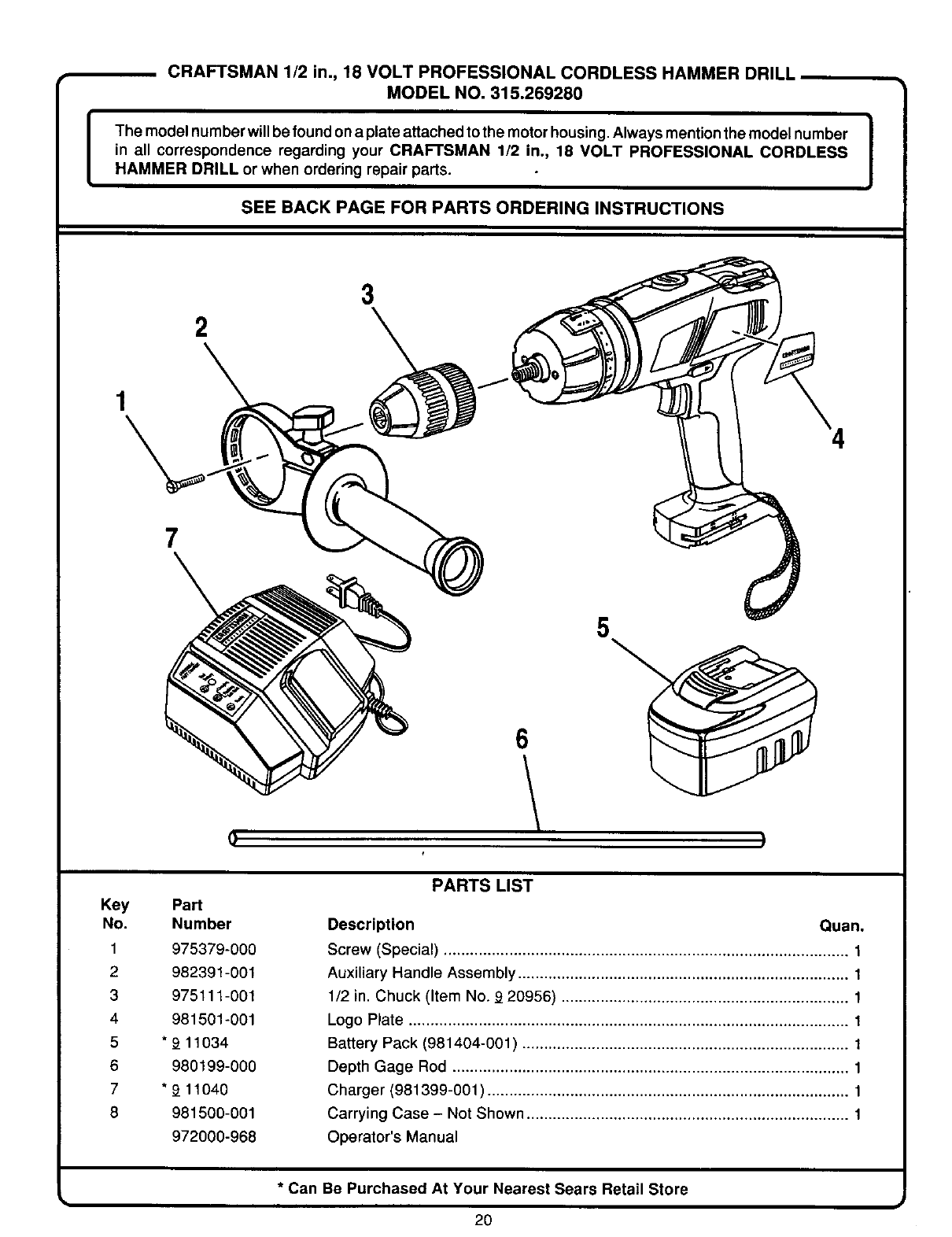
ICRAFTSMAN 1/2 in., 18 VOLT PROFESSIONAL CORDLESS HAMMER DRILL
MODEL NO. 315.269280
The model number will be found on aplate attached to the motor housing. Always mention the model number
in all correspondence regarding your CRAFTSMAN 1/2 in., 18 VOLT PROFESSIONAL CORDLESS
HAMMER DRILL or when ordering repair parts.
SEE BACK PAGE FOR PARTS ORDERING INSTRUCTIONS I
1
7
23
5
6
Key Pa_
No. Number
1 975379-000
2 982391-001
3 975111-001
4 981501-001
5 *_11034
6 980199-000
7 * 9 11040
8 981500-001
972000-968
PARTS LIST
Description Quan.
Screw (Special) ............................................................................................. 1
Auxiliary Handle Assembly ............................................................................ 1
1/2 in. Chuck (Item No. 9 20956) .................................................................. 1
Logo Plate ..................................................................................................... 1
Battery Pack (981404-001) ........................................................................... 1
Depth Gage Rod ........................................................................................... 1
Charger (981399-001) ................................................................................... 1
Carrying Case - Not Shown .......................................................................... 1
Operator's Manual
* Can Be Purchased At Your Nearest Sears Retail Store
20
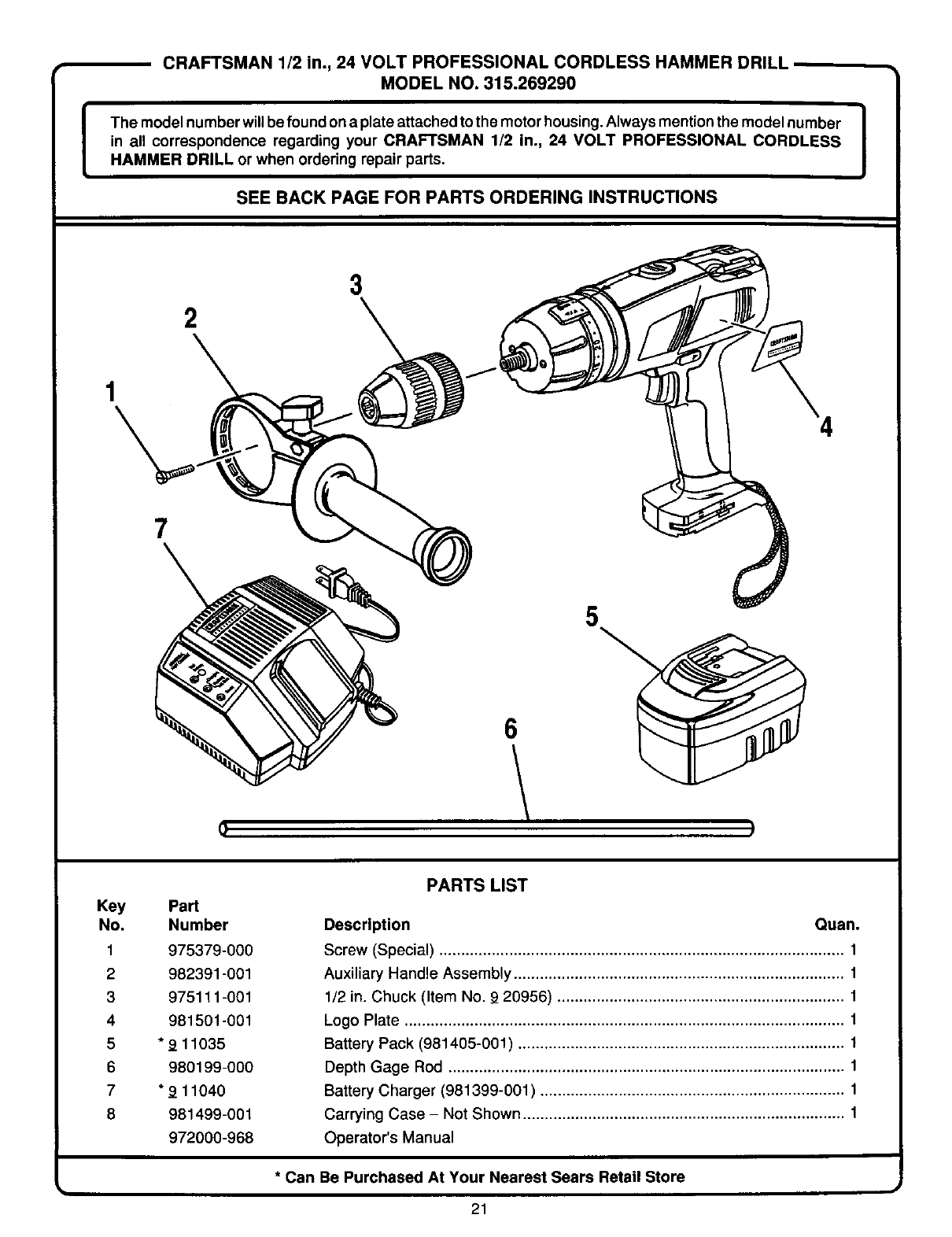
I
CRAFTSMAN 1/2 in., 24 VOLT PROFESSIONAL CORDLESS HAMMER DRILL
MODEL NO. 315.269290
The model number willbe found ona plate attached to the motor housing. Always mention the model number
in all correspondence regarding your CRAFTSMAN 1/2 in., 24 VOLT PROFESSIONAL CORDLESS
HAMMER DRILL or when ordering repair parts.
SEE BACK PAGE FOR PARTS ORDERING INSTRUCTIONS I
3
2
7
4
5
6
Q
Key Pa_
No. Number
1 975379-000
2 982391-001
3 975111-001
4 981501-001
5 *_ 11035
6 980199-000
7 *_11040
8 981499-001
972000-968
PARTS LIST
Description Quan.
Screw (Special) ............................................................................................. 1
Auxiliary Handle Assembly ............................................................................ 1
1/2 in. Chuck (Item No. 9 20956) .................................................................. 1
Logo Plate ..................................................................................................... 1
Battery Pack (981405-001) ........................................................................... 1
Depth Gage Rod ........................................................................................... 1
Battery Charger (981399-001 ) ...................................................................... 1
Carrying Case - Not Shown .......................................................................... 1
Operator's Manual
* Can Be Purchased At Your Nearest Sears Retail Store
21
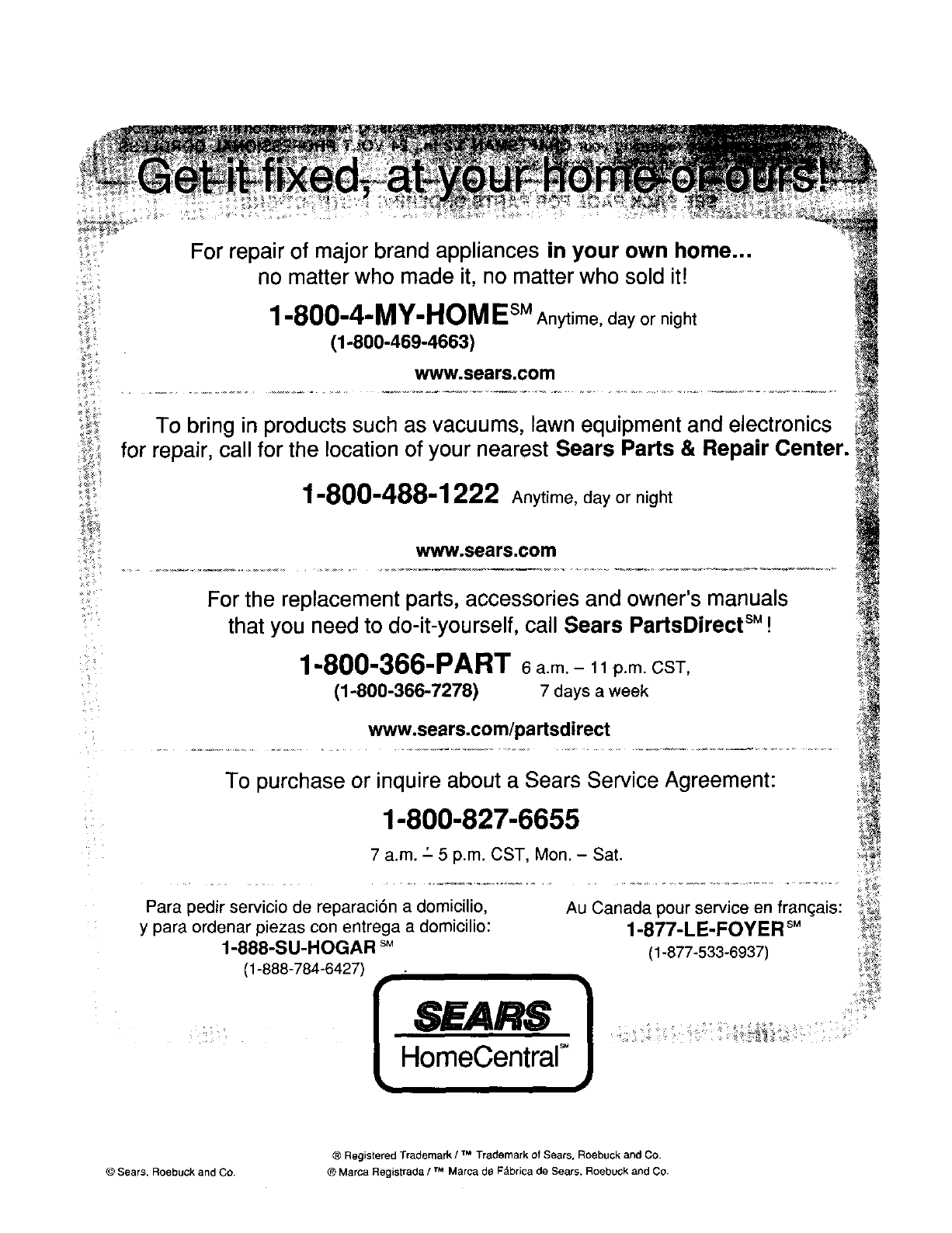
For repair of major brand appliances in your own home...
..... no matter who made it, no matter who sold ifl
1-800-4-MY-HOME sMAnytime, day or night
(1-800-469-4663)
www.sears.com
To bring in products such as vacuums, lawn equipment and electronics
for repair, call for the location of your nearest Sears Parts &Repair Center.
1-800-488-1222 Anytime, day or night
www.sears.com
For the replacement parts, accessories and owner's manuals
that you need to do-it-yourself, call Sears PartsDirect sM!
1 800 366 PART
..... 6 a.m. - 11 .p.m. CST,
: (1-800-366-7278) 7 days a week
www.sears.corn/partsdirect
To purchase or inquireabout a Sears Service Agreement:
1-800-827-6655
7 a.m. -' 5 p.m. CST, Men. - Sat.
SEARS
TM
® Registered Trademark /Trademark of Sears, Roebuck and Co.
© Sears. Roebuck and CO. ®Marca Registreda /T, Marca de F_brica de Sears. Roebuck and Co.
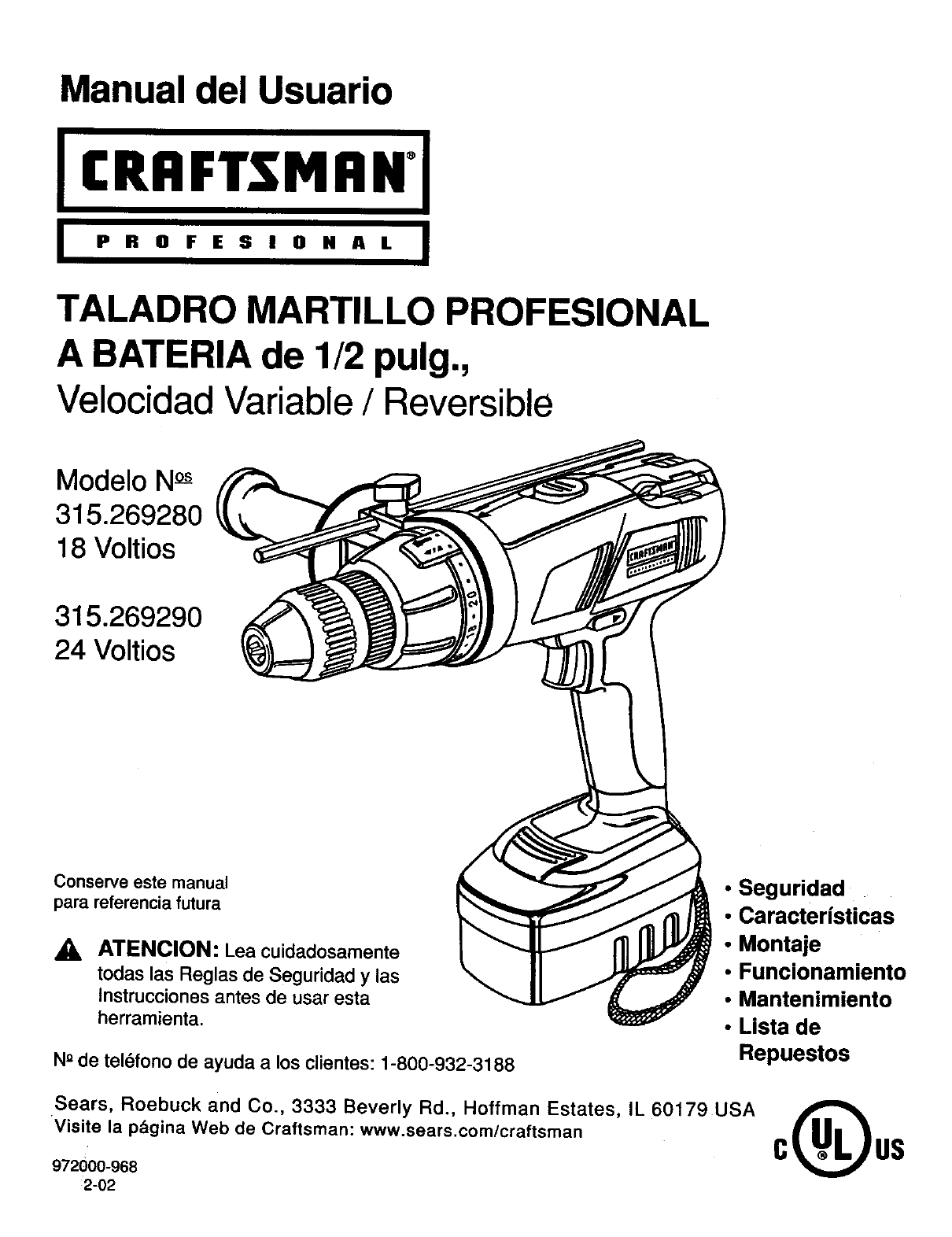
Manual del Usuario
ICRAFTSMAN° I
P R 0 F E S I O N A L
TALADRO MARTILLO PROFESIONAL
A BATERIA de 1/2 pulg,,
Velocidad Variable /Reversible
Modelo N°s
315.269280
18 Voltios
315.269290
24 Voltios
Conserve este manual
para referencia futura
AATENCION: Lea cuidadosamente
todas las Reglasde Seguridady las
Instruccionesantesde usaresta
herramienta.
Nn de tel6fono de ayuda a los clientes: 1-800-932-3188
• Seguridad
• Caracter|sticas
• Montaje
• Funcionamiento
•Mantenimiento
•Lista de
Repuestos
Sears, Roebuck and Co., 3333 Beverly Rd., Hotfman Estates, IL 60179 USA
Visita la pbgina Web de Craftsman: www.sears.com/craftsman
972000-968
2-02
c( .s
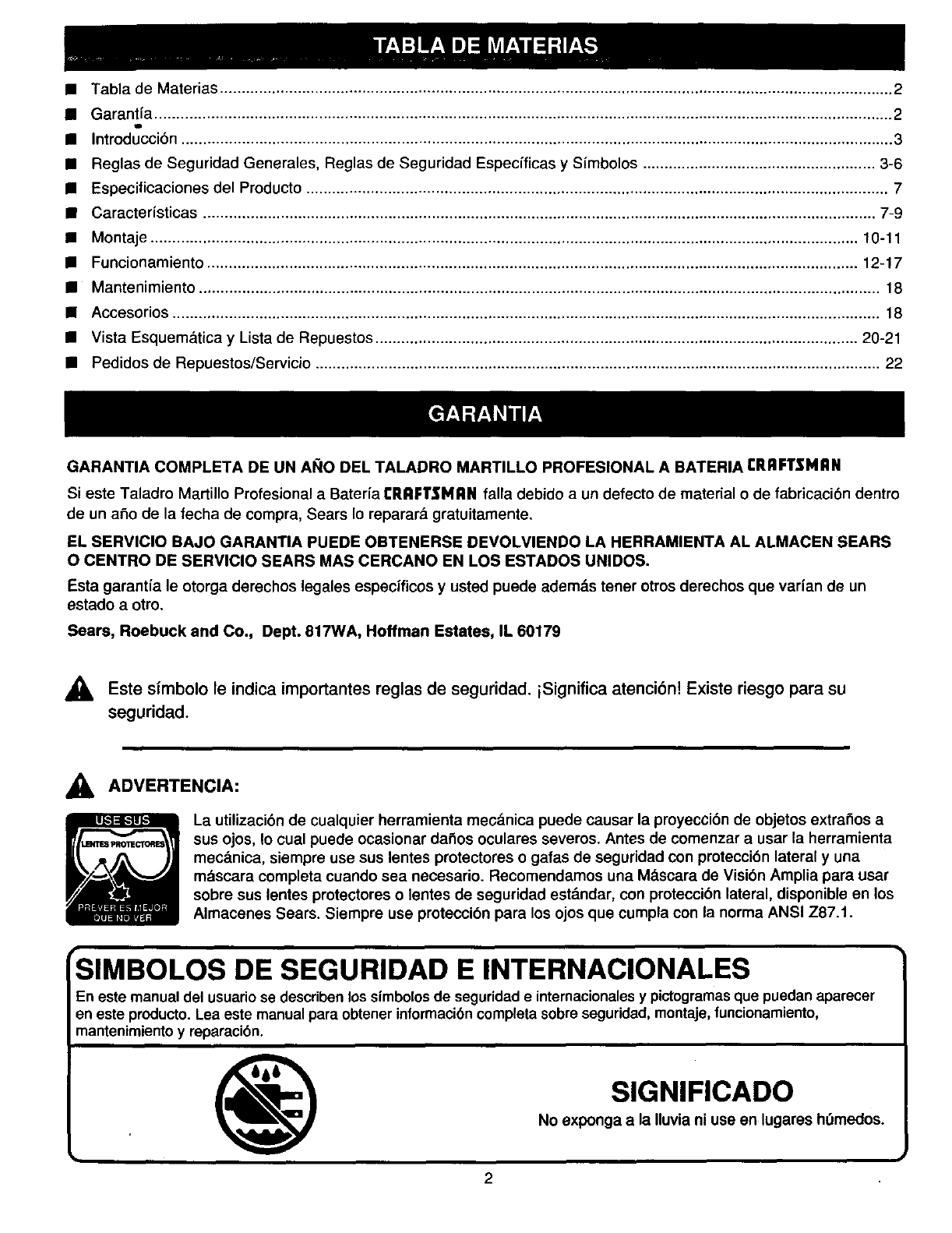
• Tabla de Materias ............................................................................................................................................................ 2
III Garantfa ........................................................................................................................................................................... 2
• Introducci6n ..................................................................................................................................................................... 3
• Reglas de Seguridad Generales, Reglas de Seguridad Especfficas y Simbolos ...................................................... 3-6
• Especificaciones del Producto ....................................................................................................................................... 7
• Caracteristicas ............................................................................................................................................................ 7-9
• Montaje .................................................................................................................................................................... 10-11
• Funcionamiento ....................................................................................................................................................... 12-17
• Mantenimiento .............................................................................................................................................................. 18
• Accesorios .................................................................................................................................................................... 18
• Vista Esquem&tica y Lista de Repuestos ................................................................................................................ 20-21
• Pedidos de Repuestos/Servicio ................................................................................................................................... 22
GARANTIA COMPLETA DE UN ANO DEL TALADRO MARTILLO PROFESIONAL A BATERIA rRRFTSMRN
Si este Taladro Martillo Profesional a Bateria I:RRF'rSMRN falla debido a un defecto de material o de fabricaci6n dentro
de un afio de la fecha de compra, Sears Io reparar#, gratuitarnente.
EL SERVIClO BAJO GARANTIA PUEDE OBTENERSE DEVOLMIENDO LA HERRAMIENTA AL ALMACEN SEARS
O CENTRO DE SERVICIO SEARS MAS CERCANO EN LOS ESTADOS UNIDOS.
Esta garantia le otorga derechos legales especificos y usted puede adem_.s tenet otros derechos que varfan de un
estado a otro.
Sears, Roebuck and Co., Dept. 817WA, Hoffman Estates, IL 60179
,_ Este simbolo le indica importantes reglas de seguridad, iSignifica atenci6n] Existe riesgo para su
seguridad.
ADVERTENCIA:
La utilizaci6n de cualquier herramienta mec&nica puede causar la proyecci6n de objetos extrafios a
sus ojos, Io cual puede ocasionar dafios oculares severos. Antes de comenzar a usar la herramienta
mec&nica, siempre use sus lentes protectores o gafas de seguridad con protecci6n lateral y una
m_scara completa cuando sea necesario. Recomendamos una M_.scara de Visi6n Amplia para usar
sobre sus lentes protectores o lentes de seguridad est&ndar, con protecci6n lateral, disponible en los
Almacenes Sears. Siempre use protecci6n para los ojos que cumpla con la norma ANSI Z87.1.
SIMBOLOS DE SEGURIDAD E INTERNACIONALES
En este manual del usuario se describen lossfmbolosde seguridad e internacionales y pictogramas que puedan aparecer
en este producto. Lea este manual para obtener informaci6n completa sobre seguridad, montaje, funcionamiento,
mantenimiento y reparaci6n.
SIGNIFICADO
No exponga a la Iluvia ni use en lugares hOrnedos.
2
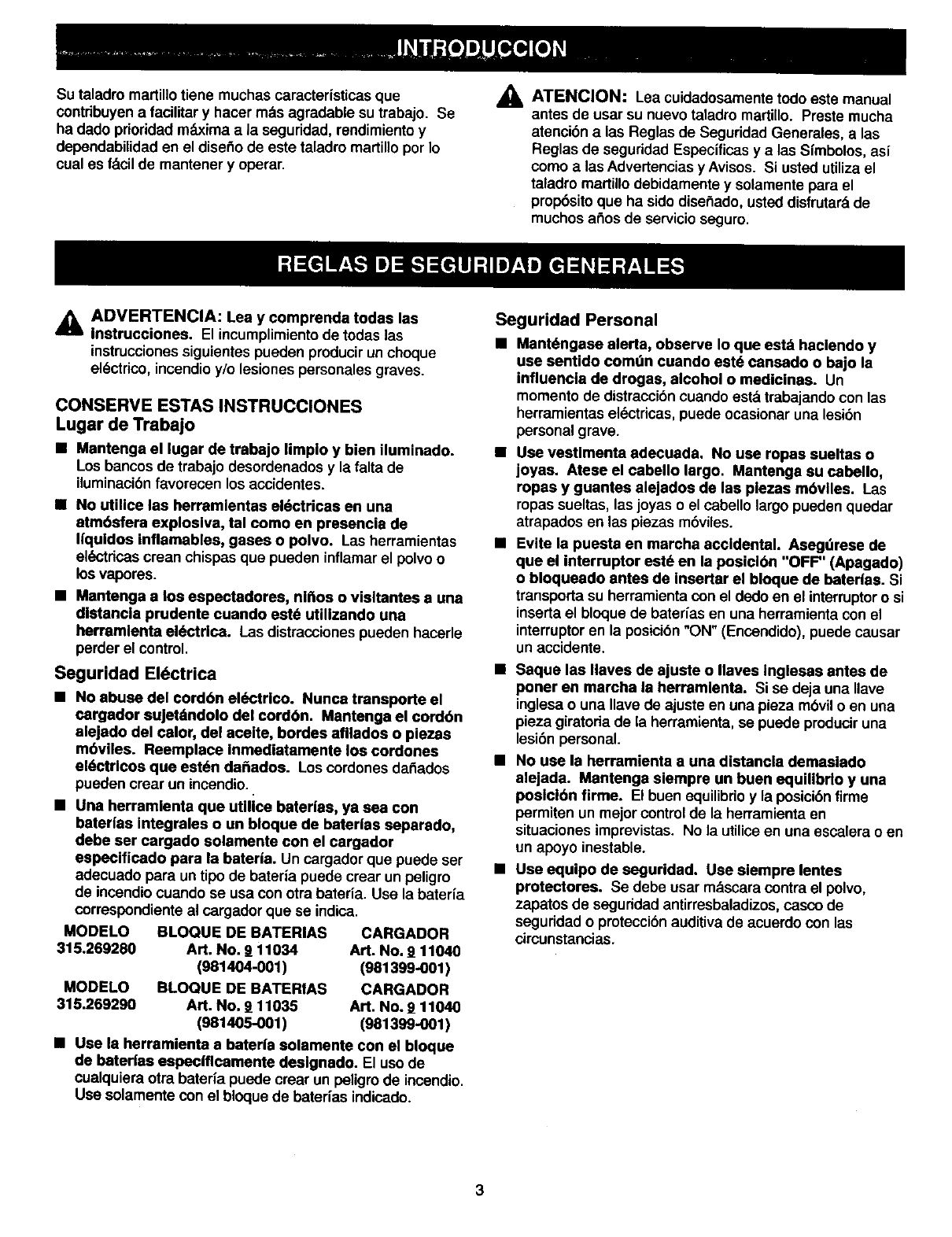
Su taladro martillotiene muchas caracter{sticasque
contribuyena facilitar y hacer m&sagradable su trabajo. Se
ha dado prioridadm_lximaa la seguridad, rendimientoy
dependabilidaden el diseSode este taladro martillopor Io
cual es f&cil de mantener y operar.
ATENCION: Lea cuidadosamentetodo este manual
antes de usar su nuevo taladromartillo. Preste mucha
atencibn alas Reglas de SeguridadGenerales, alas
Reglas de seguridad Especificas yalas Sfmbolos,asi
como alas Advertencias y Avisos. Si usted utiliza el
taladro martillo debidamente y solamente para el
propbsitoque ha sidodisefiado, usted disfrutarbde
muchos arias de servicioseguro.
_ADVERTENCIA: Lea y comprenda todas las
Instrucciones. El incumplimientode todas las
instruccionessiguientes pueden producirun choque
ek_ctrico,incendioy/o lesionespersonales graves.
CONSERVE ESTAS INSTRUCCIONES
Lugar de Trabajo
•Mantenga el lugar de trabajo limpio y bien iluminado.
Los bancos de trabajo desordenados y la falta de
iluminacibnfavorecen los accidentes.
•No utilice las herramlentas eldctricas en una
atmbsfera exploslva, tal como en presencia de
I#quldos inflamables, gases o polvo. Las herramientas
el_-'tdcas crean chispas que pueden inflamarel polvoo
los vapores.
•Mantenga a los espectadores, nlhos o visltantes a una
dlstancla prudente cuando est_ utillzando una
herramlenta ek_ctrlca. Las distraccionaspueden hacerle
perder el control.
Seguridad EI6ctrica
•No abuse del cordbn eldctrlco. Nunca transporte el
cargador sujetdndolo del cordbn. Mantenga el cord6n
alejado del calor, del acelte, bordes afilados o piezas
mbviles. Reemplace Inmediatamente los cordones
el_trlcos que est(_n danadoe. Los cordones dafiados
pueden crear un incendio.
•Una herramienta que utllice baterlas, ya sea con
baterfas integrales o un bloque de bater|as separado,
debe ser cargado aolamente con el cargador
eepeclficado para la bater|a. Un cargador que puede ser
adecuado para un tipo de bateda puede crear un peligro
de incendiocuando se usacon otra bateda. Use la bateda
correspondienteal cargador que se indica.
MODELO BLOQUE DE BATERIAS CARGADOR
315.269280 Art. No. 9 11034 Art. No. 9 11040
(981404.001 ) (981399-001 )
MODELO BLOQUE DE BATERIAS CARGADOR
315.269290 Art. No. 9 11035 Art. No. 9 11040
(981405-001) (981399-001 )
•Use la herramienta a baterla solamente con el bloque
de baterlas especl'flcamente deslgnado. El uso de
cualquieraotra bateda puede crear un peligrode incendio.
Use solamente con el bloqua de bater|as indicado.
Seguridad Personal
•Mant_ngase alerta, observe Io que estd haclendo y
use sentido comdn cuando est_ cansedo o bajo la
influencla de drogas, alcohol o medicinas. Un
momenta de distraccibncuando est_ trabajandocon las
herramiantas el_ctricas,puede ocasionar una lesibn
personal grave.
• Use vestlmenta adecuada. No use ropas sueltas o
joyas. Ateee el cabello largo. Mantenga su cabello,
ropas y guantes alejados de las plezas mbvlles. Las
ropas sueltas, las joyas o el cabellolargo puaden quedar
atrapados an las piezas m6viles.
•Evite la puesta en marcha accidental. Asegdrese de
que el interruptor est(_en la posiclbn "OFF" (Apagado)
o bloqueado antes de insertar el bloque de batedas. Si
transporta su herramienta con el dedo en el interruptoro si
inserta el bloque de baterias an una herramientacon el
interruptoren la pasici6n"ON" (Encendido), puede causar
un accidante.
•Saque las Ilaves de ajuste o Ilaves Inglesas antes de
poner en marcha la herramlenta. Si se deja una Ilave
inglesa o una Ilavede ajusta en una pieza mbvilo en una
pieza giratoria de la herramienta, se puede produciruna
lasi6n personal.
•No use la herramienta a una distancla demasiado
alejada. Mantenga siempre un buen equillbrlo y una
poslcl6n firme. El buen equilibrioy la posici6nfirme
permiten un mejor controlde la harramienta en
situaciones imprevistas. No la utilicoen una escalara o en
un apoyo inestable.
•Use equipo de seguridad. Use slempre lentes
protectores. Se debe usar m_scara contra el polvo,
zapatos de seguddad antirresbaladizos,casco de
seguddad o proteccibnauditivade acuerdo con las
circunstancias.
3
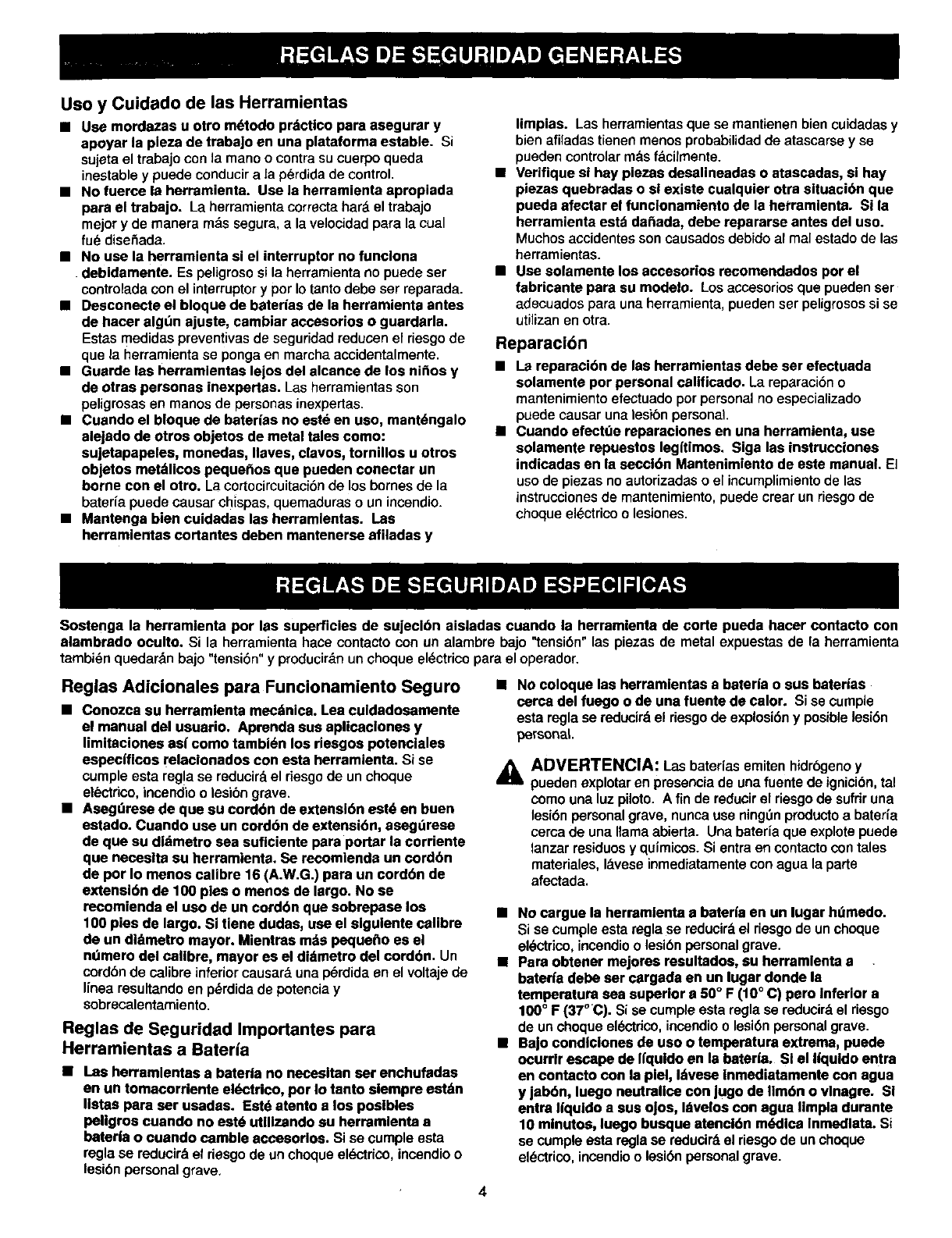
Uso y Cuidado de las Herramientas
•Use mordazas u otro m6todo pr_tctico pare asegurar y
apoyar la pieza de trabaJo en una plataforma estable. Si
sujeta el trabajo con la mano n contra su cuerpo queda
inestable y puede cenducir ala p_rdida de control.
•No fuerce la herramienta. Use la herramienta apropiada
pare el trabajo. La herramienta correcta hard el trabajo
mejor yde manera m_s segura, ala velocidad para la cual
fu6 dise._ada.
•No use la herramienta si el interruptor no funclona
debidamente. Es peligroso sila herramienta no puede set
controlada con el interruptor y per Io tanto debe ser reparada.
•Desconecte el bloque de baterias de la herramienta antes
de hacer alg,',n ajuste, cambiar accesorios o guardarla.
Estas medidas preventivas de seguridad reducon el riesgo de
que la herramienta se ponga en marcha accidentalmente.
•Guarde lea herramlentas lejos del alcance de los nifios y
de otras personas inexpertas. Las herramientas son
peligrosas en manos de personas inexpertas.
•Cuando el bloque de baterias no este en uso, mant_ngalo
alejado de otros objetos de metal tales como:
sujetapapelea, monedas, Ilaves, clavos, tornillos u otros
objetos metdlicos pequehos que pueden conectar un
borne con el otro. La cortocircuitacibn de los bornes de la
bateria puede causar chispas, quemaduras e un incendio.
•Mantenga bien cuidadas lea herramlentas. Las
herramientas cortantes deben mantenerse afiladas y
limpias. Las herramientas que se mantienen bien cuidadas y
bien afiladas tienen menos probabilidad de atascarse yse
pueden contmlar m_s f&ci/mente.
•Verifique si hay piezas desallneadas o atascadaa, el hay
piezas quebradas o sl existe cualquier otra situacibn que
pueda afectar el funclonamiento de la hel'ramlenta. Si la
herramienta estd dafiada, debe repararse antes del uso.
Muchos accidentes son causados debido al mal estado de las
herramientas.
•Use solamente los accasorios recomendados por el
fabricante para su modelo. Los accesorios que pueden ser
adecuados pare una herramienta, pueden set peligrosos si se
utilizan en otra.
Reparacion
•La reparacibn de lea herramientas debe ser efeetuada
solamente per personal eallficado. La reparacibno
mantenimientoefectuadoper personalnoespecializado
puedecausarunalesibnpersonal
•Cuando efectue reparaciones en una herramienta, use
solamente repueatos legl'timos. Siga las instruccionea
indicadas en la secel6n Mantenimiento de este manual. El
usode piezas noautorizadaso el incumplimientode las
instrucciones de mantenimiento, puede crearun riesgode
choqueel6ctricoo lesiones.
Sostenga la herramienta por las superficies de sujeclbn aisladas cuando la herramienta de corte pueda hacer contacto con
alambrado oculto. Si la herramienta hace contacto con un alambre bajo "tensiOn" las piezas de metal expuestas de la herramienta
tambi_n quedardn bajo "tensi6n" y producir&n un choque el_ctrico para el operador.
Reglas Adicionales para Funcionamiento Seguro
•Conozca su herramienta mec_inica. Lea cuidadoeamente
el manual del usuario. Aprenda sue aplicaclones y
limltaciones as# como tambidn los riesgos potenclales
especfflcos relacionados con esta herramienta. Si se
cumple esta reg!a se reducirb el desgo de un choque
el_ctrico, incendio o lesibn grave.
•Asegdreae de que su cordbn de extenslbn eat_ en buen
estado. Cuando use un corddn de extensibn, aeagdreea
de que su dl6metro sea suficiente para porter la eorriente
que neceslta su herramienta. Se recomlenda un cordbn
de por Io menos calibre 16 (A.W.G.) pare un eordbn de
extensi6n de 100 plea o menos de largo. No ea
recomienda el uso de un cordbn que sobrepaea los
100 pies de largo. Si tiene dudas, use el sigulente calibre
de un dhtmetro mayor. Mientras m_ts pequetlo ea el
ndmero del calibre, mayor es el didmetro del corddn. Un
cordbn de calibre inferior causar& una p6rdida en el voltaje de
Iinea resultando en p(_rdidade potencia y
sobrecalentamiento.
Reglas de Seguridad Importantes para
Herramientas a Bateria
•Las herramlentas a baterla no necesltan ear enchufadas
en un tomacorriente el_ctrico, por Io tanto slempre est6n
Ilstas para ser usadas. Est6 atento s los poslbles
peligros cuando no est6 utlllzando su herramlenta a
bater|a o cuando camble eccesorlos. Si se cumple esta
regla se reducir_ el riesgo de un choque elL_trico, incondio o
lesibn personal grave,
•NO coloque las herramlentas a bater|a o sus batertas
carca del fuego o de una fuente de calor. Si se cumple
esta regla se reducird el riesgo de explosion y posible lesion
personal.
,_ ADVERTENCIA: Las baterfas emiten hidrbgenoy
puedenexplotaren presenciade unafuente de ignicibn,tal
comounaluz piloto.A fin de reducirel riesgode sufriruna
lesionpersonal grave, nuncause ningOnproductoa bateria
cercade unallamaabierta. Unabateria queexplotepuede
lanzarresiduosy quimicos.Si entraen contactocontales
materiales, I_veseinmediatamenteconagua la parte
afectada.
• No cargue la herramlenta a baterla en un lugar hdmedo.
Si se cumple esta regla se reducir_,el riesgo de un choque
el_ctrico, incendio o lesion personal grave.
•Para obtener mejorea reaunados, $u herramlenta a
baterla debe ear cargada en un lugar donde la
temperature sea superior a 50 ° F (10 ° C) pero Inferior a
100 ° F (37° C). Si se cumple esta regla se reducir8 el riesgo
de un choque el6ctrico, incendio o lesion personal grave.
•Bajo condlclones de uso o temperature extrema, puede
ocurrlr escape de Ifquldo en la hater|a. Sl el I|quldo entre
en contacto con la plel, Idveea Inmediatamente con agua
y jab6n, luego neutrallca coo Jugo de IIm6n o vlnagre. SI
entre I|quldo a sus oJos, Idvelos con ague limpla durante
10 mlnutos, luego busque atencl6n m_SdicaInmedlata. Si
se cumple esta regla se reducir_ el riesgo de un choque
el_ctrico, incondio o lesion personal grave.
4
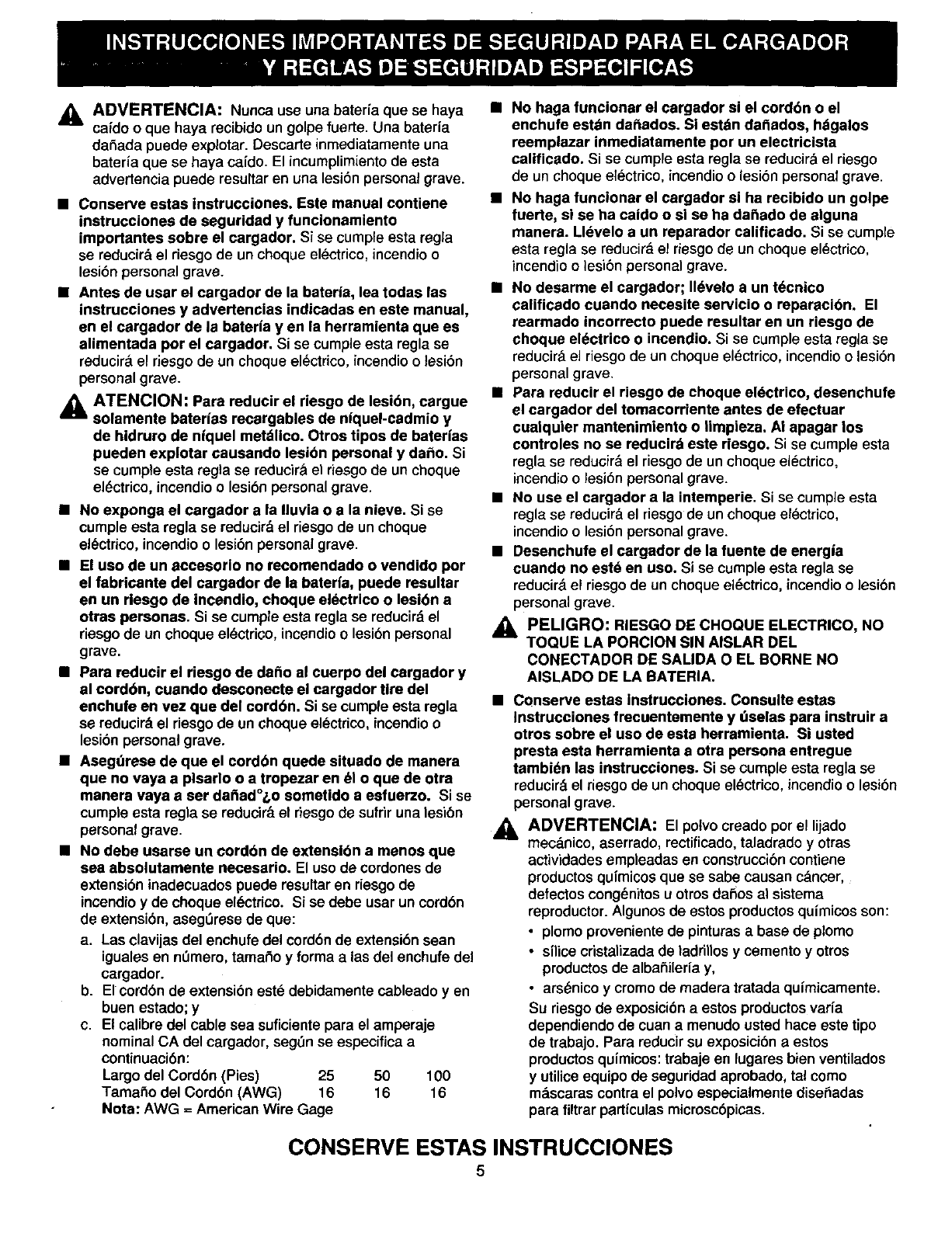
_1=ADVERTENCIA: Nunca use una baterfa que se haya
cafdo o que hays recibido un golpefuerte. Una baterfa
dafiada puede explotar. Descarte inmediatamente una
baterfa que se haya cafdo. El incumplimientode esta
advertencia puede resultaren una lesi6n persona!grave.
•Conserve estas instrucciones. Este manual contiene
instrucciones de seguridad y funcionamiento
importantes sobre el cargador. Si se cumple esta regla
se reducir_ el riesgo de unchoque electrico, incendioo
lesibnpersonal grave.
•Antes de usar el cargador de la bateria, lea todas las
instrucciones y advertenclas indicadas en este manua!,
en el cargador de la bater|a yen la herramienta que es
alimentada por el cargador. Si se cumple esta regis se
reducir_,el riesgo de un choque el_ctrico,incendio o lesibn
personal grave.
_L ATENClON: Para reducir el riesgo de lesibn, cargue
solamente baterias recargables de niquel-cadmio y
de hidruro de nfquel metal!co. Otros tipos de batedas
pueden explotar causando lesibn personal y da_o. Si
se cumple esta regla se reducir_el riesgo de un choque
el6ctrico, incendioo lesibnpersonal grave.
•No exponga el cargador a la Iluvia o a la nieve. Si se
cumple esta regla se reducir_el riesgode un choque
electrico, incendio o lesi6n persona!grave.
•El uso de un accesorlo no recomendado o vend!do por
el fabric, ante del cargador de la baterfa, puede resultar
en un rlesgo de ineendio, ehoque electrico o lesibn a
otras personas. Si se cumple esta regla se reducir&el
riesgode un ohoque el_ctrico, incendioo lesibnpersonal
grave.
•Para reducir el riesgo de dafto al cuerpo del cargador y
al eordbn, cuando desconecte el cargsdor tire del
enchufe en vez que del cordbn. Si se cumple esta regla
se reducir&el riesgo de un choque el_ctrico,incendioo
lesi6n personal grave.
•Asegdrese de que el cordbn quede situado de manera
que no vaya a plsarlo o a tropezar en 61o que de otra
manera vaya a set da_ad°_,o sometido a esfuerzo. Si se
cumple esta regla se reducir&el riesgode sufriruna lesibn
persona! grave.
•No debe usarse un cordbn de extenslbn a menos que
sea absolutamente necesario. El use de cordonesde
extensibn inadecuados puede resultaren riesgo de
incendioy de choque el_ctrico. Si se debe usar un cordbn
de extensi6n, aseg_rese de que:
a. Las clavijasdel enchufe del cord6n de extensibnsean
iguales en n_mem, tamafio y forma alas del enchufe del
cargador.
b. Elcord6n de extensibnest6 debidamente cableado y en
buen estado; y
c. El calibre del cable sea suficientepara el amperaje
nominal CA del cargador, seg_n se especifica a
continuacibn:
Largodel Cord6n (Pies) 25 50 100
Tamafio del Cordbn (AWG) 16 16 16
Nots: AWG =American Wire Gage
•No haga funcionar el cargador si el cordbn o el
enchufe est_tndahados. Si estdn daftados, hdgalos
reemplazar inmediatamente por un electricista
calificado. Si se cumple esta regis se reducir_ el riesgo
de un choque el_ctrico,incendioo lesibn personalgrave.
•No haga funcionar el cargador si ha recibido un golpe
fuerte, si se ha caido o si se ha dafiado de alguna
manera. Llevelo a un reparador calificado. Si se cumple
esta regla se reducir&el riesgo de un choque el_ctrico,
incendioo lesibn personal grave.
•No desarme el cargador; II_velo a un t6cnico
calificado cuando necesite servicio o reparacibn. El
rearmado incorrecto puede resultar en un riesgo de
choque el_ctrico o incendio. Si se cumple esta regis se
reducir&el riesgo de un choqueel_ctrico, incendioo lesi6n
personal grave.
•Para reducir el riesgo de choque electrico, desenchufe
el cargador del tomacorriente antes de efectuar
cualquier mantenimiento o limpieza. At apagar los
controles no se reducird este riesgo. Si se cumple esta
regis se reducir& el riesgode un choque electrico,
incendioo !esiSn personal grave.
•No use el cargador a la intemperie. Si se cumple esta
regis se reducira el riesgode un choque electrico,
incendioo lesi6n personal grave.
•Desenchufe el cargador de la fuente de energia
cuando no est6 en uso. Si se cumple esta regla se
reducir_,et riesgode un choque el_ctrico,incendio o lesibn
personal grave.
PELIGRO" RIESGO DE CHOQUE ELECTRICO, NO
TOQUE LA PORCION SIN AISLAR DEL
CONECTADOR DE SALIDA O EL BORNE NO
AISLADO DE LA BATERIA.
•Conserve estas Instrucclones. Consulte estas
Instrucciones frecuentemente y dselas para instruir a
otros sobre el uso de esta herramienta. Si usted
presta esta herramienta a otra persona entregue
tambidn las instrucciones. Si se cumple esta regla se
reducir_ el riesgo de un cheque el_ctrico, incendio o lesibn
personal grave.
_, ADMERTENClA: El potvo creado per el lijado
mec&nico, aserrado, rectificado, taladrado y otras
actividades empleadas en construcci6n contiene
productos quimicos que se sabe causan ca.ncer,
defectos cong6nitos u otros darlos al sistema
reproductor. Algunos de estos productos quimicos son:
•plomo proveniente de pinturas a base de plomo
•silice cristalizada de ladrillos y cemento y otros
productos de albafiilerfa y,
• ars_nico y cromo de madera tratada quimicamente.
Su riesgo de exposici6n a estos productos varia
dependiendo de cuan a menudo usted hace este tipo
de trabajo. Para reducir su exposicibn a estos
productos qufmicos: trabaje en lugares bien ventilados
y utilice equipo de seguridad aprobado, tal como
m_lscaras contra el polvo especialmente disefiadas
para filtrar partfculas microsc6picas.
CONSERVE ESTAS INSTRUCCIONES
5
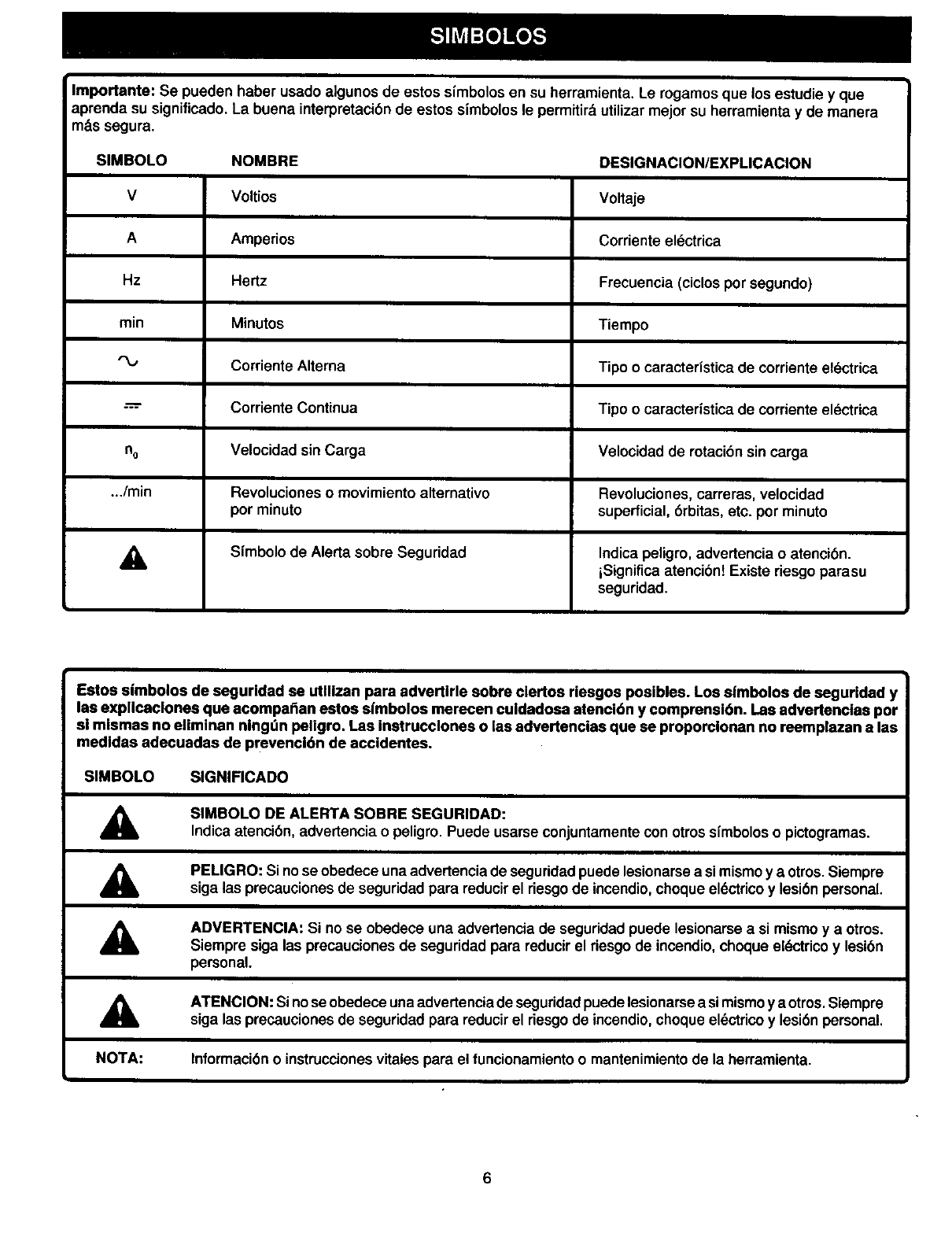
Importante:Sepuedenhaber usado algunos de estos simbolos en su herramienta. Le rogamos que los estudie y que
aprenda su significado.La buena interpretaci6n de estos simbolos le permitir_,utilizar mejor su herramienta y de manera
m_s segura.
SlMBOLO NOMBRE DESIGNACION/EXPLICAClON
V Voltios Voltaje
A Amperios Corriente el6ctrica
Hz Hertz Frecuencia (ciclos por segundo)
min Minutos Tiempo
Corriente Alterna Tipo o caracteristicade corriente el6ctrica
---=- Corriente Continua Tipo o caracteristicade corriente el_ctrica
no Velocidad sin Carga Velocidad de rotacibnsin carga
.../min Revoluciones o movimiento alternativo Revoluciones,carreras, velocidad
por minuto superficial,6rbitas, etc. per minuto
,_ S{mbolo de Alerta sobre Seguridad Indicapeligro, advertencia o atenci6n.
iSignifica atencibn! Existe riesgo parasu
seguridad.
Estos simbolos de seguridad se utlllzan para advertirle sobre clertos riesgos posibles. Los sfmbolos de segurldad y
las expllcaclones que acompanan estos s|mbolos merecen culdadosa atenci6n y comprensi6n. Las advertenclas por
si mlsmas no eliminan nlngdn peligro. Las instrucclones o las advertencias que se proporclonan no reemplazan a las
medldas adecuadas de prevenclbn de accidentes.
SIMBOLO SIGNIFICADO
ASIMBOLO DE ALEFrrA SOBRE SEGURIDAD:
Indica atencibn, advertenciao peligro. Puede usarse conjuntamentecon otros sfmboloso pictogramas.
,a, PELIGRO: Si no se obedece una adverteneia de seguridadpuede lesionarsea si mismoy aotros.Siempre
siga las precaucionesde seguridad para reducirel riesgode incendio,choque el6ctricoy lesibnpersonal.
,& ADVERTENClA: Si nose obedece una advertencia de seguridad puede lesionarse a si mismo ya otros.
Siempre siga las precaucionesde seguridadpara reducir el riesgode incendio, cheque el6ctricoy lesi6n
personal.
AATENClON: Si nose obedece una advertenciade seguridad puede lesionarsea si mismo yaotros.Siempre
siga las precaucionesde seguridad para reducirel desgo de incendio,choque el_ctricoy lesibnpersonal.
NOTA: Informacibn oinstrucciones vitalespara el funcionamiento o mantenimientode la herramienta.
6
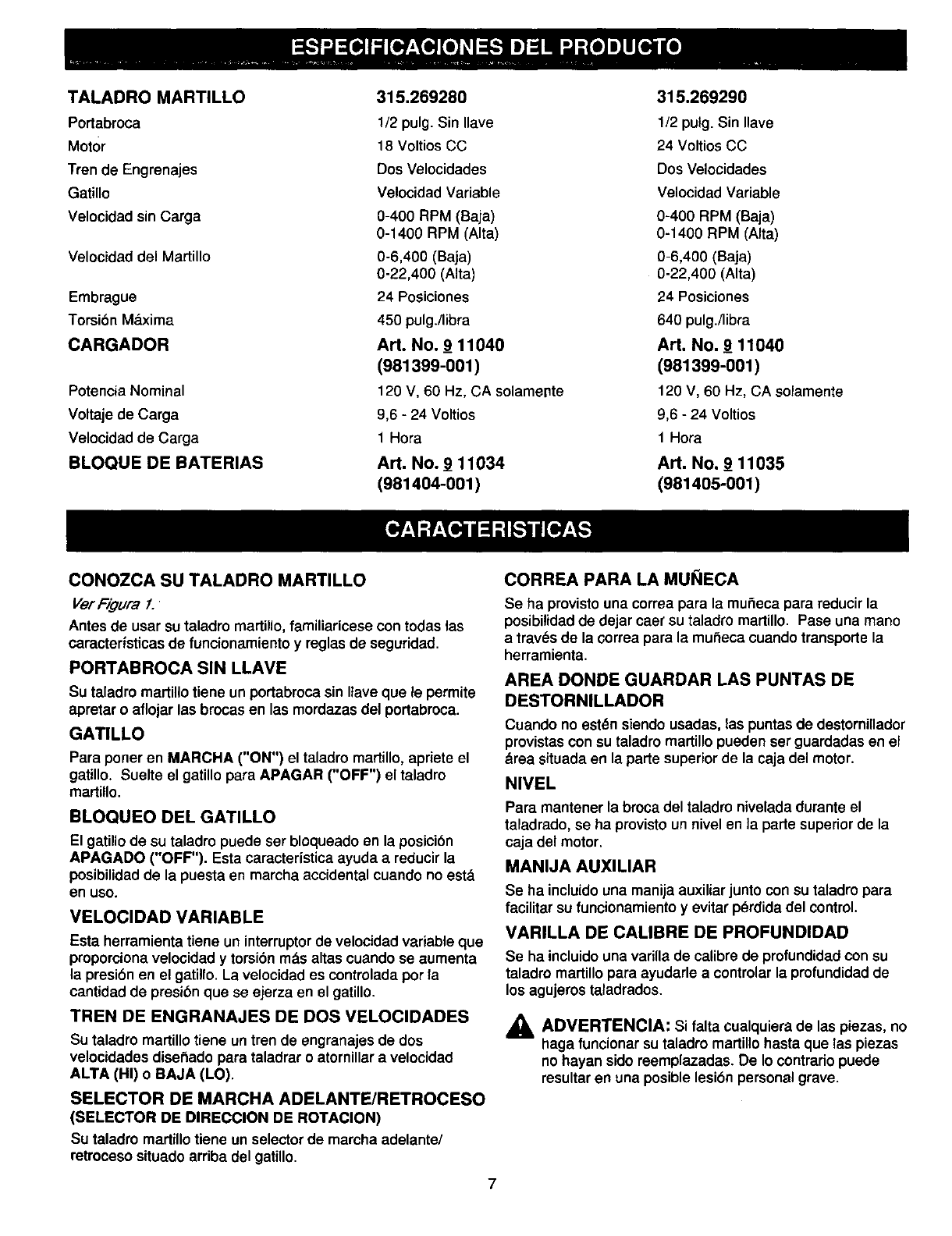
TALADRO MARTILLO
Portabroca
Motor
Tren de Engrenajes
Gatillo
Velocidad sin Carga
Velocidad del Martillo
Embrague
Torsi6n Ma.xima
CARGADOR
Potencia Nominal
Voltaje de Carga
Velecidad de Carga
BLOQUE DE BATERIAS
315.269280
1/2 pulg. Sin Ilave
18 Voltios CC
Dos Velocidades
Ve!ocidad Variable
0-400 RPM (Baja)
0-1400 RPM (Alta)
0-6,400 (Baja)
0-22,400 (Alta)
24 Posiciones
450 pulg./libra
Art. No. 9 11040
(981399-001 )
120 V, 60 Hz, CA solamer_te
9,6 - 24 Voltios
1 Hera
Art. No. 9 11034
(981404-001 )
315.269290
1/2 putg.Sin Ilave
24 VoltiosCC
Dos Velocidades
Velocidad Variable
0-400 RPM (Baja)
0-1400 RPM (Alta)
0-6,400 (Baja)
0-22,400 (Alta)
24 Posiciones
640 pulg./libra
Art. No. _911040
(981399-001 )
120 V, 60 Hz, CA solamente
9,6 - 24 Voltios
1 Hera
Art. No. _911035
(981405-001 )
CONOZCA SU TALADRO MARTILLO
VerFiguraI.
Antesde usarsu taladromartillo,familiaricesecon todaslas
caracterfsticasde funcionamientoy reglasde seguridad.
PORTABROCA SIN LLAVE
Su taladro martillotiene un portabrocasin Itaveque le permite
apretar oaflojar las brocas en las mordazas del portabroca.
GATILLO
Para poner en MARCHA ("ON") el taladro martillo,apriete el
gatillo. Suelte el gatillo para APAGAR ("OFF") el taladro
martillo.
BLOQUEO DEL GATILLO
El gatillo de su taladro puede ser bloqueadoen la posici6n
APAGADO ("OFF"). Esta caracteristicaayuda a reducirla
posibilidadde la puesta en marcha accidentalcuando no est,.
en use.
VELOCIDAD VARIABLE
Esta herramienta tiene un interruptorde velocidadvariable que
proporcionavelocidad y torsi6n mils altas cuandose aumenta
la presi6nen el gati!lo.La velocidad es controladapor la
cantidad de presi6n que se ejerza en el gatillo.
TREN DE ENGRANAJES DE DOS VELOCIDADES
Su taladro martillotiene untren de engranajes de dos
velocidadesdisehado para taladrar o atornillara velocidad
ALTA (HI) o BAJA (LO).
SELECTOR DE MARCHA ADELANTE/RETROCESO
(SELECTOR DE DIRECCION DE ROTAClON)
Su taladro martillotiene un selectorde marcha adelante/
retroceso situado arriba del gatillo.
7
CORREA PARA LA MUI_ECA
Se ha provisto una correa para la mufieca para reducirla
posibilidadde dejar caer su taladro martillo. Pase una mano
a tray,s de la correa para la mu_eca cuandotransporte la
herramienta.
AREA DONDE GUARDAR LAS PUNTAS DE
DESTORNILLADOR
Cuando noest_n siendo usadas, las puntas de destornillador
provistas con su taladro martillo pueden ser guardadas en el
&rea situada en la parte superior de la caja del motor.
NIVEL
Para mantener la broca del taladro nivelada durante el
taladrado, se ha provisto un nivel en la parte superior de la
caja del motor.
MANIJA AUXILIAR
Se ha incluidouna manijaauxiliarjunto consu taladropara
facilitar su funcionamiento y evitar p_rdida del control.
VARILLA DE CALIBRE DE PROFUNDIDAD
Se ha incluidouna varilla de calibre de profundidadcon su
taladro martillopara ayudarle a controlarla profundidadde
los agujeros taladrados.
,_ ADVERTENCIA: faltacualquiera las piezas, no
Si de
haga funcionar su taladro martillohasta que las piezas
no hayan side reemplazadas. De Io contrariopuede
resultar en una posible lesi6n personalgrave.
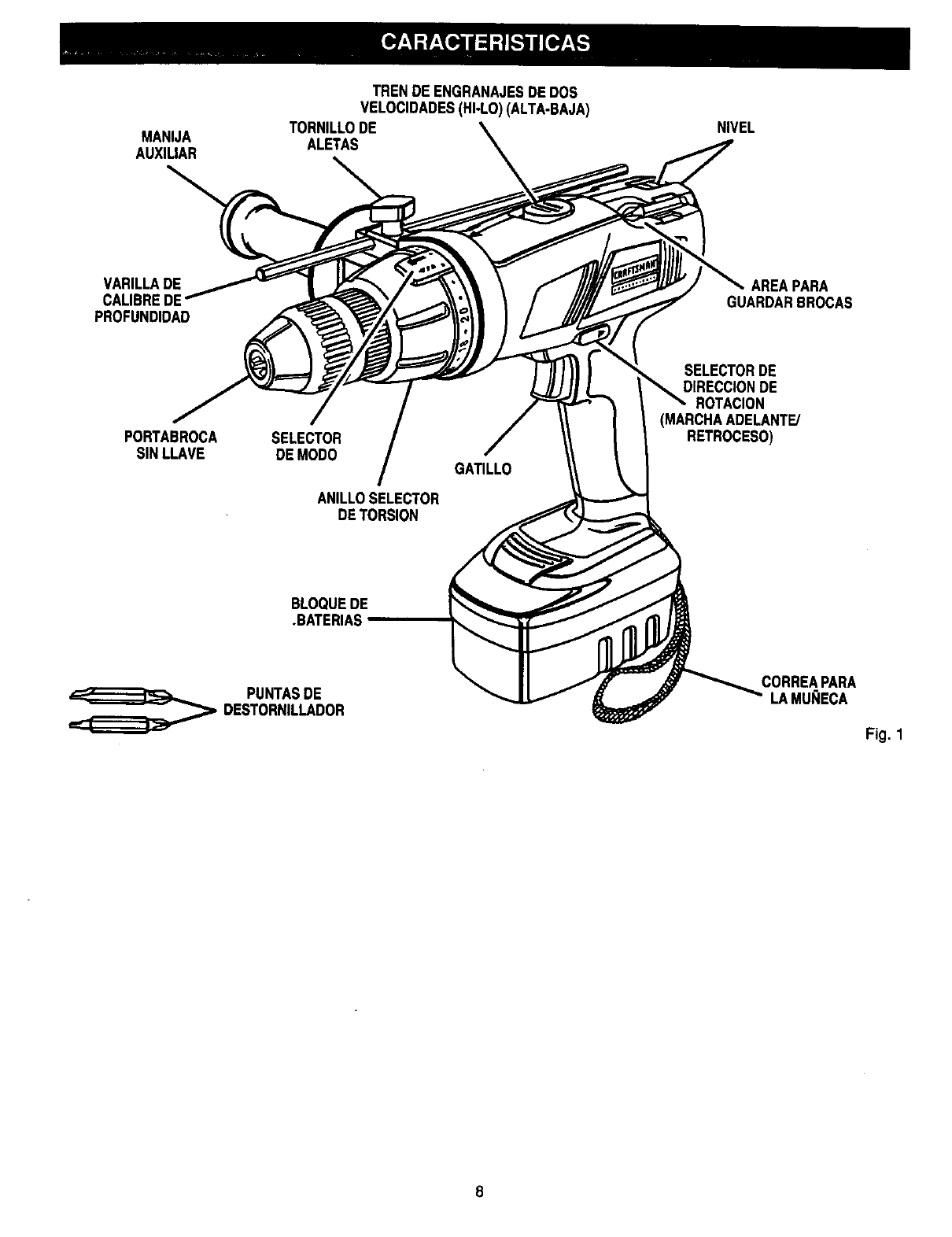
MANIJA
AUXIUAR
TRENDEENGRANAJESDEDOS
VELOCIDADES(HIoLO)(ALTA-BAJA)
TORNILLODE
ALETAS NIVEL
VARILLADE
CALIBREDE
PROFUNDIDAD GUARDARBROCAS
PORTABROCA
SINLLAVE SELECTOR
DE MODO
SELECTORDE
DIRECCIONDE
ROTACION
(MARCHAADELANT_
RETROCESO)
ANILLOSELECTOR
BLOQUEDE
.BATERIAS
PUNTASDE
DESTORNILLADOR
CORREAPARA
LAMUNECA
Fig. 1
8
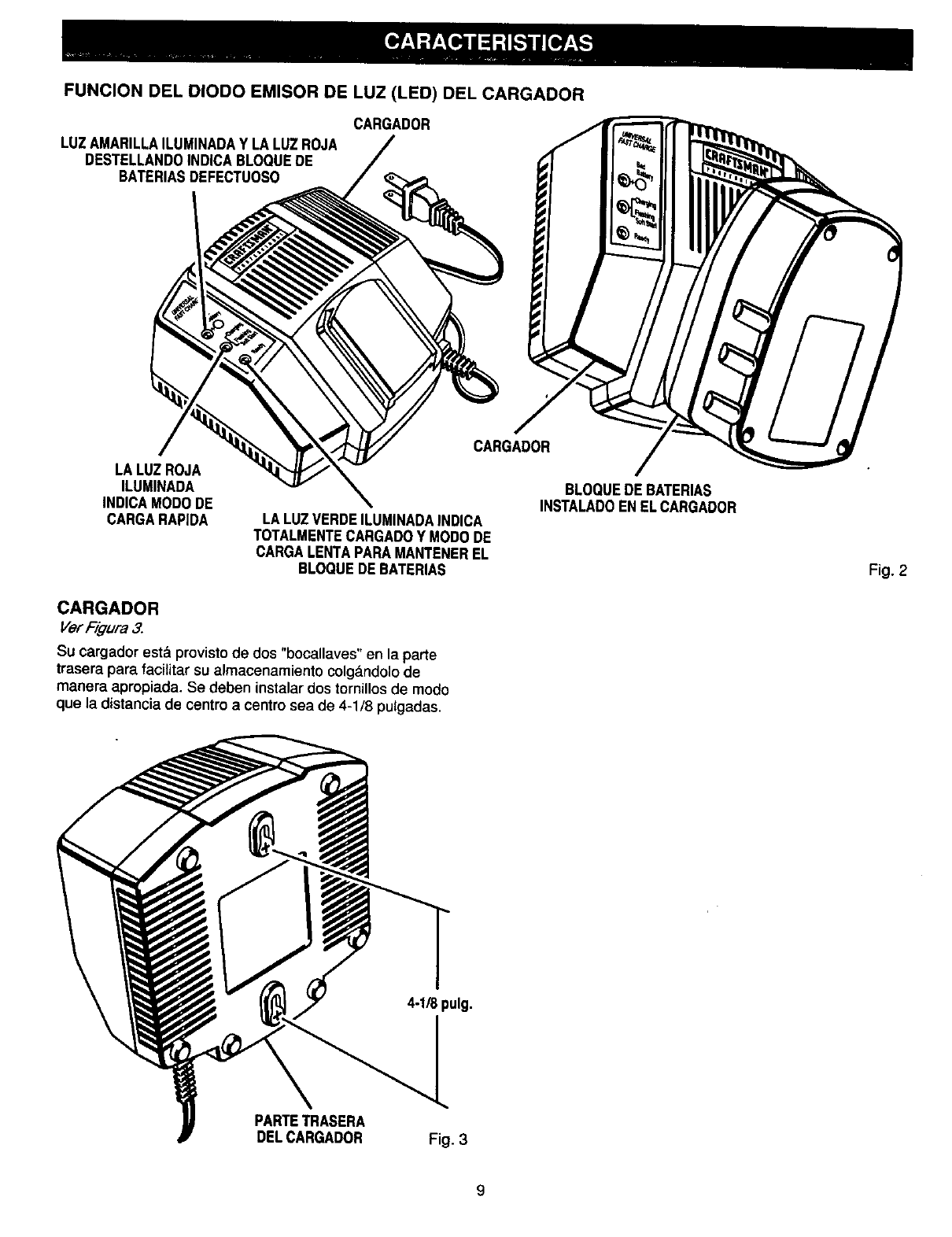
FUNCIONDELDIODOEMISORDE LUZ(LED) DELCARGADOR
CARGADOR
LUZAMARILLAILUMINADAY LA LUZROJA
DESTELLANDOINDIC/kBLOQUEDE
BATERIASDEFECTUOSO
LALUZ ROJA
ILUMINADA
INDICAMODODE
CARGARAPIDA
CARGADOR
LA LUZVERDEILUMINADAINDICA
TOTALMENTECARGADOYMODODE
CARGALENTAPARAMANTENEREL
BLOQUEDEBATERIAS
BLOQUEDE BATERIAS
INSTALADOEN ELCARGADOR
Fig. 2
CARGADOR
YerFigura3.
Su cargador est& provisto de dos "bocallaves"en la parte
trasera para facilitarsu almacenamiento colg_.ndolode
manera apropiada. Se deben instalar dos tornillosde modo
que la distancia de centro acentro sea de 4-1/8 pulgadas.
4-1/8 pulg.
PARTETRASERA
DELCARGADOR Fig. 3
9
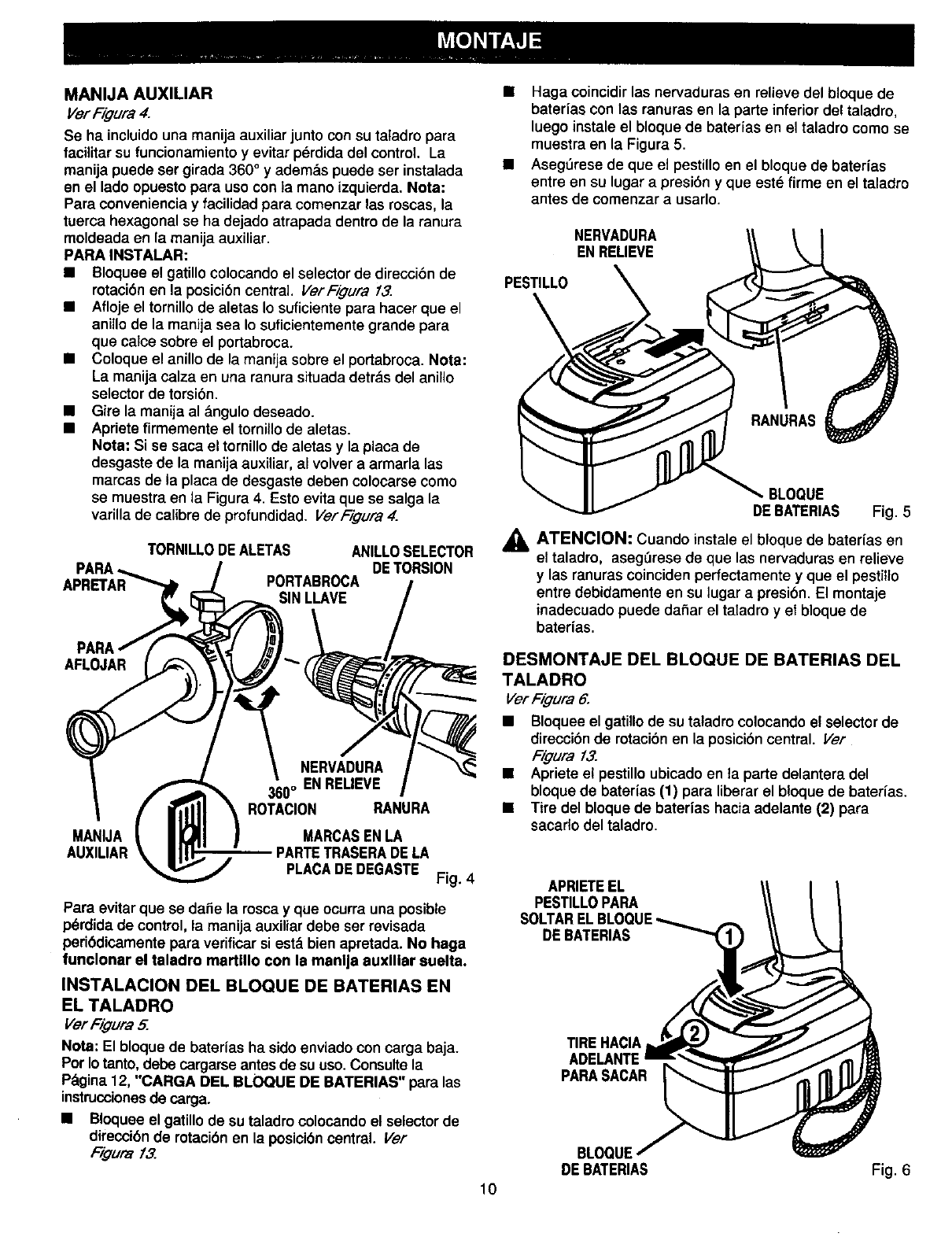
MANIJA AUXILIAR
Vet F/gura 4.
Se ha incluidouna manija auxiliar junto con su tatadro para
facilitar su funcionamiento y evitar p_rdida del control. La
manija puede ser girada 360° y adem&s puede ser instalada
an el lado opuestopara uso con ta rnanoizquierda. Nota:
Para convenienciay facilidad para comenzar las roscas, la
tuerca hexagonal se ha dejado atrapada dentrode la ranura
moldeada en la manija auxiliar.
PARA INSTALAR:
•Bloquee el gatillocolocandoel selector de direccibnde
mtaci6n en la posici6n central. VerF/gura f,Y..
•Aflojeel tornillode aletas Iosuficiente para hacer que el
anillo de la manija sea Io suficientemente grande para
que catcesobre el portabroca.
•Coloque el anillo de la manija sobre el portabroca. Nota:
La manija calza en una ranurasituada detr_.sdel anillo
selector de torsibn.
• Gire la manija al _ngulo deseado.
• Apriate firmemente el tornillo de aletas.
Nota: Si se saca el tornillo de aletas y la placa de
desgaste de la manija auxiliar, al volver a armada las
marcas de la placa de desgaste deben colocarse como
se muestra en la Figura 4. Esto evita que se salga la
varilla de calibrede profundidad. VefFigufm 4.
APRETAR
TORNILLODEALETAS ANILLOSELECTOR
DETORSION
PORTABROCA
SINLLAVE
PARA
AFLOJAR
NERVADURA
EN RELIEVE
360°
ROTACION RANURA
MANIJA
AUXILIAR MARCASENLA
PARTETRASERADELA
PLACADE DEGASTE Fig. 4
Para evitarque se dafie la rosca y que ocurra una posible
p_rdida de control, la manija auxiliar debe ser revisada
peri6dicamente para verificar si est& bien apretada. No haga
funclonar el taladro martlllo con la manlJaauxlllar suelta.
INSTALACION DEL BLOQUE DE BATERIAS EN
EL TALADRO
Ver Figura 5.
Nota: El bloque de baterias ha sidoenviado con carga baja.
Por Iotanto,debe cargarseantes de su uso. Consultela
P&gina12, "CARGA DEL BLOQUE DE BATERIAS" para las
instruccionesde carga.
•Bloquee el gatillo de su taladrocolocandoel selector de
direccibnde rotacibnen la posicibncentral. Vet
F/gum ,'3.
• Haga coincidir las nervaduras en relieve del btoque de
baterias con las ranuras en la parte inferior de! taladro,
luego instale el bloque de baterias en el taladro como se
muestra en la Figura 5.
• Asegt_rese de que el pestillo en el bloque de baterfas
entre en su lugar a presi6n y que este firme en el taladro
antes de comenzar a usarlo.
NERVADURA
EN RELIEVE
PESTILLO
BLOQUE
DE BATERIAS Fig. 5
_k ATENCION: Cuando instale el bloque de batedas en
el taladro, aseg_rese de que las nervaduras en relieve
ylas ranuras coincidenparfectamente y que el pestitio
entre debidamente en su lugar a presibn. El montaje
inadecuado puede dafiar el tatadro y el bloque de
baterias.
DESMONTAJE DEL BLOQUE DE BATERIAS DEL
TALADRO
Per Figura 6.
•Bloquee el gatillode su taladm colocandoel selector de
direccibnde rotacibnan la posici6ncentral. Per
F/gura 13.
•Apriete el pestilloubicado en la parta dalantera del
bloque de baterias (1) para liberar el bloque de batarias.
•Tire del bloqua de baterias hacia adelante (2) para
sacarlo del taladro.
APRIETEEL
PESTILLOPARA
DE BATERIAS
TIREHACIA
ADELANTE
PARASACAR
lO
BLOQUE
DE BATERIAS Fig. 6
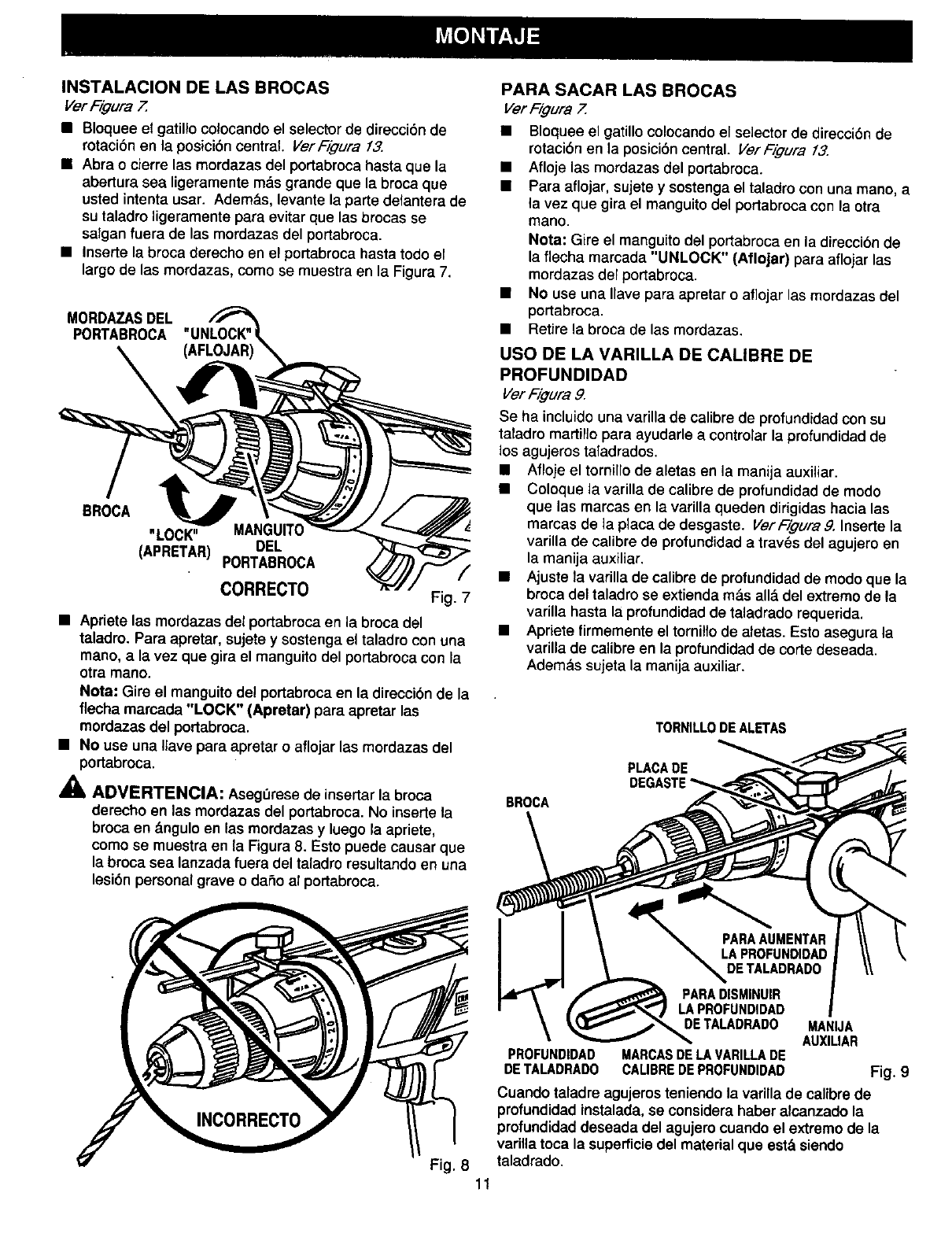
INSTALACIONDELAS BROCAS
Vet Figura Z
•Bloquee el gatillocolocandoel selector de direccibnde
rotaci6nee la posici6ncentral. VerFiQura 13.
•Abra o cierre las mordazas del portabrocahasta que la
abertura sea ligeramente m_s grande que la broca que
usted intenta usar. Adem_s, levante la parte delantera de
su taladro ligeramente para evitarque las brocas se
salgan fuera de las mordazas del portabroca.
•Inserte la broca derecho en el portabrocahasta todo el
largode las mordazas, como se muestra en la Figura 7.
MORDAZASDEL
PORTABROCA
BROCA
"LOCK" MAN
(APRETAR) DEL
PORTARROCA
CORRECTO Fig. 7
•Apriete las mordazas del portabrocaen la broca dal
taladro. Para apretar, sujete y sostenga el taladro con una
mano, a la vez que gira el manguito del portabrocacon la
otra mano.
Nota" Gire el manguito del portabrocaen la direccibnde la
flecha marcada "LOCK" (Apretar) para apretar las
mordazas del portabroca.
•No use una Ilave para apretar o aflojarlas mordazas del
portabroca.
,_ ADVERTENCIA: Aseg_rese de insertar la broca
deracho en las mordazas del portabroca. No inserte la
broca en _.ngulo en las mordazas y luego la apriete,
como se muestra en la Figura 8. Esto puede causar que
la broca sea lanzada fuera del taladro resultandoen una
lesi6n personal grave o da_o al portabroca.
Fig. 811
PARA SACAR LAS BROCAS
Vet F/gura 7.
•Bloquee el gatillo colocandoel selector de direcci6n de
rotaci6nen la posici6ncentral. VerF/_oura13.
•Afloje las mordazas del portabroca.
•Para aflojar, sujete y sostanga el taladro con una mano, a
{a vez que gira el manguito del portabrocacon la otra
mano.
Nota: Gire el manguito del portabroca en la direccibn de
la flecha marcada "UNLOCK" (Aflojar) para aflojar las
mordazas del portabroca.
• No use una Ilave para apretar o aflojar las mordazas del
portabroca.
• Retire la broca de las mordazas.
USO DE LA VARILLA DE CALIBRE DE
PROFUNDIDAD
Vet F/gura 9.
Se ha incluidouna varilla de calibre de profundidadcon su
taladro martillopara ayudarle a controlarla profundidadde
los agujeros taladrados.
•Aflojeel tornillo de aletas en la manija auxiliar.
•Coloque la varilla de calibre de profundidadde modo
que las marcas en la varillaqueden dirigidas hacia las
marcas de la placa de desgasta. VerF/qura 9. Inserte la
varilla de calibre de profundidad a travbs del agujero en
la manija auxiliar.
•Ajuste la varillade calibrede profundidadde modo que la
broca del taladro se extienda m&s all_,del extremo de la
varilla hasta la profundidadde taladrado requerida.
•Apriete firmemente el torniltode aletas. Esto asegura la
varilla de calibre en la profundidadde cortedeseada.
Adem_s sujeta la manija auxiliar.
TORNILLODEALETAS
PLACADE
BROCA
_ _ PARAAUMENTAR
_LAPROFUNDIDAD
_DE TALADRADO
__ PARADISMINUIR
_J LAPROFUNDIDAD j
PROFUNDIDAD MARCASDELAVARILLADE
DETALADRADO CALIBREDEPROFUNDIDAD Fig. 9
Cuando taladre agujeros teniendo la varillade calibrede
profundidadinstalada,se considara haber alcanzado la
profundidaddeseada del agujero cuando el extreme de la
varilla toca la superficiedel material que est&siendo
taladrado.
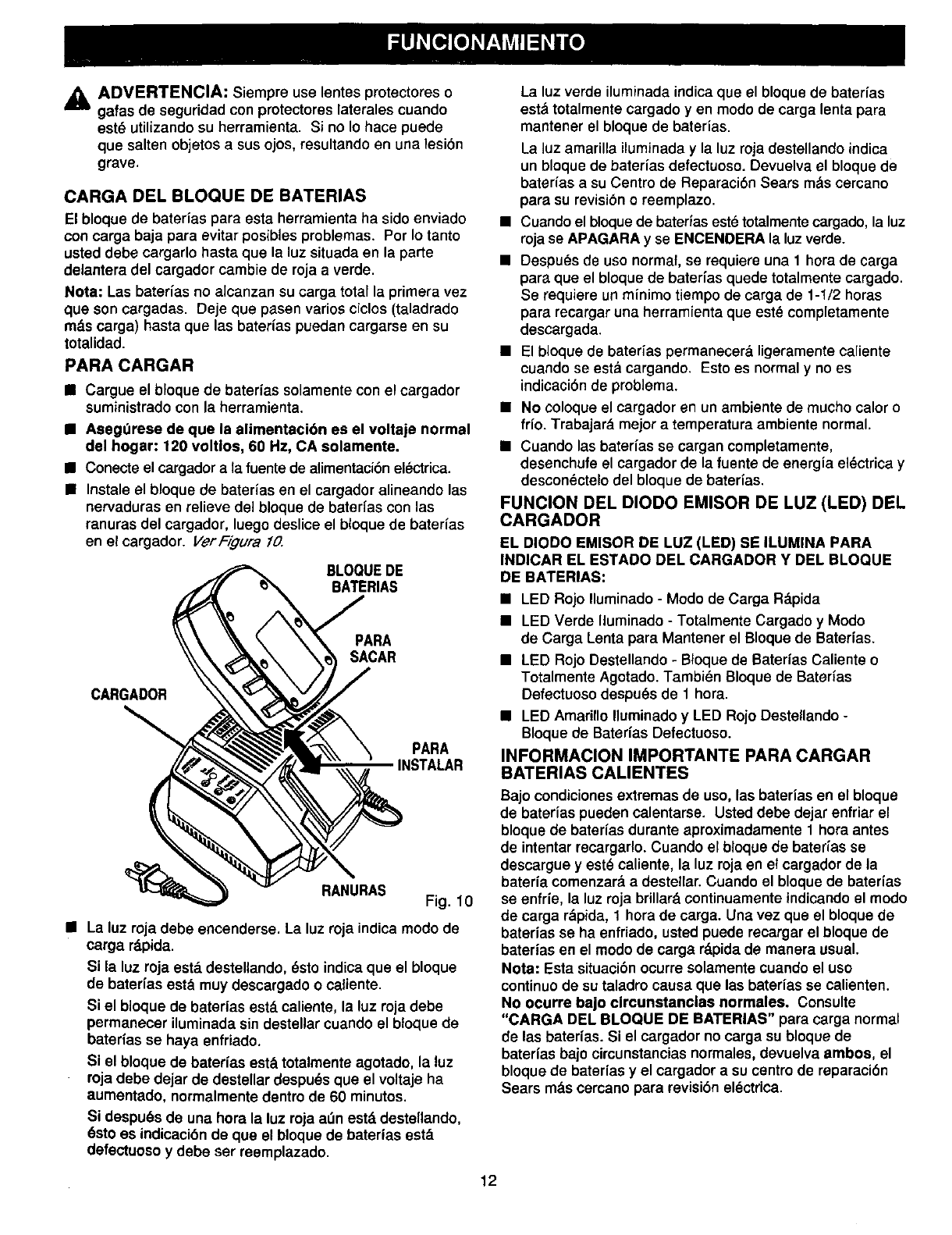
,_ ADVERTENCIA: Siempre use lentes protectores o
gafas de seguridad con protectores laterales cuando
est_ utilizando su herramienta. Si no Io hace puede
que salten objetos asus ojos, resultando en una lesion
grave.
CARGA DEL BLOQUE DE BATERIAS
El bloque de baterias para esta herramienta ha sido enviado
con carga baja para evitar posibles problemas. Por Io tanto
usted debe cargarlo hasta que la luz situada en la parte
deiantera del cargador cambie de roja a verde.
Nora: Las baterias no alcanzan su carga total la primera vez
que son cargadas. Deje que pasen varios ciclos (taladrado
m_.scarga) hasta que las baterias puedan cargarse en su
totalidad.
PARA CARGAR
II Cargue el bloque de baterias solamente con el cargador
suministrado con la herramienta.
•Asegdrese de que la alimentacidn es el voltaje normal
del hogar: 120 voltlos, 60 Hz, CA solamente.
• Conecte el cargador a la fuente de alimentaci0nel0ctrica.
• Instale el bloque de baterias en el cargador alineando las
nervaduras en relieve del bloque de baterias con las
ranuras del cargador, luego deslice el bloque de baterias
en el cargador. VerF/gura lO.
BLOQUEDE
BATERIAS
CARGADOR
PARA
SACAR
PARA
INSTALAR
RANURAS Fig. 10
• La luz roja debe encenderse. La luz roja indica modo de
carga r&pida.
Si la luz roja est,. destellando, 0sto indica que el bloque
de baterias est& muy descargado o caliente.
Si el bloque de baterias est,. caliente, la luz roja debe
permanecer iluminada sin destellar cuando el bloque de
baterias se haya enfriado.
Si el bloque de baterias est_ltotalmente agotado, la luz
roja debe dejar de destellar despu0s que el voltaje ha
aumentado, normalmente dentro de 60 minutos.
Si despu0s de una hora la luz roja aen est& destellando.
6sto es indicacibnde que el bloque de baterias est,.
defectuoso y debe ser reemplazado.
La luz verde iluminada indica que el bloque de baterias
est_l totalmente cargado yen modo de carga lenta para
mantener el bloque de baterias.
La luz amarilla iluminada y la luz roja destellando indica
un bloque de baterias defectuoso. Devuelva el bloque de
baterias a su Centro de Reparaci0n Sears m&s cercano
para su revision o reemplazo.
• Cuando el bloque de baterias est0 totalmente cargado, la luz
roja se APAGARA y se ENCENDERA la luz verde.
• Despu0s de uso normal, se requiere una 1 hora de carga
para que el bloque de baterfas quede totalmente cargado.
Se requiere un minimo tiempo de carga de 1-1/2 horas
para recargar una herramienta que est0 completamente
descargada.
• El bloque de baterias permanecerd ligeramente caliente
cuando se est_l cargando. Esto es normal y no es
indicaci0n de problema.
• No coloque el cargador en un ambiente de mucho calor o
frio. Trabajar& mejor a temperatura ambiente normal.
• Cuando las baterias se cargan completamente,
desenchufe el cargador de la fuente de energia el0ctrica y
desconectelo del bloque de baterias.
FUNCION DEL DIODO EMISOR DE LUZ (LED) DEL
CARGADOR
EL DIODO EMISOR DE LUZ (LED) SE ILUMINA PARA
INDICAR EL ESTADO DEL CARGADOR Y DEL BLOQUE
DE BATERIAS:
• LED Rojo Iluminado- Modo de Carga R_.pida
• LED Verde Iluminado - Totalmente Cargado yMode
de Carga Lenta para Mantener el Bloque de Baterias.
• LED Rojo Destellando - BIoque de Baterias Caliente o
Totalmente Agotado. Tambi0n Bloque de Baterias
Defectuoso despu0s de 1 hora.
• LED Amarillo Iluminado y LED Rojo Destellando -
Bloque de Baterias Defectuoso.
INFORMAClON IMPORTANTE PARA CARGAR
BATERIAS CALIENTES
Bajo condicionesextremas de uso, las baterias en el bloque
de baterias pueden calentarse. Usted debe dejar enfriar el
bloque de baterias durante aproximadamente 1 hora antes
de intentar recargarlo. Cuando el bloque de baterias se
descargue y est0 caliente, la luz roja en et cargador de la
bateria comenzar& a destellar. Cuando el bloque de baterias
se enfrie, la luz roja brillar&continuamente indicandoel modo
de carga r&pida,1 hora de carga. Una vez que el bloque de
baterias se ha enfriado, usted puede recargar el bloque de
baterias en el modo de carga r&pidade manera usual.
Nota: Esta situacibnocurre solamente cuando el uso
continuode su taladro causa que lasbaterias se calienten.
No ocurre bajo circunstanclas normales. Consulte
"CARGA DEL BLOQUE DE BATERIAS" para carga normal
de las baterias. Si el cargador no carga su bloque de
baterlas bajo circunstanciasnormales, devuelva ambos, el
bloque de baterias y el cargador a su centro de reparaci0n
Sears m_.scercano para revision el0ctrica.
12
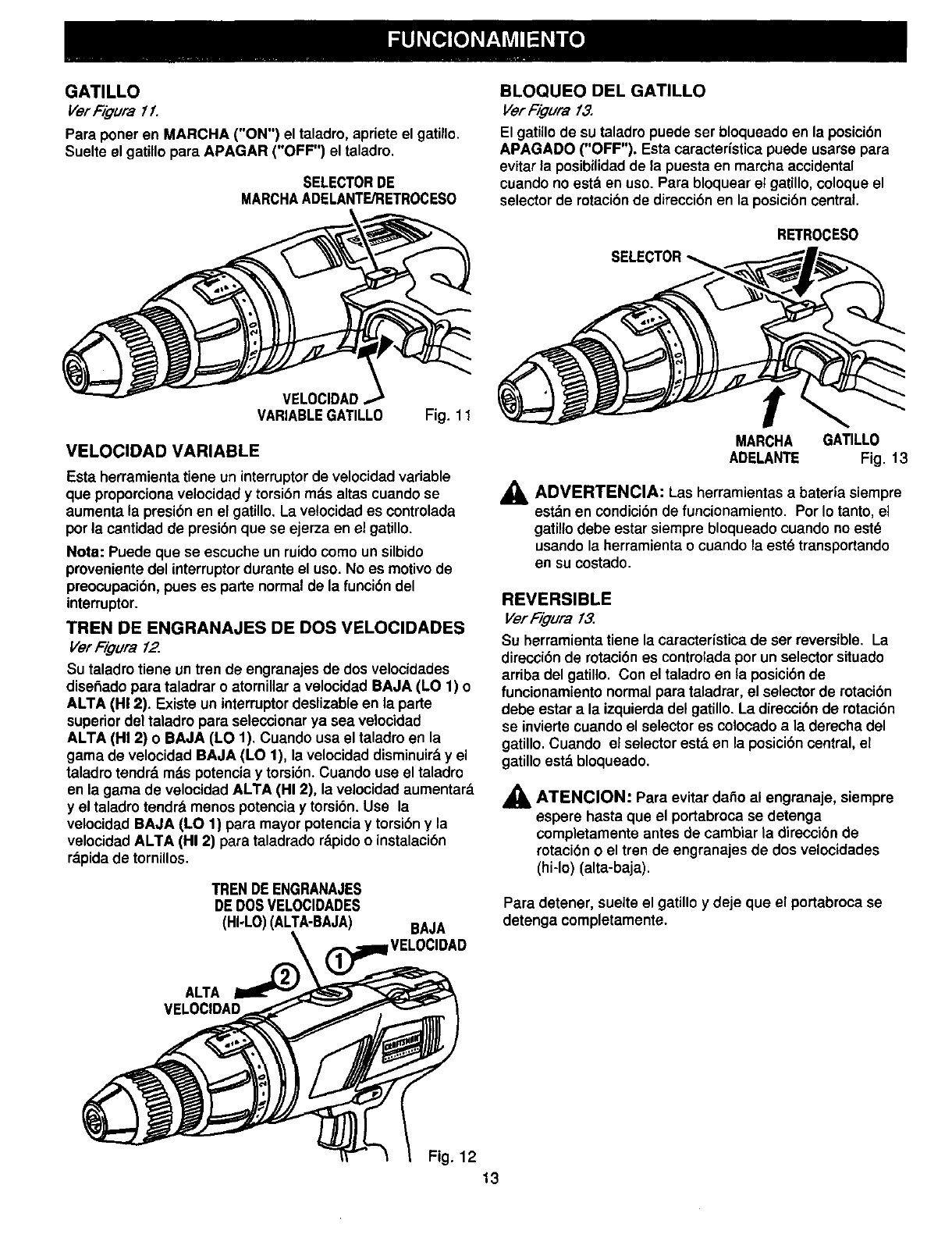
GATILLO
Vet Figure II.
Para poner en MARCHA ("ON") el taladro, apriete el gatiIlo.
Suelte el gatillo para APAGAR ("OFF") el taladro.
SELECTORDE
MARCHAADELANTFJRETROCESO
VELOCIDAD
VARIABLEGATILLO Fig. 11
VELOCIDAD VARIABLE
Esta herramienta tiene un interrupterde velocidadvariable
que proporcionavelocidad ytorsibnm&s altas cuando se
aumenta la presibn en el gatillo.La velocidad es controlada
por la cantidad de presibn que se ejerza en el gatillo.
Nota: Puede que se escuche un ruido como un silbido
provenientedel interruptordurante el uso. No es motivode
preocupacibn, pues es parte normal de la funcibn del
interruptor.
TREN DE ENGRANAJES DE DOS VELOCIDADES
VetFigura12.
Su taladrotieneun trende engranajesde dos velocidades
dise_adoparataladraroatornillara velocidadBAJA (LO 1)o
ALTA (HI2).Existeun interruptordeslizableen laparte
superiordeltaladroparaseleccionarya seavelocidad
ALTA (HI2)o BAJA (LO I).Cuando usa eltaladroen la
gama de velocidadBAJA (LO I),lavelocidaddisminuir_y el
taladrotendr_,m._spotenciay torsi6n.Cuando use eltaladm
en lagama de velocidadALTA (HI2),lavelocidadaumentar_.
yeltaladrotendr_menos potenciaytorsion.Use la
velocidadBAJA (LO I)paramayor potenciay torsiony la
velocidadALTA (HI2)parataladrador_pidoo instalaci6n
r_pidade tornillos.
TREN DEENGRANAJES
DE DOSVELOCIDADES
(HI.LO)(ALTA-BAJA) BAJA
VELOCIDAD
BLOQUEO DEL GATILLO
Ver Figure 13,
El gatillode su taladro puede ser bloqueado en la posicibn
APAGADO ("OFF"). Esta caractedstica puede usarse para
evitar la posibilidadde la puesta en marcha accidental
cuando no est& en uso. Para bloquearetgatillo, coloque el
selector de rotacibnde direccibnen la posicibncentral.
SELECTOR_
RETROCESO
MARCHA GATILLO
ADELANTE Fig. 13
,_, ADVERTENCIA: herramientas asiempre
Las bateria
est_n en condici6nde funcionamiento. Por Io tanto, el
gatillo debe estar siempre bloqueado cuando no est_
usando la herramienta o cuando la est_ transportando
en su costado.
REVERSIBLE
VerFigura13.
Su herramientatienelacaracteristicade serreversible.La
directionde rotaciOnes controladaporun selectorsituado
arribadelgatillo.Con eltaladroen laposici6nde
funcionamientonormalparataladrar,elselectorde rotaci6n
debe estarala izquierdadelgatillo.La direcciOnde rotacibn
seinviertecuando elselectores colocadoala derechadel
gatillo.Cuando elselectorest&en laposicibncentral,el
gatilloest,.bloqueado.
_i, ATENCION: Para evitar da_o al engranaje, siempre
espere hasta que el portabroca se detenga
completamente antes de cambiar la direcci6n de
rotaci6no el tren de engranajes de dos velocidades
(hi-lo) (alta-baja).
Para detener, suelte el gatillo y deje que el portabroca se
detenga completamente.
ALTA
VELOCIDAD
Fig. 12
13
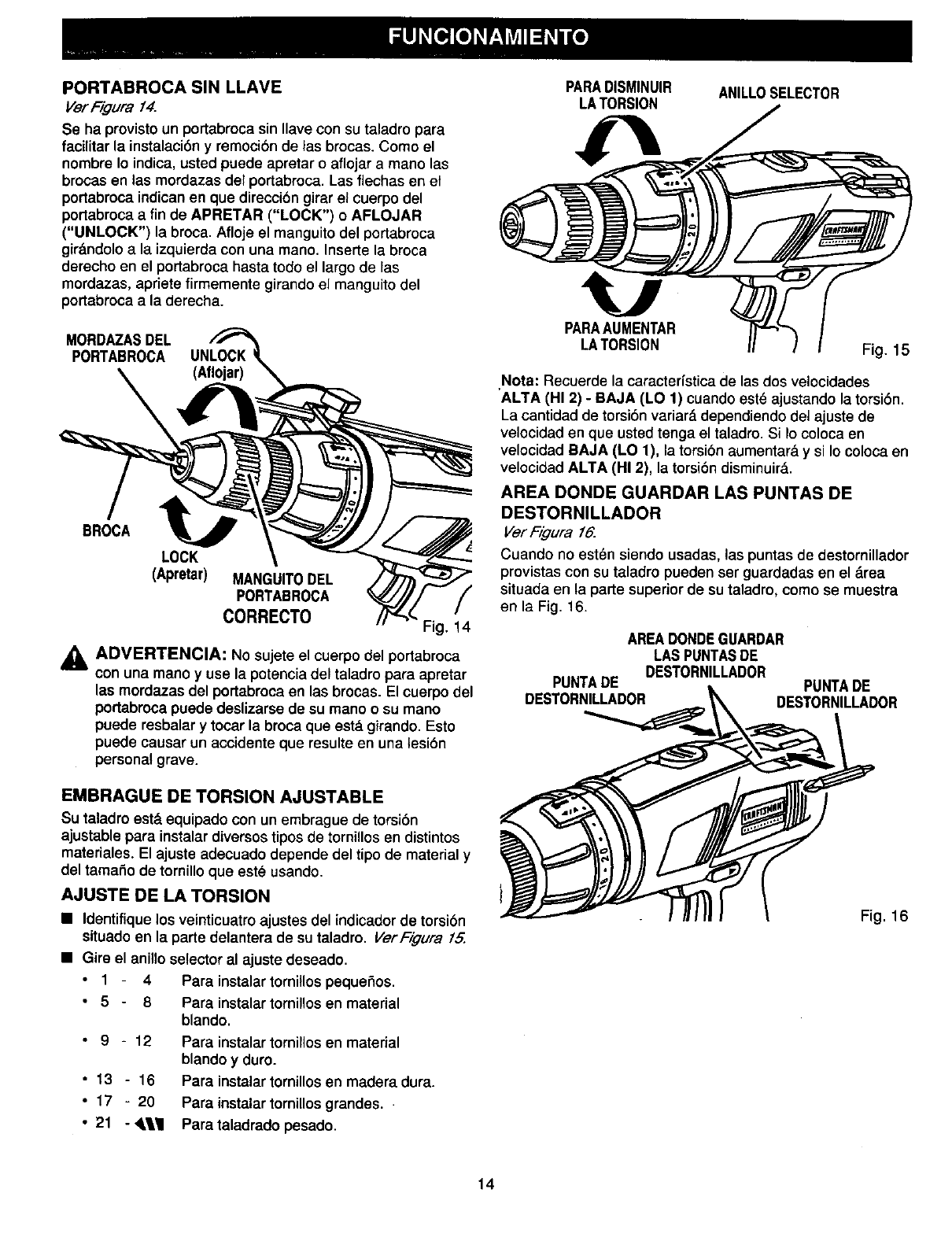
PORTABROCA SIN LLAVE
Vet Figura 14.
Se ha provistoun portabrocasin Ilavecon su taladro para
facilitar la instalacibny remocibnde las brocas.Como el
nombre Io indica, usted puede apretar o aflojara mano las
brocas en las mordazasdel portabroca. Lasflechas en et
portabmca indican en que direcci6n girar el cuerpodel
portabrocaa fin de APRETAR ("LOCK") o AFLOJAR
("UNLOCK") la broca. Afloje el manguitodel portabroca
gir&ndoloa la izquierda con una mano. Insertsla broca
derecho en el portabrocahasta todo el largo de las
mordazas, apriete firmemente girandoel manguito del
portabrocaa la derecha.
MORDAZASDEL
PORTABROCA
BROCA
LOCK
(Apretar) MANGUITODEL
PORTABROCA
CORRECTO Fig, 14
_1= ADVERTENCIA: NOsujete el cuerpo del portabroca
con una mano y use la potenciadel taladro para apretar
las mordazas del portabrocaen las brocas. El cuerpo del
portabrocapuede deslizarse de su mano o su mano
puede resbalary tocar la broca que est,. girando. Esto
puede causar un accidente que resulte en una lesibn
personal grave.
EMBRAGUE DE TORSION AJUSTABLE
Su taladro est& equipado con un embrague de torsibn
ajustable para instalar diversos tipos de tornillos en distintos
materiales. El ajuste adecuado depende del tipo de material y
del tamaho de tornillo que este usando.
AJUSTE DE LA TORSION
•Identifique losveinticuatroajustes del indicadorde torsibn
situadoen la parte delantera de su taladro. VerFigura 15.
•Gire el anillo selector al ajustedeseado.
•1 - 4 Parainstalar tornillospequeSos.
•5 - 8 Parainstalar tornillosen material
blando.
•9 - 12 Para instalartornillosen material
blando y duro.
•13 - 16 Para instalartornillosen madera dura.
•17 -20 Para instalartornillosgrandes.
•21 - ,11 Para taladrado pesado.
PARADISMINUIR
LATORSION ANILLOSELECTOR
PARAAUMENTAR
LATORSION Fig. 15
Nota: Recuerde la caracter[stica de las dos velocidades
ALTA (HI 2) - BAJA (LO 1) cuandoest_ ajustando la torsibn.
La cantidadde torsibnvariar&dependiendo del ajuste de
velocidad en que ustedtenga el taladro. Si Io colocaen
velocidad BAJA (LO 1), la torsibnaumentar& ysi Iocoloca en
velocidad ALTA (HI 2), la torsibndisminuir&.
AREA DONDE GUARDAR LAS PUNTAS DE
DESTORNILLADOR
Vet Figura lG.
Cuando no est6n siendo usadas, las puntas de destomillador
provistas con su taladro pueden ser guardadas en el &rea
situada en la parte superior de su taladro, como se muestra
en la Fig. 16,
AREADONDEGUARDAR
LASPUNTASDE
DESTORNILLADOR
PUNTADE PUNTADE
DESTORNILLADOR DESTORNILLADOR
Fig. 16
14
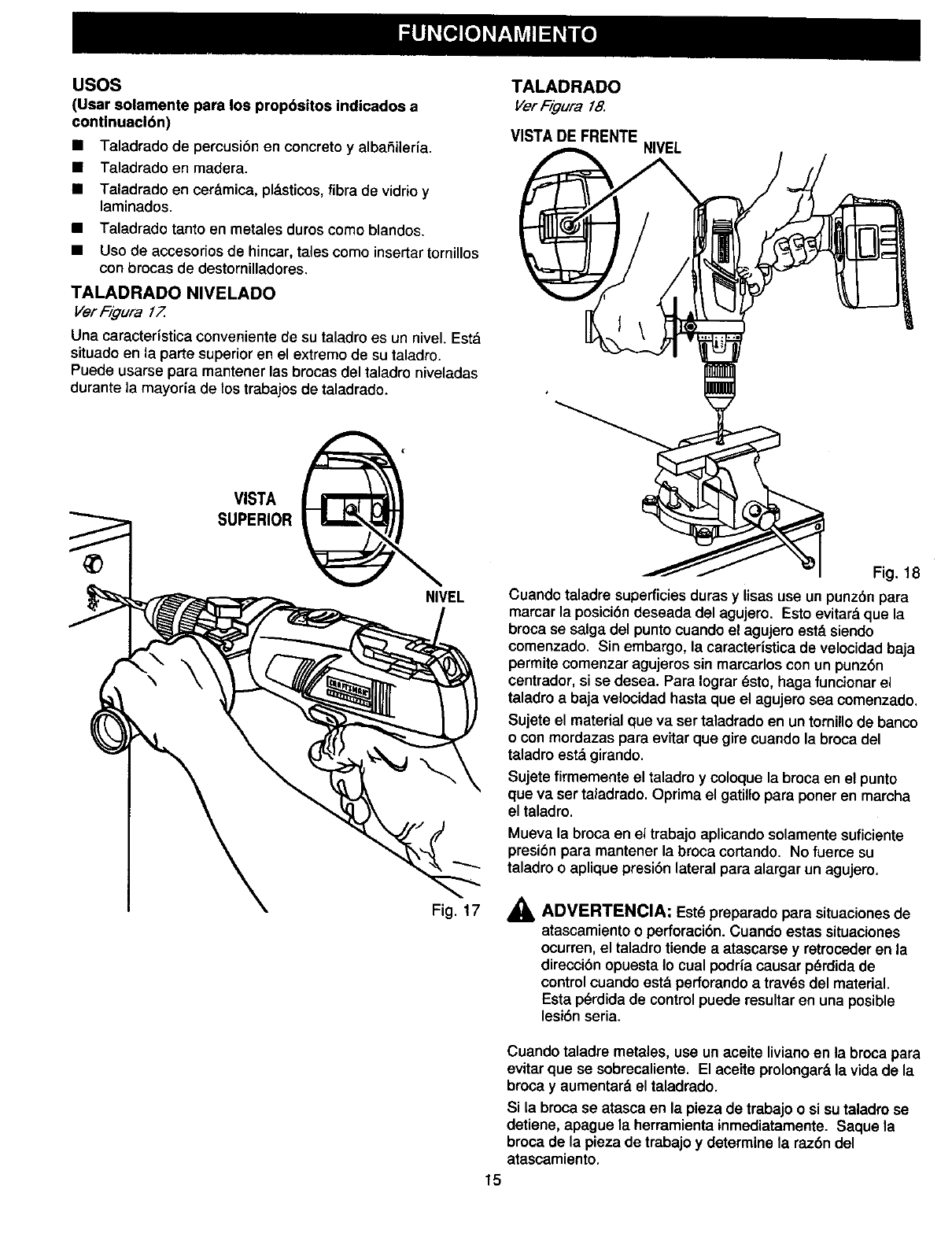
USOS
(Usar solamente para los propbsitos indicados a
oontlnuaclbn)
• Taladrado de percusibn en concreto y albafiileria.
•Taladrado en madera.
•Taladrado en cer&mica,pl_.sticos,fibra de vidrioy
laminados.
•Taladrado tanto en metales duroscomo blandos.
•Uso de accesoriosde hincar,tales como insertartornillos
con brocas de destornilladores.
TALADRADO NIVELADO
Vet _gura IZ
Una caracteristicaconveniente de su taladro es un nivel. Estb
situadoen la parte superioren el extremode su taladro.
Puede usarse para mantener las brocas del taladro niveladas
durante la mayoria de los trabajos de taladrado.
VISTA
SUPERIOR
NIVEL
TALADRADO
Vet F/_?ura18.
VISTA DE FRENTE NIVEL
L _ Fig. 18
Cuando taladre superficies duras y lisas use un punz6n para
marcar la posici6n deseada del agujero. Esto evitar& que la
broca se salga del punto cuando el agujero est& siendo
comenzado. Sin embargo, la caracteristica de velocidad baja
permite comenzar agujeros sin marcarlos con un punz6n
centrador, si se desea. Para Iograr _sto, haga funcionar el
taladro a baja velocidad hasta que el agujero sea comenzado.
Sujete el material que va ser taladrado en un tornillo de banco
o con mordazas para evitar que gire cuando la broca del
taladro est,. girando.
Sujete firmemente el taladro y coloque la broca en el punto
que va ser taladrado. Oprima el gatillo para poner en marcha
el taladro.
Mueva la broca en el trabajo aplicando solamente suficiente
presibn para mantener la broca cortando. No fuerce su
taladro o aplique presi6n lateral para alargar un agujero.
Fig. 17 _, ADVERTENCIA: Est_ preparado para situaciones de
atascamientoo perforacibn. Cuando estas situaciones
ocurren, el taladrotiende a atascarse y retrocederan la
direcci6n opuesta Io cual podria causar p_rdida de
controlcuando esta perforandoa trav_s del material.
Esta p_rdida de controlpuede resultaren una posible
lesibnseria.
Cuando taladre metales, use un aceite liviano en la broca para
evitar que se sobrecaliente. El aceite prolongar& la vida de la
broca y aumentar& el taladrado.
Si ia broca se atasca en la pieza de trabajo o si su taladro se
detiene, apague la herramienta inmediatamente. Saque la
broca de la pieza de trabajo y determine la raz6n del
atascamiento.
15
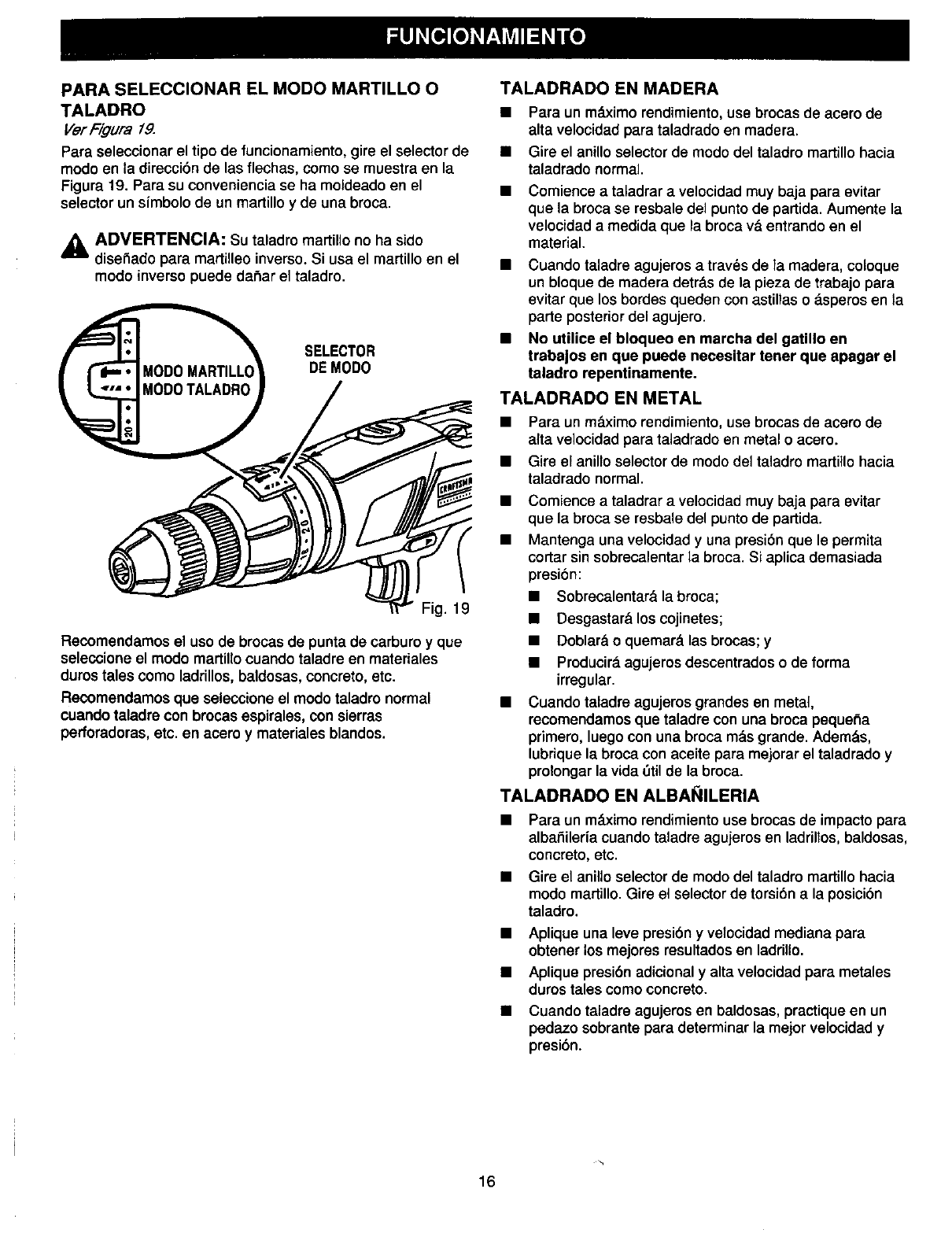
PARA SELECCIONAR EL MODO MARTILLO O
TALADRO
VerFigura19.
Para seleccionar el tipo de funcionamiento, gire el selector de
modo en la direcci6n de las flechas, como se muestra en la
Figura 19. Para su conveniencia se ha moldeado en el
selector un simbolo de un martillo y de una broca.
,_ ADVERTENClA: Su taladro martillo no ha sido
diseSado para martilleo inverso. Si usa el martillo en el
modo inversopuede daSar el taladro.
SELECTOR
DE MODO
Fig. 19
Recomendamos el uso de brocas de punta de carburo y que
seleccione el modo martillo cuando taladre en materiales
duros tales como ladrillos, baldosas, concreto, etc.
Recomendamos que seleccione el modo taladro normal
cuando taladre con brocas espirales, con sierras
perforadoras, etc. en acero y materiales blandos.
TALADRADO EN MADERA
• Para un m_.ximorendimiento, use brocas de acero de
alta velocidad para taladrado en madera.
• Gire el anilloselector de modo del taladro martillohacia
taladrado normal.
Comience a taladrar avelocidad muy baja para evitar
que la broca se resbale del punto de partida. Aumente la
velocidad a medida que la broca v& entrando en el
material.
• Cuando taladre agujeros a trav6s de la madera, coloque
un bloque de madera detr&s de la pieza de trabajo para
evitar que los bordes queden con astinas o _.speros en la
parte posterior del agujero.
•No utilice el bloqueo en marcha del gatillo en
trabajos en que puede necesitar tener que apagar el
taladro repentinamente.
TALADRADO EN METAL
• Para un m&ximo rendimiento, use brocas de acero de
alta velocidad para taladrado en metal o acero.
• Gire el anilto selector de modo del taladro martillo hacia
taladrado normal.
Comience a taladrar a velocidad muy baja para evitar
que la broca se resbale del punto de partida.
Mantenga una velocidad y una presibn que le permita
cortar sin sobrecalentar la broca. Si aplica demasiada
presi6n:
• Sobrecalentar& la broca;
• Desgastar& los cojinetes;
•Doblar&o quemar_, las brocas; y
• Producira.agujeros descentrados o de forma
irregular.
• Cuando taladre agujeros grandes en metal,
recomendamos que taladre con una broca pequeSa
primero, luego con una broca m&s grande. Adem&s,
lubrique la broca con aceite para mejorar el taladrado y
prolongar la vida =3tilde la broca.
TALADRADO EN ALBANILERIA
• Para un m_.ximo rendimientouse brocas de impacto para
albaSileriacuando taladre agujeros en ladriltos,baldosas,
concreto, etc.
• Gire el anillo selector de modo del taladro martillo hacia
modo martillo. Gire el selector de torsi6n a la posicibn
taladro.
• Aplique una leve presi6n y velocidad mediana para
obtener los mejores resultados en ladrillo.
• Aplique presibn adicional y alta velocidad para metales
duros tales como concreto.
• Cuando taladre agujeros en baldosas, practique en un
pedazo sobrante para determinar la mejor velocidad y
presibn.
16
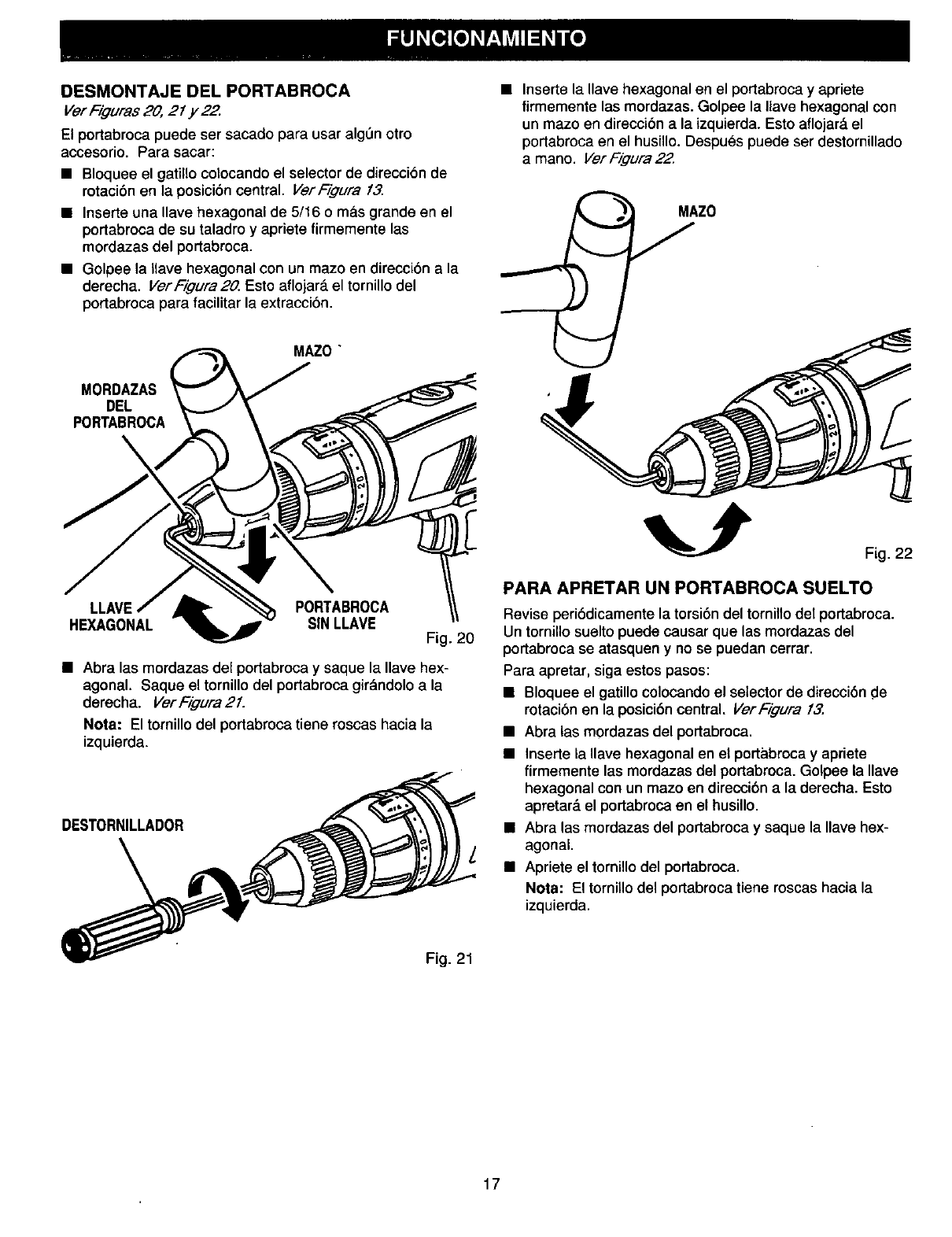
DESMONTAJE DEL PORTABROCA
Vet Figuras 20, 21 y22.
El portabroca puede ser sacado para usar alg0n otro
accesorio. Para sacar:
• Bloquee el gatillo colocando el selector de direccion de
rotaci6n en la posici6n central. VerFigura 13.
• Inserte una Ilave hexagonal de 5/16 o m&s grande en el
portabroca de su taladro y apriete firmemente las
mordazas del portabroca.
• Golpee la Ilave hexagonal con un mazo en direcci6n a la
derecha. VerFigura20. Esto aflojar_,el tornillo del
portabroca para facilitar la extracci6n.
MAZO "
MORDAZAS
DEL
PORTABROCA
LLAVE PORTABROCA
HEXAGONAL SIN LLAVE Fig. 20
•Abra las mordazas de[ portabrocay saque la Ilave hex-
agonal. Saque el tornillo del portabroca gir&ndolo a la
derecha. VerFigura 2f.
Nota: El tornillodel portabrocatiene roscas hacia la
izquierda.
DESTORNILLADOR
Fig. 21
•Inserte la Ilave hexagonal en el portabroca yapriete
firmemente las mordazas. Golpee la Ilave hexagonal con
un mazo en direcci6n a la izquierda. Esto aflojar_, el
portabroca en el husillo. Despu_s puede ser destornillado
a mane. Yef F/gufa 22
MAZO
Fig. 22
PARA APRETAR UN PORTABROCA SUELTO
Revise peri6dicamente la torsibn del torniltodet portabroca.
Un tornillo suelto puede causar que las mordazas del
portabroca se atasquen y no se puedan cerrar.
Para apretar, siga estos pasos:
• Bloquee el gatillo colocando el selector de direcci6n de
rotacibn en la posici6n central. VerFigufa 13.
• Abra las mordazas del portabroca.
• Inserte la Ilave hexagonal en el portabroca y apriete
firmemente las mordazas del portabroca. Golpee la Ilave
hexagonal con un mazo en direccibn a la derecha. Esto
apretar_, el portabroca en el husillo.
• Abra las mordazas del portabroca y saque la Ilave hex-
agonal.
• Apriete el tornillo del portabroca.
Nota: El tornillo del portabroca tiene roscas hacia la
izquierda.
17
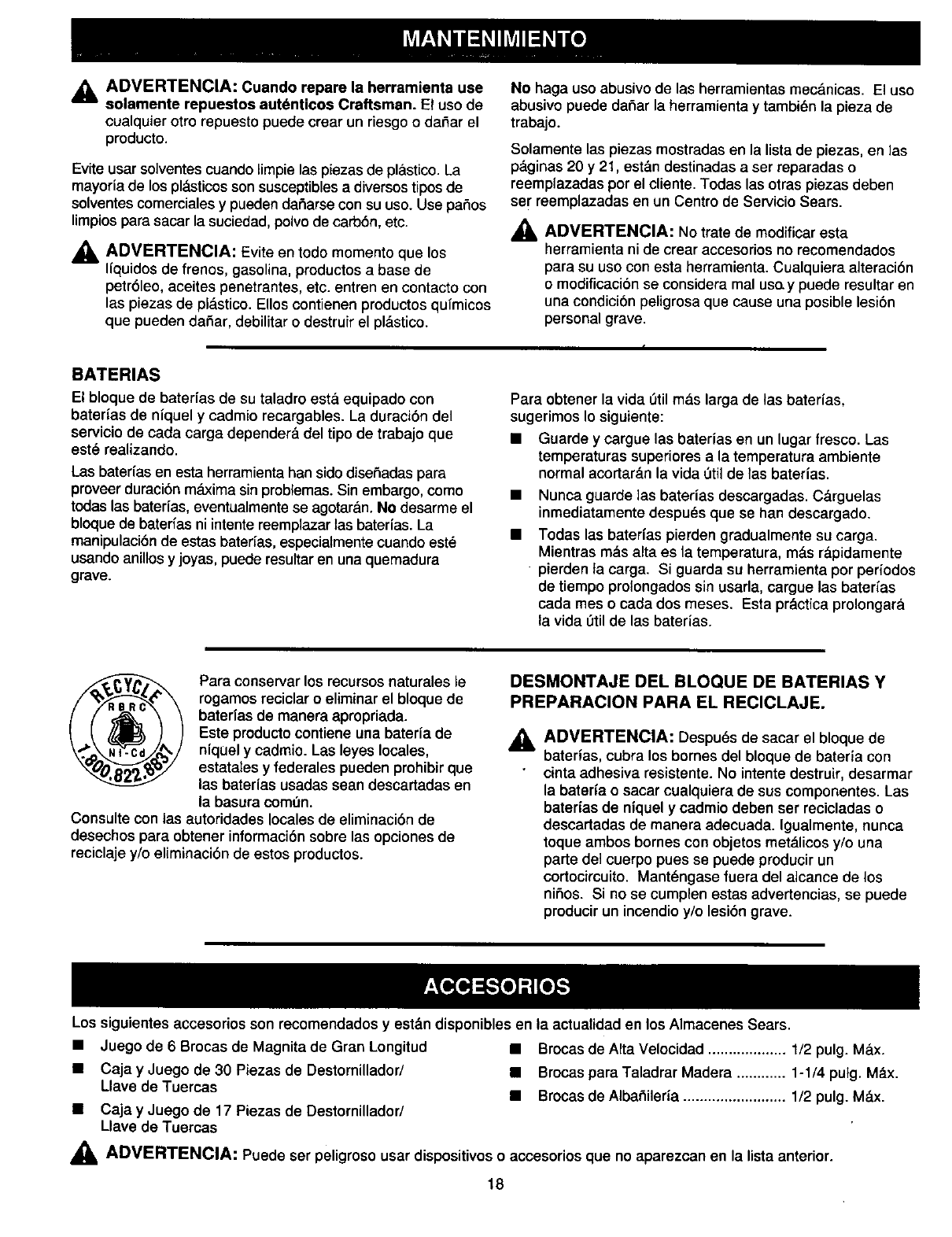
_1, ADVERTENCIA: Cuando repare la herramienta use
solemente repuestos aut_nticoe Craftsman. El uso de
cualquier otro repuesto puede crear un riesgo o dafiar el
producto.
Evite usar solventes cuando limpielas piezas de plastico. La
mayoria de los pl&sticos son susceptibles a diversos tipos de
solventescomerciales y pueden dafiarse con su uso. Use patios
limpios para sacar la suciedad, polvo de carb6n, etc.
AADVERTENCIA: Evite en todo momento que los
liquidos de frenos, gasolina, productos a base de
petr61eo,aceites penetrantes, etc. entren en contacto con
las piezas de pl_.stico. EIIos contienen productos qurmicos
que pueden dafiar, debilitar o destruir el pl_.stico.
No haga uso abusivode las herramientas mec&nicas. El uso
abusivo puede dafiar la herramienta y tambi_n la pieza de
trabajo.
Solamente las piezas mostradas en la lista de piezas, en las
p_.ginas 20 y 21, est&n destinadas a ser reparadas o
reemplazadas por el cliente. Todas las otras piezas deben
ser reemplazadas en un Centro de Servicio Sears.
_1, ADVERTENCIA: No trate de modificar esta
herramienta ni de crear accesorios no recomendados
para su uso con esta herramienta. Cualquiera alteracibn
o modificacibn se considera mal us(_y puede resultar en
una condicibn peligrosa que cause una posible lesibn
personal grave.
BATERIAS
El bloque de baterias de su taladro est& equipado con
bater{as de niquel y cadmio recargables. La duraci6n del
servicio de carla carga depender_l del tipo de trabajo que
este realizando.
Las bater{as en esta herramienta hansidodisefiadas para
proveer duraci6n m_lxima sin problemas. Sin embargo, como
todas las baterias, eventualmente se agotardn. No desarme el
bloque de bater{as ni intente reemplazar las baterias. La
manipulaci6n de estas bateffas, especiatmente cuando este
usando anillos y joyas, puede resultar en una quemadura
grave.
Para obtener la vida 0til mas larga de las baterias,
sugerimos Io siguiente:
• Guarde y cargue las baterias en un lugar fresco. Las
temperaturas superiores a la temperatura ambiente
normal acortar_.n la vida _til de las baterias.
Nunca guarde las baterias descargadas. C_.rguelas
inmediatamente despu_s que se han descargado.
Todas las bateHas pierden gradualmente su carga.
Mientras m&s alta es la temperatura, m&s r_.pidamente
pierden ta carga. Si guarda su herramienta por per{odos
de tiempo protongados sin usarla, cargue las baterias
cade rues o cada dos meses. Esta pr_ictica prolongara
la vida Otil de las baterias.
Para conservar los recursos naturales le
regamos reciclar o eliminar el bloque de
bater{as de manera aprepriada.
Este preducto contiene una bateria de
n{quel y cadmie. Las leyes locales,
estatales y federales pueden prohibir que
las bater{as usadas sean descartadas en
Ja basura comt_n.
Consulte con las autoridades locales de eliminaci6n de
desechos para obtener informaci6n sobre las opciones de
reciclaje y/o eliminaci6n de estos productos.
DESMONTAJE DEL BLOQUE DE BATERIAS Y
PREPARACION PARA EL RECICLAJE.
AADVERTENCIA: Despu6s de sacar el bloque de
baterias, cubra los bornes del bloque de bateria con
cinta adhesiva resistente. No intente destruir,desarmar
la bateria osacar cualquiera de sus componentes. Las
baterias de niquel y cadmio deben ser reeicladaso
descartadas de manera adecuada. Igualmente, nunca
toque ambos bornescon objetos met_.licosy/o una
parte de] cuerpopues se puede producirun
cortocircuito. Mant(}ngasefuera del alcance de los
nifios. Si no se cumplenestas advertencias, se puede
producirun incendioy/o lesibngrave.
Los siguientes accesorios son recomendados y est_in disponibles en la actualidad en los Almacenes Sears.
• Juego de 6 Brocas de Magnita de Gran Longitud • Brocas de Alta Velocidad ................... 1/2 pulg. M&x.
• Caja y Juego de 30 Piezas de Destornillador/ • Brocas para Taladrar Madera ............ 1-1/4 pulg. M_x.
Llave de Tuercas • Brocas de Albafiileria ......................... 1/2 pulg. M&x.
• Caja y Juego de 17 Piezas de Destornillador/
Llave de Tuercas
_1, ADVERTENCIA: Puede ser peligroso usar dispositivos oaccesorios que no aparezcan en la lista anterior.
18

19
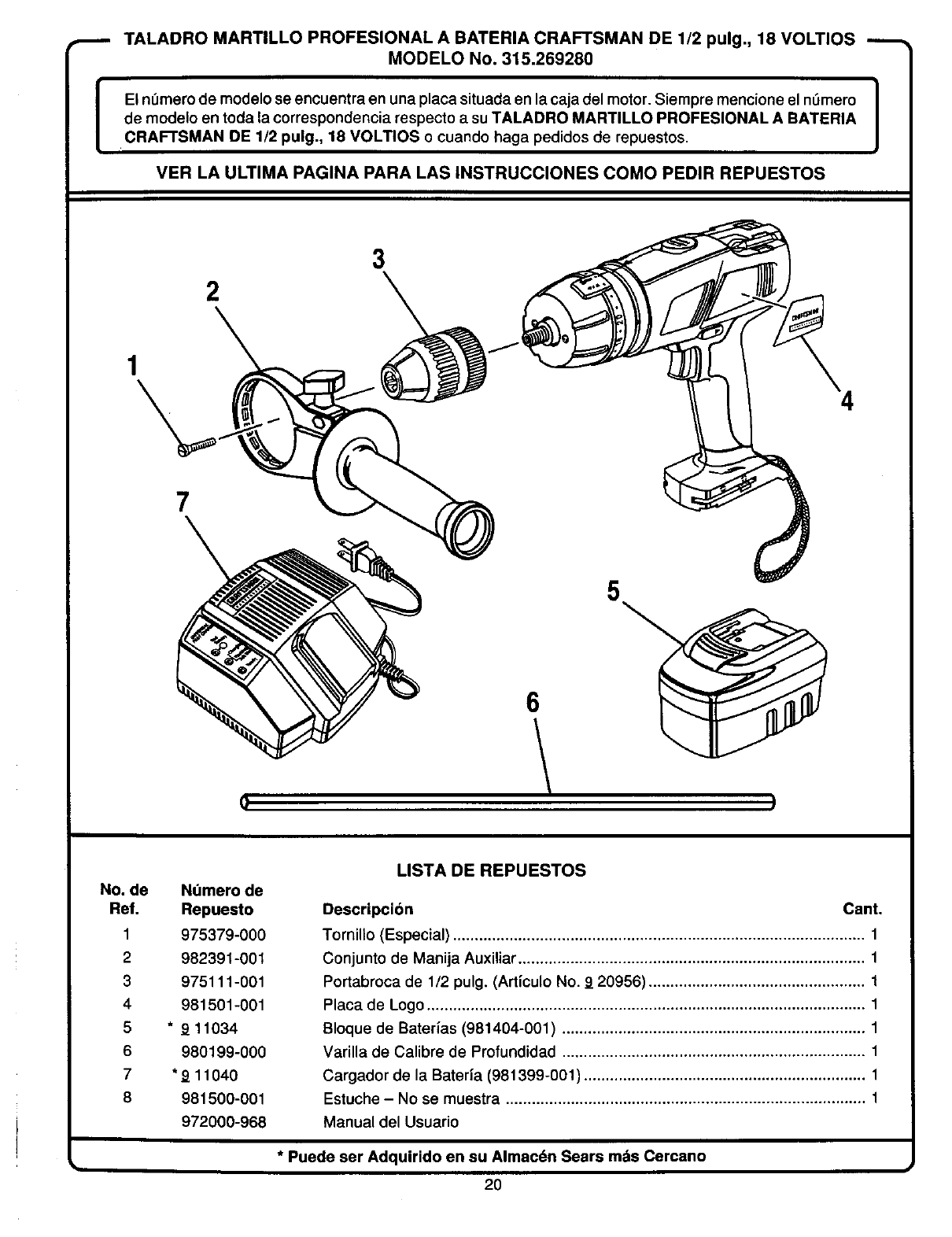
TALADRO MARTILLO PROFESIONAL A BATERIA CRAFTSMAN DE 1/2 pulg., 18 VOLTIOS
MODELO No. 315.269280
IEl nt3merode modelo se encuentra en una placa situada en la caja del motor. Siempre mencione el m_mero
de modelo en toda la correspondencia respecto a su TALADRO MARTILLO PROFESIONAL A BATERIA
CRAFTSMAN DE 1/2 pulg., 18 VOLTIOS o cuando haga pedidos de repuestos.
VER LA ULTIMA PAGINA PARA LAS INSTRUCCIONES COMO PEDIR REPUESTOS I
\
7
2
3
Q
6
No. de
Ref.
1
2
3
4
5
6
7
8
Numero de
Repuesto
975379-000
982391-001
975111-001
981501-001
*911034
980199-000
*_11040
981500-001
972000-968
LISTA DE REPUESTOS
Descripcibn Cant.
Tornillo (Especial) ............................................................................................... 1
Conjunto de Manija Auxiliar ................................................................................ 1
Portabroca de 1/2 pulg. (Articulo No. 9 20956) .................................................. 1
Placa de Logo ..................................................................................................... 1
Bloque de Baterias (981404-001) ...................................................................... 1
Varilla de Calibre de Profundidad ...................................................................... 1
Cargador de la Bateria (981399-001) ................................................................. 1
Estuche - No se muestra ................................................................................... 1
Manual del Usuario
* Puede ser Adquirido en su Almac6n Sears mds Cercano
•#
2O
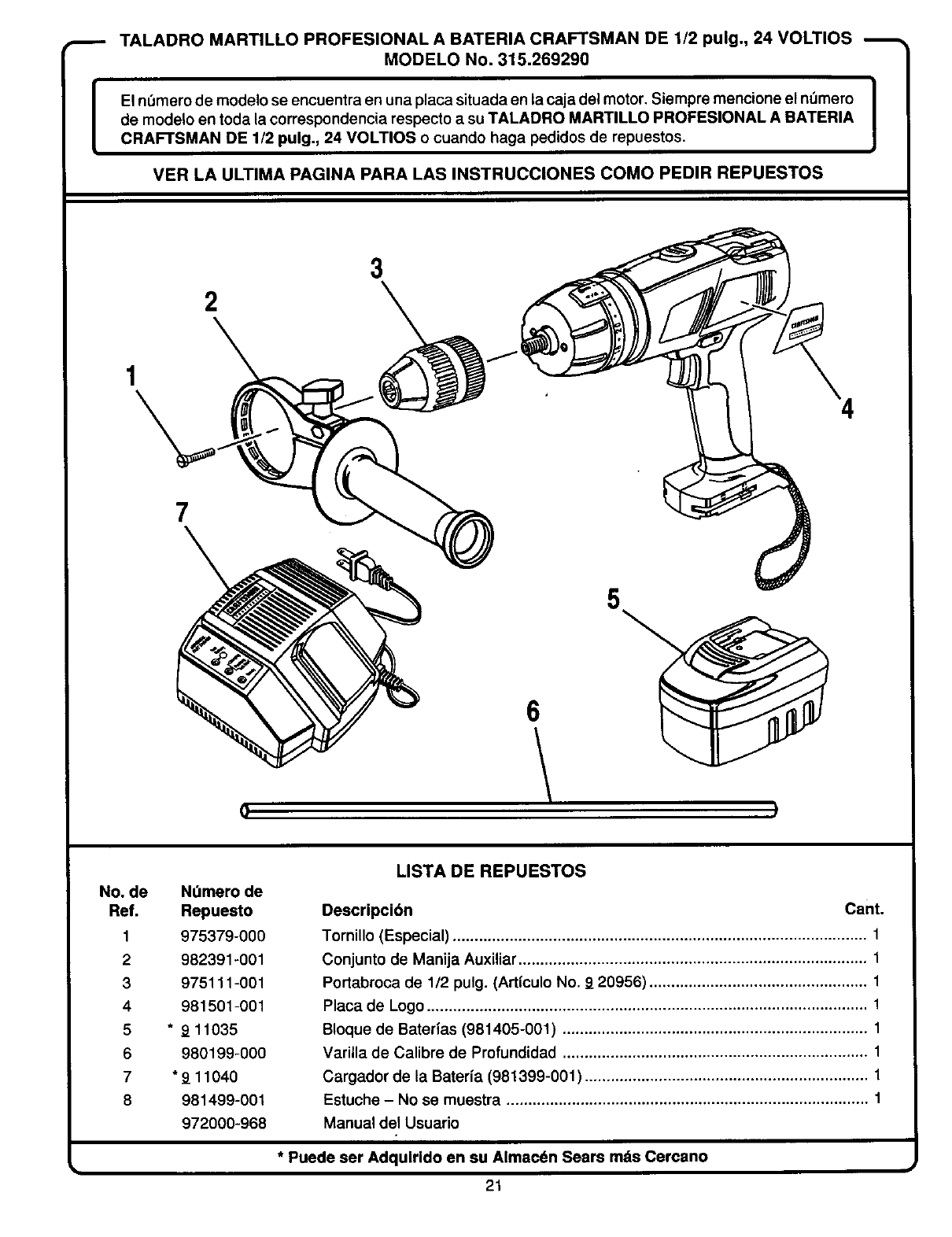
TALADRO MARTILLO PROFESIONAL A BATERIA CRAFTSMAN DE 1/2 pulg., 24 VOLTIOS _,
MODELO NO. 315.269290
IEl n_mero de modelo se encuentra en una placa situada en la caja del motor. Siempre mencione el n_mero I
I
de modelo en toda la correspondencia respecto a su TALADRO MARTILLO PROFESIONAL A BATERIA I
CRAFTSMAN DE 1/2 pulg., 24 MOLTIOS o cuando haga pedidos de repuestos.
VER LA ULTIMA PAGINA PARA LAS INSTRUCCIONES COMO PEDIR REPUESTOS
1
\
7
2
3
Q
6
No. de
Ref.
1
2
3
4
5
6
7
8
Ndmero de
Repuesto
975379-000
982391-001
975111-001
981501-001
*911035
980199-000
"911040
981499-001
972000-968
LISTA DE REPUESTOS
Deecripci6n Cant.
Tornillo (Especial) ............................................................................................... 1
Conjunto de Manija Auxiliar ................................................................................ 1
Portabroca de 1/2 pulg. (Art{culo No. 9 20956) .................................................. 1
Placa de Logo ..................................................................................................... 1
Bloque de Baterias (981405-001) ...................................................................... 1
Varilla de Calibre de Profundidad ...................................................................... 1
Cargador de la Baterfa (981399-001) ................................................................. 1
Estuche - No se muestra ................................................................................... 1
Manual del Usuario
* Puede ser Adqulrldo en su Almac6n Sears mds Cercano
21
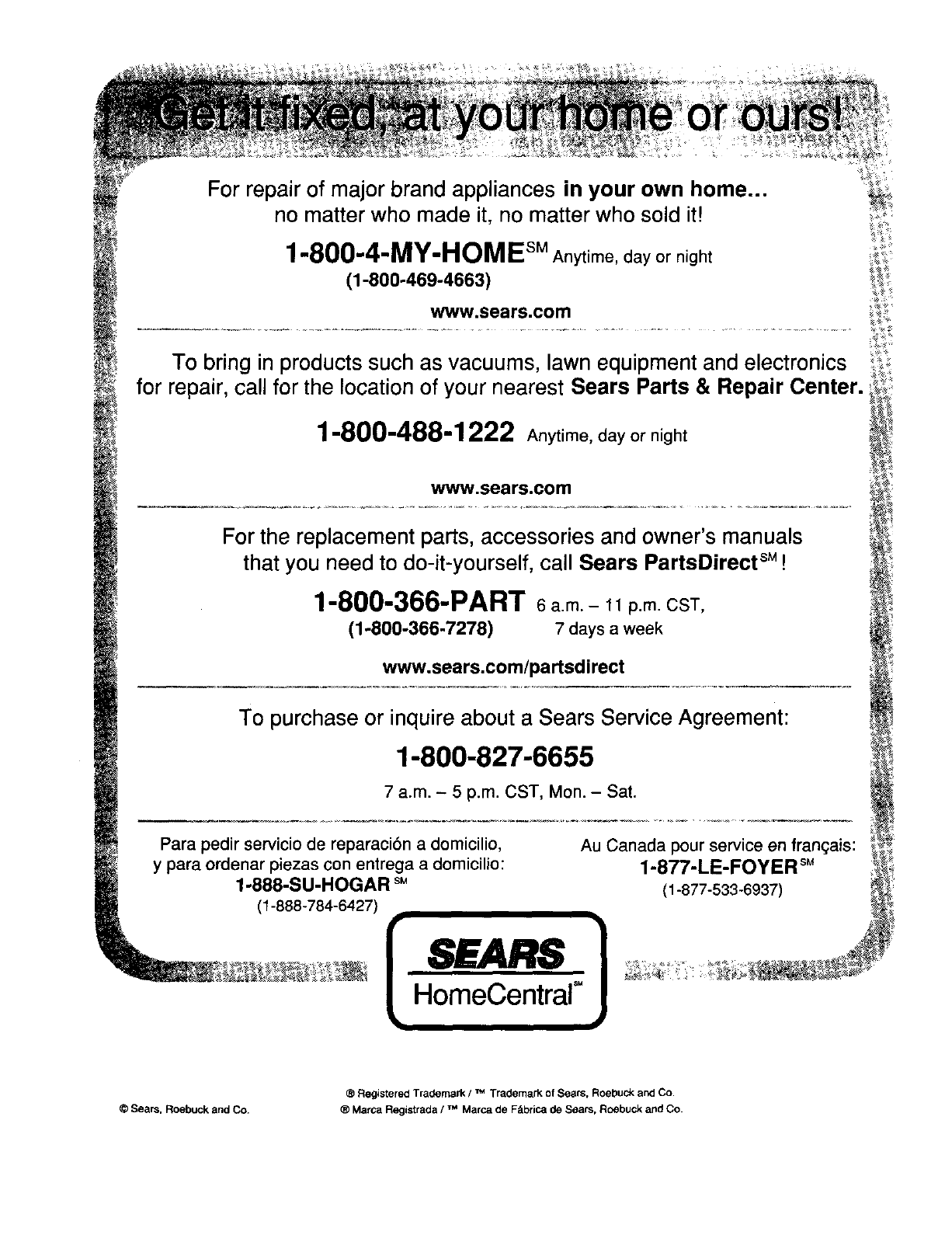
For repair of major brand appliances in your own home...
no matter who made it, no matter who sold it!
1-800-4-MY-HOME sMAnytime, day or night _,
(1-800-469-4663) _
www.sears.com
..................................................................................................................... /%
To bring in products such as vacuums, lawn equipment and electronics i_i
for repair, call for the location of your nearest Sears Parts & Repair Center. _i'i':
1-800-488-1222 Anytime, day or night _•
www.sears.com _
For the replacement parts, accessories and owner's manuals
that you _eed to do-it-yourself, call Sears PartsDirect SM!
1 80.0-366-PART6a.m.- p.m.CST,
(1 800 366-7278) 7 days a week
_m_tLsears.com/partsdirect
To purchase or inquire about a Sears Service Agreement:
1-800-827-6655
7a.m.- 5 p.m. CST, Mon.- Sat. _ f
Para pedir servicio de reparaciSn a domicilio, Au Canada pour service en fran_:ais:
I SEARS 1
HomeCentrar"
y para ordenar piezas con entrega a domicilio:
1-888-SU-HOGAR sM
(1-888-784-6427)
1"877"LE-FOYER _"
(1-877-533-6937)
®Registered Trademark /_Trademark of Sears, RoebuCk and Co.
©Sears, Roebuck and Co. ® Marca Registrada /TM Marca de F_brica de Sears, RoebuCk and Co.